



TheseCorporatePartnershavebeenloyalinhelpingus preserve,promote,andprotectthepassionforbowhunting!






D I A M O N D DIAMOND



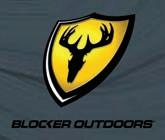




















G O L D GOLD















P L A T I N U M PLATINUM S I L V E R


























































SILVER S I L V E R
Formoreinformationonhowyoucanbecomeacorporatepartner,pleasereachouttoDylanRay. Dylan@pope-young.org


HUGESAVINGS MEMBERONLYDISCOUNTS HUGESAVINGS MEMBERONLYDISCOUNTS

Thesecompanies,understandthatPope&Young,andourmembers,are onthefrontlines,workinghardtodefendbowhuntingrights. THISISTHEIRWAYOFSAYINGTHANKYOU!
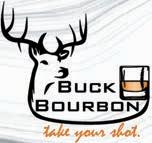
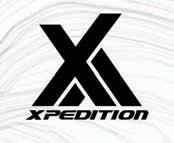

35%OFFALLORDERS
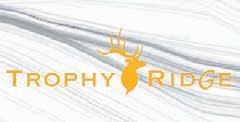
20%OFFENTIREORDER
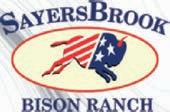
20%OFFALLORDERS

20%OFFENTIREORDER

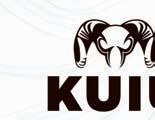







15%OFFATP&YCONVENTION



15%OFFALLORDERS$75MAILINREBATE20%OFFENTIREORDER$10OFFENTIREORDER


20%OFFALLTRADITIONAL

10%OFFALLORDERS10%OFFONETIMEORDER
TOTAKEADVANTAGEOFTHESEDISCOUNTSANDSHOWSUPPORTOFTHOSE WHOSUPPORTYOUASABOWHUNTER,VISITWWW.POPE-YOUNG.ORG, LOGINASAMEMBER,CLICK“MEMBERRESOURCES,”ANDTHEN “POPE&YOUNGMEMBERONLYDISCOUNTS.”



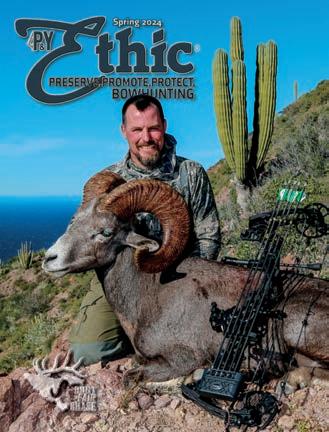
Front Cover: Rick Popovitch•Species: Desert Bighorn
Sheep•Score: 152 0/8•Location: Carmen Island, Mexico
Date: 01/11/2020
Back Cover: Ernie Santana•Species: Desert Bighorn
Sheep•Score: 145 3/8•Location: Carmen Island, Mexico
Date: 03/05/2021
Jay Culpeper•Species: Non-Typical Whitetail Deer
Score:
Date: 10/28/2020
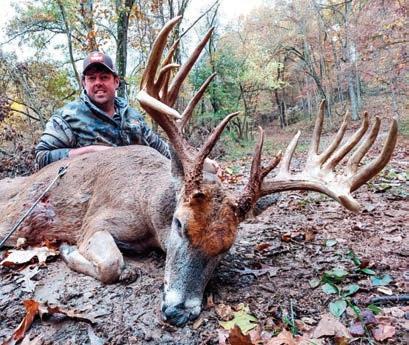

• Executive Director
• President’s Column
• 2nd Vice President’s Column
• Director’s Stand
• Conservation Chair
• Conservation Matters
• Big Game Records
• Sheep: Measuring and Scoring Horns
from our P&Y, B&C, Joint Measurer’s Manual
•
•

2024 Spring The Official Journal of Pope and Young
Reprinted
Desert
• Big Game Species Profile:
Bighorn Sheep
Sheep
Real World Record Desert Bighorn
Double
By Frank Noska
Noska’s Notes:
Bull Deserts
Period Entries
• Recent 34th Recording
Over
By Chuck Adams
• Super Slam: Thoughts on Hunting
Bait
Giant By Tom Miranda
• Adventure Bowhunter: Sonoran
Remembering Dennis
Youth Membership: Giving Back to a Sport We Love By Stan & Carolyn Godfrey
The Adventurous BowWoman: On the Edge of the Circle? By Anna Whitehead 6 8 10 12 14 18 24 28 34 46 48 54 62 66 72 74 80 84 92 Up Front Conservation Big Game Features Membership Youth Adventurous BowWoman 4 Spring 2024 Volume 51 Number 1
• Membership Column • Membership Listing •
(Denny) Roy Ballard •
•
Location:
216 4/8•
Pike County, Illinois
Inside the Issue
Join us on Social Media

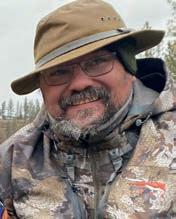
TExecutive Director
By Justin Spring
he last few months at Pope and Young have been hectic but exciting. We had a great response to our request for year-end donations. A marketing push of the new Records Book exceeded Dylan’s and my target numbers, and we are in the middle of show season as I write this in the airport en route to the 2024 Sheep Show.
Coming out of ATA this year, I realized that for this column, I should highlight the need to mentor hunters to ensure our sport continues. While youth hunters being introduced to archery for the first time is what folks generally think of, once they are in, I would argue that our duty to mentor only increases as they walk along their archery journey. The Pope and Young Club is ramping up its efforts to welcome the new hunter to our ranks over the coming months, but our mentorship efforts shouldn’t end there.
This topic started rolling around in my mind after being on a podcast discussing Fair Chase rules for Pope and Young entry,
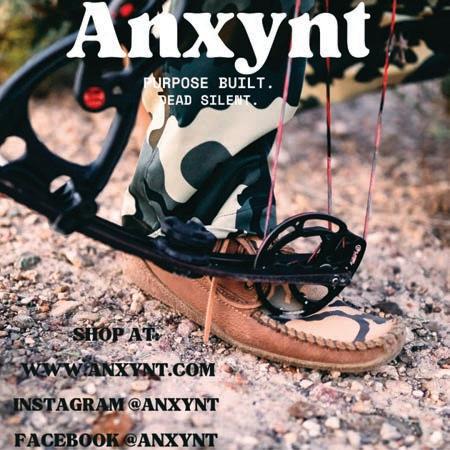

as well as Fair Chase in general. During our conversation, it came up that many newer archery hunters, when relaying their previous season or hunt, will occasionally say I got an arrow in one and didn’t recover him. Inevitably, all archers will, at some point, find themselves on the trail of an animal, for the shot was not as perfect as the hunter intended. This is where I believe a mentor could help the newer hunters see how their actions can significantly affect the public’s view of archery hunting. Instead of telling the story and almost highlighting a poor hit as near success, this is the time for reflection. A statement to a non-hunter such as, “I pushed a shot window, and my arrow deflected,” or “My nerves got the best of me, and I took a shot beyond what I was ready for,” to a non-hunter shows remorse for a mistake. It highlights respect for the animal and not just a haphazard attempt, which fell short and may, in fact, turn the non-hunter off from supporting those who do hunt. I’d suggest the mentee shouldn’t be judged or ridiculed for making a mistake but instead coached on why this action was a misstep, as no shot should ever be taken unless one is sure of the outcome and uses it as a learning experience. Also, talk through how a non-hunter may perceive this statement and
discuss how the actions or statements of a single hunter can reflect on all of us.
A similar discussion came up on another archery podcast. A hunter had made a shot at 100 yards plus and wanted to talk about it. The host contacted me regarding the Fair Chase aspect of talking about the shot. While many bowhunters are proficient at 100+ yards on the practice range, it is a very risky shot in a big game hunting situation. The main uncontrolled variables are the speed of sound vs the speed of the arrow, wind conditions between the bowhunter and the animal, and the possibility of the animal moving during the arrow’s flight. In addition, a poor release or an arrow deflection off unseen objects are also potential issues. Although tempting, it’s best to use your hunting skills to get closer, even if it means not getting a shot; we owe it to the animal to take high-percentage shots.
As hunters discussing Fair Chase and Ethics, we tend to condemn actions and judge those whose moral compass may not adjust for declination like ours. This, again, is where I would argue mentorship is most needed. The hunter may see this successful shot as a badge of honor, and indeed, it is an impressive feat, though perhaps a discussion of all the factors that had to come together for it to end in a short blood trail hadn’t been fully considered.
It can be helpful to have a mentor guide the conversation regarding hunting. A shot that was successful in the past may not be the best choice under similar conditions in the future. Although hunters may not admit the element of luck at the time, they may think a little longer the next time they are presented with that shot. They may recall a slight breeze on the walk-in that could come into play. This can lead to a decision to pass on a shot at
2024 Spring
6
that distance and avoid the risk of losing an arrow or following a less-than-ideal trail.
Archery hunting is a lifelong passion and a guiding force on that journey, which makes it all the more rewarding and enjoyable. Even an archer who has a firm grasp of ethical shots and even how to discuss archery hunting with a non-hunter to ensure its acceptance and ultimate license to continue has more to learn.
As you read this, think about your hunting partners, acquittances, or perhaps the neighbor kid whom you spied shooting arrows at a deer target in the backyard. They all would benefit from a discussion of some sort. Remember, a good mentor isn’t purely instructing but instead leading the conversation for the mentee to make their own ethical choices. As a side benefit, this may lead you to a revelation in your own hunting journey. Something along the lines of this sport has given me so much; what can I do to ensure its future? You may be at the age where climbing mountains or crawling through prickly pear is no longer in the cards, but perhaps You can share the

The Pope and Young Ethic, Volume 51, No. 1, Spring 2024, ISSN#23815655 is published quarterly by Pope and Young, 223 South Main St. Chatfield, Minnesota 55923. Each annual Membership dues includes $23.80 subscription fee for The P&Y Ethic, Journal of Pope and Young. USPS #16690 in Chatfield, MN 55923. Periodical Postage paid at Chatfield, MN 55923 and additional mailing offices. POSTMASTER: Please send address changes to The P&Y Ethic, Pope and Young, PO Box 548, Chatfield, MN 55923.
Pope & Young Club
223 South Main Street, PO Box 548, Chatfield, MN 55923
Phone: 507-867-4144•Fax: 507-867-4144
Email: admin@pope-young.org
Website: www.pope-young.org

The Pope and Young Ethic is the official publication of the Pope & Young Club, Inc. It is published four times each year and distributed to its membership, friends, and other supporters.
importance of conservation or the improvements in the game You have seen in your lifetime through the support of hunters.
Maybe it’s time to take a leading role for the archery hunting club that has led you along the way and introduced you to your mentors. We all have tools at our disposal, and at some point, we all need to realize it may be time to give more than we take from bow hunting. Perhaps you can be the mentor to help some fellow bow hunters realize this or guide those who may be struggling to see the tools they possess as a valuable addition to the club and encourage them to increase their participation.
As a closing thought, watch some archery YouTube channels. Do you want to have a fire lit under you to step up? Realize these are the most influential mentors today, and while there are some excellent role models, a guiding voice in separating the good from the bad is something we all can do.
For the future of wildlife, wild places, and archery’s place amongst them.
Justin E. Spring
Members are invited to submit comments, questions, photos, artwork, and short articles. All contributions must be accompanied by a self-addressed, stamped envelope if they are to be returned. However the Pope & Young Club does not assume responsibility for the safe return of any unsolicited materials. Items submitted for publication should be sent to the Ethic Editor, steve@pope-young.org, Pope & Young Club, P.O. Box 548, Chatfield, MN 55923, or admin@pope-young.org. Any questions can be directed to Steve Ashley, P&Y Ethic Editor, steve@pope-young.org, or write in care of the Pope & Young office. The opinions and views contained herein are those of the authors and are not necessarily those of the Pope & Young Club.
Advertising is accepted at the discretion of the Pope & Young Club. For information contact Dylan Ray, dylan@pope-young.org. The editorial team reserves the right to reject or edit any material which may be deemed detrimental to bowhunting or the Pope & Young Club. The Board of Directors shall make the final determination on questionable materials.
Material in this publication may not be reproduced in any form without permission of Pope and Young. All requests for such use should be directed to the Ethic Editor at the above address or 507-867-4144.
Submission Deadlines are as follows January 15 for Spring
Issue
•April 15 for Summer Issue
•July 15 for Fall Issue
•October 15 for Winter Issue
•© Copyright 2024, Pope & Young Club, Inc.
Pope & Young Club
Founded 1961
Board of Directors
President • Kurt Ebers
227 Stone Ridge Drive, Hannibal, MO 63401 573-719-8933•kcebers@gmail.com
First Vice President • Dallas Smith PO Box 460806, Leeds, UT 84746-0806 435-680-2870•dallas4263@hotmail.com
Second Vice President • Scott Bakken 4727 Arbor Crossing SE, Apt 219, Alexandria, MN 56308 715-213-8854•scott@dialedarchery.com
Treasurer • Phil Dalrymple
4542 E. Camp Lowell Dr. Suite 100, Tucson, AZ 85712 520-400-6035•pdalrymple@randacpas.com
Past President Director • Jim Willems 5750 Rail Rd., Farmington, NM 87402 505-330-8211•jimwillems@q.com
Directors
Merritt Compton 469 Aiken Road, Trumansburg, NY 14886 607-387-5112•mcc11@cornell.edu
John “Jack” Culpepper
1700 George Bush Dr., E #240 College Station, TX 77840 979-696-1444 jack@culpepperrealty.com
John Gardner
14837 HWY 172, Durango, CO 81303 970-749 2013 wildlifex@protonmail.com
Ken Rimer 512 171st Street, Hammond, WI 54015 715-410-3195•camoose195.28@gmail.com
Records Chair • Roy Grace
P.O. Box 948, Lakeside, AZ 85929 760-851-4434•roy@pope-young.org
Membership Chair • Stephen LePage 2574 Divide Rd., Lewistown, MT, 59457 406-535-5636•stephenandamylepage@yahoo.com
Conservation Chair • Doug Clayton 18016 Colt Rd, Council Bluffs, IA 51502 402-305-1941•dclay33@cox.net
Youth Coordinator • Ricky Krueger 2498 Highland Rd 2, Fremont, NE 68025 402-720-4520•antlers22@hotmail.com
Trust Officer • John Gardner 4837 HWY 172, Durango, CO 81303 970 749 2013•wildlifex@protonmail.com
Board Secretary • Michael A. Oropallo 4578 West Lake Rd., Auburn, NY 13021 moropallo@barclaydamon.com
P&Y Staff
Executive Director • Justin Spring
Director of Records • Tim Rozewski
Administrative Support / Membership Manager • Shelby Klennert
Events Manager • Heather Knight
Marketing Manager Dylan Ray
Administrative Manager • Open
Records Coordinator • Clinton “Blake” McPhaul
Museum Curator • Larry Streiff
Associate Editors Steve Ashley & Mike Schlegel
Art Director • Wild Snow Design, LLC / Tara Bondar

••••••••••••••••••• •••••••••••••••••••••• Spring 2024 7
••••••••••••••••••
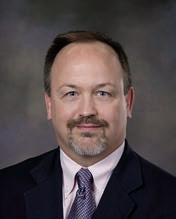
IPresident’s Column
By Kurt Ebers
’m writing this column based on preelection results, hoping I’ll be fortunate to be the P&Y’s President for two more years. If elected, I know for certain this will be my last term as six years is long enough, and leadership change is good. I feel like a re-elected U.S. President in their last term and now have a two-year window to accomplish goals before I leave office.
I want you to know how hard your current board works. The current 13-member board responsibilities include meeting monthly for 2-3 hours in order to keep the P&Y moving forward, emails, phone calls, and committee meetings, to name a few. Numerous hours a month are devoted to the P&Y, which could have been used for other purposes. I wish to take this opportunity to personally thank
each one of them for this service. You will never find a better group of respectful, reliable, and knowledgeable individuals to work with. I sincerely look forward to the next two years and what this board can accomplish.
For those interested in serving on the P&Y board, stop thinking about it and do it. The list of candidates for the current election was light, with many positions only having one candidate. I can’t tell if the membership has confidence in the current board and is okay with the direction they are taking the P&Y or if individuals are just not interested. Regardless, new blood is good for a board, and I highly encourage anyone interested to run. My plea to those interested in the board or being more involved in the P&Y
FRED BEAR STATUE DONATE NOW
$150: 4x8 Brick with 3 Lines
$300: 8x8 Brick with 4 Lines
$1,000: Name on Bronze Plaque on Statue Base
Deadline for donations to recieve a brick is April 1st DONATE NOW: FREDBEARDAY.ORG
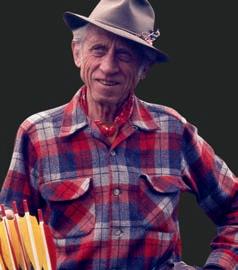

is to contact me or any board member and let us know your interests, skill set, business experience, etc. Based on this information, we can explore opportunities within our various committees to get you involved over the next two years before the next election.
By the Summer edition of the Ethic, the new board will have met and plans finalized around the two-year strategic plan for my last term. I look forward to sharing this entire plan with you as it will show the direction your board is taking the P&Y. In closing, do not hesitate to contact me or any board member regarding P&Y business, as this is your organization, and feedback allows us to ensure we are meeting member expectations.
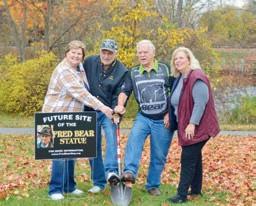
Pope & Young will match your donation dollar for dollar. Scan QR code, donate now, receive your brick, and your donation will be matched.




2024 Spring
8


A2 nd Vice President Column
By Scott Bakken
s I sit and write this column, it is currently 30 below zero here in Minnesota. The cold temps and shorter days are the official kickoffs to the “OffSeason.” The Off-Season is the time of year when, despite our minds telling us we’re not ready to call it a season, our bodies and state hunting season regulations tell us otherwise. It’s time to clean all the gear and put it away until next season. So, the question arises: how will you spend your time in the Off-Season?
The Off-Season is a great time to reflect on the previous year and start planning for the next. Whether that’s reviewing old trail camera photos, sorting through our mental notes of what we should have done rather than what was actually executed, staring at satellite images and planning new food plot ideas or new treestand locations based on previous intel, it all comes full circle this time of year. It gives us the chance to pause, plan, and reflect. However, one of my favorite things to do this time of year is to reach out to friends and get an idea of what they are thinking regarding hunts for the year ahead. Often, these conversations will lead to planning an unexpected hunting trip with friends or the opportunity to find a new group of colleagues to share an adventure with. Regardless, the Off-season is a great time to get a jump start on prepping.
Outside of planning and reflecting on old and new hunts, the Off season means ramping up my workouts and working on weak areas that need improvement. Building a foundation in physical and mental health and fitness this time of year sets you up for success throughout the year. When it comes to reflecting on the gear side of things, I plan to spend much time sorting through my gear, getting rid of

gear that didn’t hold up or didn’t work out, and replacing it. I tend to utilize my network of friends and colleagues in the industry to find out what gear may have impressed them or gear that they suggest staying away from. After last season, I plan on dedicating much time to freshening up on my knot-tying this offseason. I have found much value over the years in understanding and knowing how to build a multitude of knots in the woods. I’m also long overdue to do a run-through and freshen up my in-thefield First Aid Kit. In addition, western application season has started and will continue to be top of mind through the winter, spring, summer, and leading into the next fall season. During The OffSeason, you have a great opportunity to research and try out new gear, as well as E-Scout and look at new areas. There’s a lot to figure out in a short amount of time, and you can never be too prepared for some of the intricacies that come with Western hunting application season. Lastly, archery is a large part of my life, and I ask if this will be the winter I get back into and join an indoor archery league to keep in shape and ensure my bow knows that I haven’t forgotten about it. Building myself into a yearlong shooter will only benefit me come the fall season. I suggest looking into what indoor shooting exists in your area and building a routine of shooting at least once or twice a week. I also spend a lot of time blank-bale shooting in the garage to build the muscle memory necessary to maintain my shot process through this downtime.
The Off-Season is ideal timing to look at and see if there are any events or shows I would be interested in attending, such as one of the many Pope and Young regional events like the
Bowhunters Bash held in Texas back in December. Maybe it’s time to start planning a trip to one of the many 3D events that are held nationwide, like the Total Archery Challenge or Mountain Archery Festival. These events not only present an opportunity to get out, put some miles on, and test your longdistance skills but are also a great place to meet people and interact with other bowhunters. Whether it is trade shows or events, these are great places to meet like-minded people and a phenomenal resource to tap into to gain knowledge. These events are an excellent opportunity to meet new people and introduce new people to a group who are wired the same and understand what makes us tick as bowhunters.
The Off-Season is also a perfect time to get involved with organizations like Pope and Young and introduce new people to similar organizations. If it weren’t for groups like Pope and Young, all the Off-Season efforts would be a complete waste of time and unnecessary. We are at a crossroads in our passion for hunting, and it takes all of us as like-minded individuals to continue pushing our hunting heritage forward. Pope and Young and other like-minded organizations are the ones that are battling for our rights as hunters. We are seeing issues become more and more “us versus them,” the anti’s, and those who want to get rid of hunting. It will take all of us to continue showing the value in the hunt, and there is no better time to get involved in conservation efforts than in the Off-Season.
Enjoy the Off-Season. Lift heavy, eat healthily, conduct gear checks, and get involved. I look forward to meeting, hearing from, and fighting with all of you as we turn our focus to the future of hunting.
2024 Spring
10
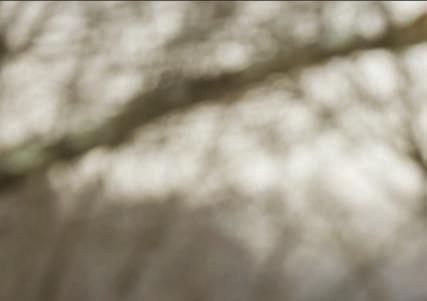
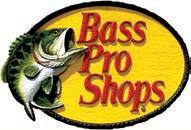
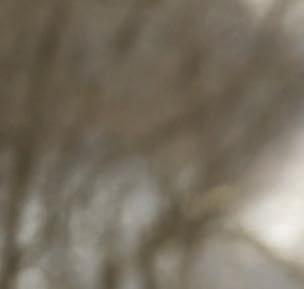
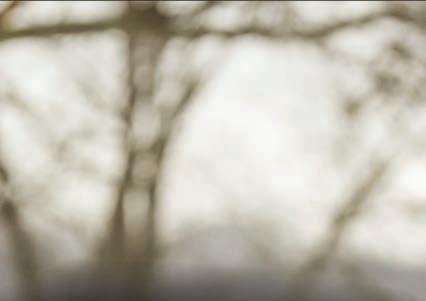



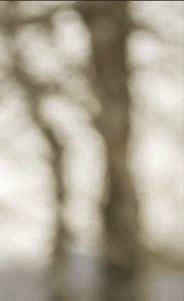
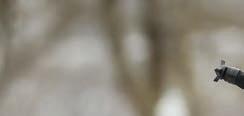


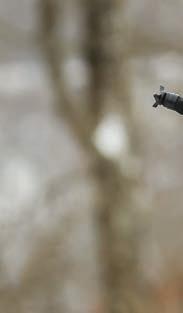







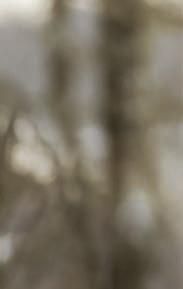

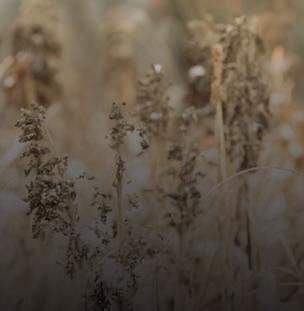



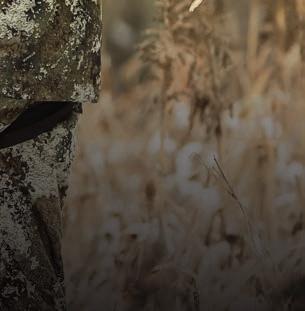







PROUD PARTNER OF Bass Pro Shops® and Cabela’s® is proud to stand together with the sportsmen and women we serve in support of Pope and Young. Our combined commitment to preserve, promote, and protect our bowhunting heritage is vital to future of our sport. Learn more at basspro.com/conservation precision archery gear SHOP BLACKOUT GEAR basspro.com @ BP231278520

Director’s Stand
By John C. Culpepper
Regional Events “Bowhunter Bash”
I hope you all had a memorable hunting season last year and are preparing for this New Year, 2024. The Kansas hitetail tag did not taste too good, but my Texas tag was put to good use on my first buck with a recurve at homew. We can do so many things to improve our chances for
2024, and the sooner we start, the better our odds are for success.
Pope and Young has begun a regional event rollout of sorts called Bowhunter’s Bash. We have held three events so far, two in Utah and one here in my hometown of Bryan/College Station, Texas. We are planning more
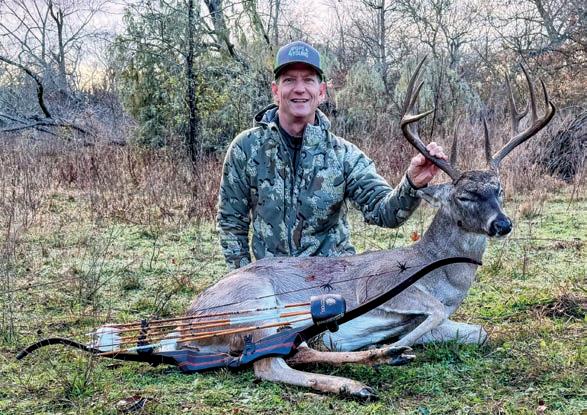
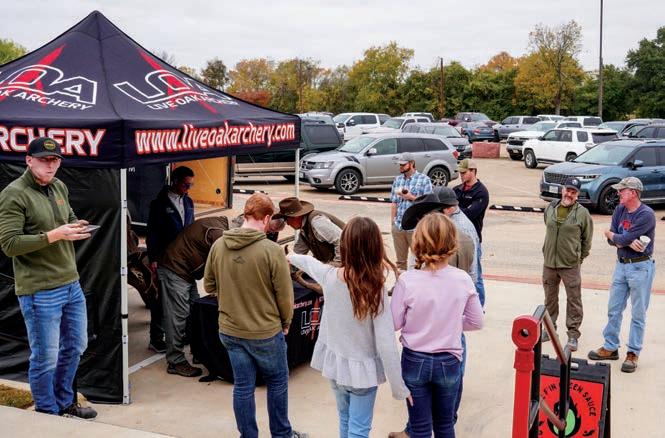
locations, so be on the lookout to attend one in your area. Think of our biannual convention on a much smaller scale and timeline. We are pairing our events with a joint measuring class with B&C at each location. Please consider becoming a measurer and attending a class. The more measures the larger our impact will be as a group and the more you will get out of being a member.
The Texas Bowhunters Bash was held in Bryan/College Station, Texas on December 2, 2023. As a director and resident, this was an opportunity for me to step up and host the event in my hometown. We had a wonderful time, and everyone enjoyed getting together to talk bowhunting and enjoy some great Tex-Mex food. Live Oak Archery, our local bow shop was involved and hosted our group at their shop during the day before the evening banquet. We also recognized two new world records and had a solid group of measurers attend our Texas class; one of them was my son, John. It


2024 Spring
Never too old for something new. 1st recurve buck from Texas.
Live Oak Archery, our local bow shop hosted our event.
12
The Tex-Mex food was a hit!
was cool to meet so many people who came in from around the country to participate in the class and the Bash. Having so many dedicated bowhunters makes you feel good about our future as an organization. We had 15 states represented in this one measuring class. We also had a large contingent of local bowhunters and Brazos County Archery Club members show up and learn more about P&Y. I hope to establish a core group of P&Y members in my area and more measures. We can use the Bowhunters Bash for the same purpose in other areas of the country.
Remember, you are Pope and Young. The Bowhunters Bash is your event to be a part of, just as our Biannual Convention, an exciting time to get together and enjoy being a bowhunter. Track our website, www.Pope-Young.org, for the next event near you. I hope your 2024 season is a memorable one.
Sincerely,
Jack Culpepper
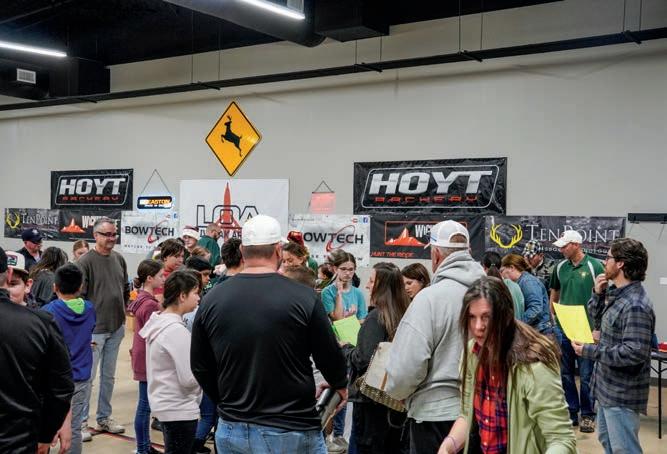
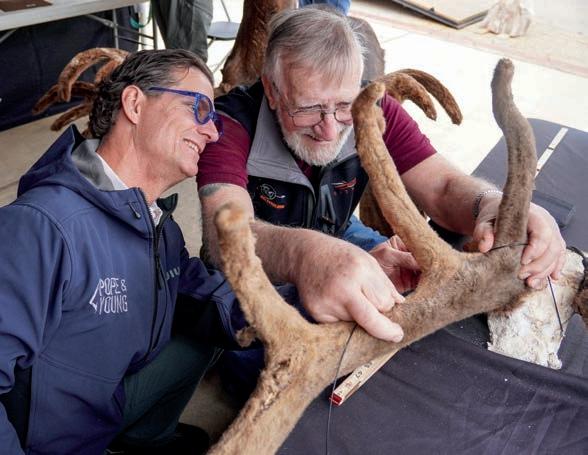
We had 15 states represented in this one measuring class.
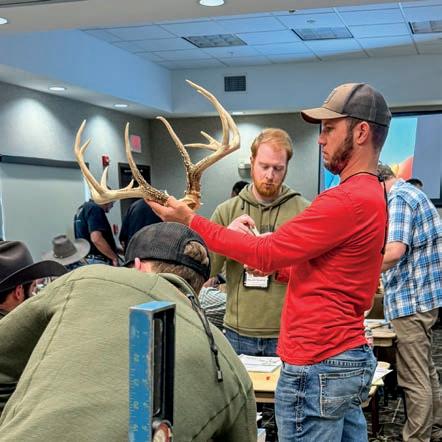
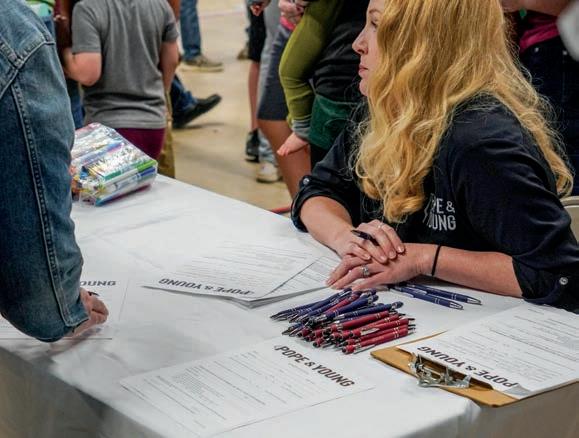

Spring 2024
13
We successfully signed many new members as well as raised the Club’s profile!
People came in from around the country.
Master measurer and instructor Larry Streiff demonstrates a finer point of measuring velvet antlers.

2Conservation Chair Column
By Doug Clayton
024 marks the 80th birthday and legacy of Smokey (the) Bear and the Wildfire Prevention Campaign, the longest-running public service announcement campaign in U.S. history. The story of how it all came to be started with World War II and an incident that probably very few Americans are aware of – an attack on lower 48 United States soil by the Japanese navy.
On February 23, 1942, 69 days after the bombing of Pearl Harbor, the BarnsdallRio Grande Oil Field north of Santa Barbara, California, came under attack by the long-range Japanese submarine. They began shelling the oil and gas tanks at
that location, which was very close to Los Padres National Forest. Before the war, the submarine captain knew this location from being a tanker captain and had visited there to obtain gasoline.
The Japanese considered wildfires as a possible weapon, so with that mindset, they sent several of these long-range submarines to roam up and down the West Coast and shelled installations not only in California but also in Washington and Oregon. They also launched aircraft to start forest fires with incendiary bombs in Oregon forests. (The pilot donated the Samurai sword carried by one of the pilots in the aircraft that flew from the submarine in Oregon to start forest fires at a historic reconciliation ceremony in Oregon and is on display at the North Lincoln County Historical Museum, Lincoln City, Oregon.)
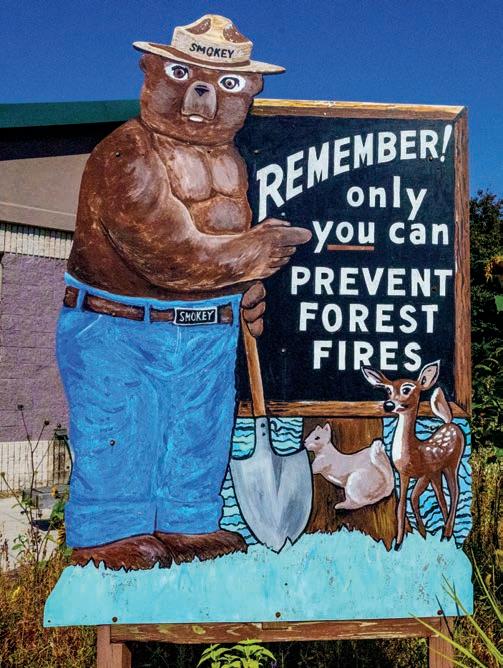

In addition to the shelling and aircraft attacks, between November 1944 and April 1945, they launched around 9,000 fire balloons into the jet stream, with an estimated 11% reaching U.S. soil. In the end, these balloon attacks caused a total of six fatalities.
Fear grew that more attacks would take place and ignite wildfire, bring a disastrous loss of life and property. Because of this, the protection of forests became a matter of national importance. Experienced firefighters were
among the many men who were deployed in the war, and with that loss of manpower, communities had to deal with wildfires the best they could.
To help with this, the U.S. Forest Service organized the Cooperative Forest Fire Prevention (CFFP) program in conjunction with the Advertising Council and the National Association of State Foresters (NASF).
Putting their collective heads together, these organizations created posters with slogans, including “Forest Fires Aid the Enemy” and “Our Carelessness, Their Secret Weapon,” and for a year, used images from Disney’s “Bambi” to communicate the consequences of wildfires. The image of Bambi resonated with the public, which convinced the CFFP to create a fire prevention mascot.
The Forest Service hired an artist, Albert Staehle, who became one of America’s greatest animal illustrators, and the creation of Smokey Bear was authorized with an official date of August 9, 1944. (Staehle’s real-life dog, Butch, appeared on 55 Saturday Evening Post and America Weekly Magazine covers.)
In the spring of 1950, a major wildfire in the Capitan Mountains (Lincoln National Forest) of south-central New Mexico erupted, sweeping along the ground and driven by a strong wind. Soon, about 30 firefighters were caught directly in the path of the firestorm, along with the report of a lone bear cub seen wandering near the fire line.
The firefighters survived by lying face down on a rockslide for over an hour as the fire burned past them. Nearby, at the top of a tree, the five-pound, three-monthold cub survived, too, but with badly burned paws and hind legs. Firefighter crews who had come from New Mexico and Texas to fight the blaze removed the cub from the tree.
It didn’t take long for him to be named “Smokey” after the slogan bear. National news services picked up the story, and
2024 Spring
14



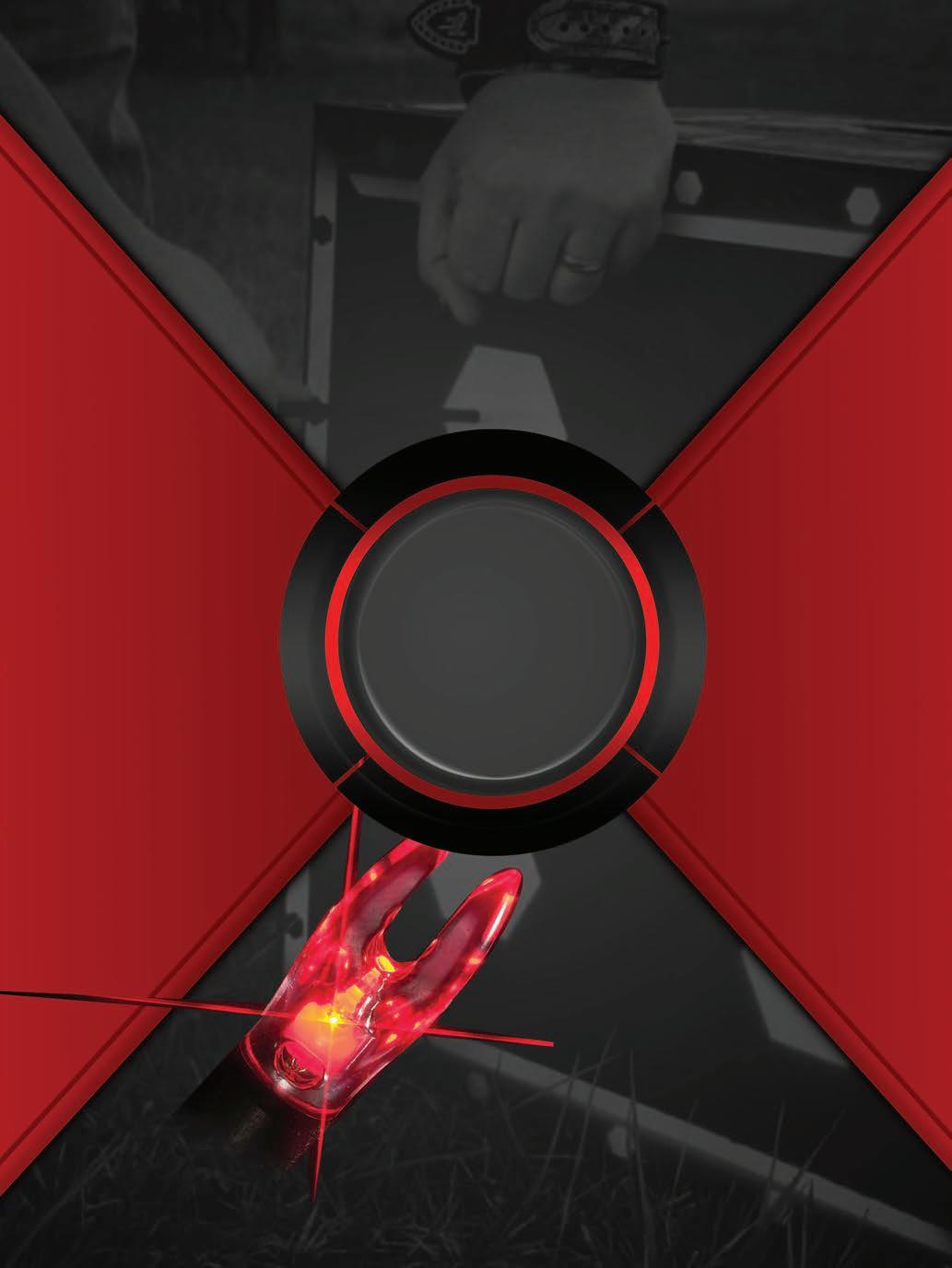
















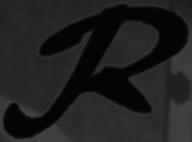










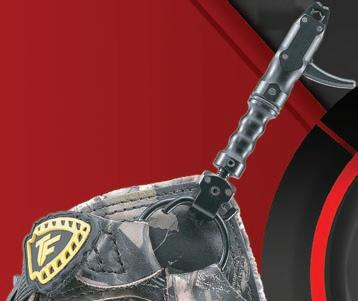
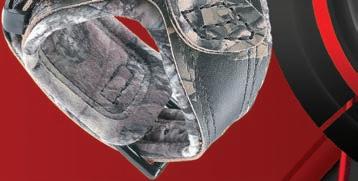













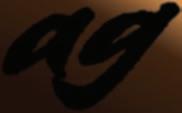




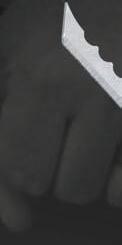






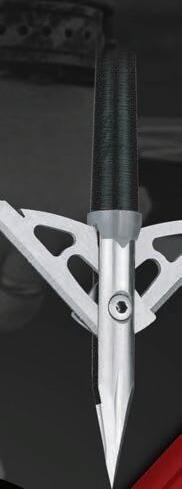











® PROUD SUPPORTER OF POPE AND YOUNG FERADYNE.COM
Conservation Chair Column
Smokey became a celebrity. The state game warden wrote the Chief of the Forest Service, offering to present the cub to the agency if the cub would be dedicated to a conservation and wildfire prevention publicity program.
Smokey arrived at the National Zoo in Washington, D.C., on June 27, 1950, and lived there for 26 years. During that time, he received millions of visitors, and more than 13,000 letters per week were addressed to him. Because of all this mailing, in 1964, the United States Post Office gave him his own Zip Code (20252), which is still in use.
Smokey officially “retired” from his role on May 2, 1975, and another orphaned bear cub, also from the Lincoln National Forest in NM, was named Smokey Bear II. Smokey died on November 9, 1976, and the government returned his remains to Capitan, NM. He’s buried at Smokey Bear Historical Park, operated by the New Mexico State Forest Division. That facility is now a wildfire and Smokey interpretive center. The plaque at his grave reads, “This is the resting place of the first living Smokey Bear…the living symbol of wildfire prevention and wildlife conservation.”



Make your story one to
remember—get
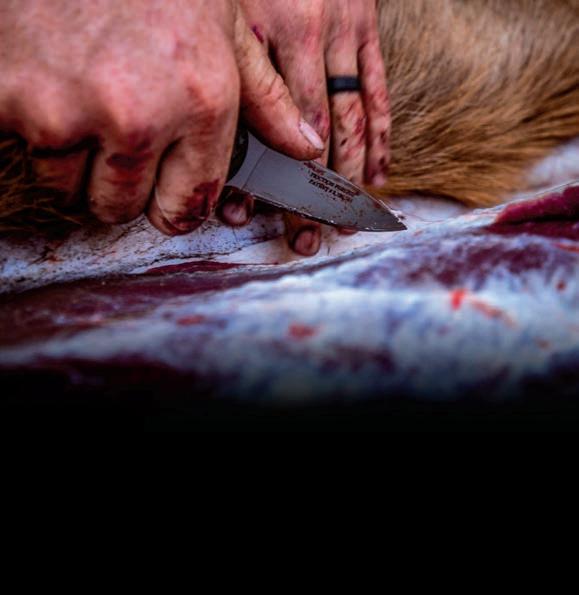



By 1952, with Smokey Bear having attracted considerable commercial interest, the U.S. Congress passed the Smokey Bear Act, which removed the name from the public domain and placed it under the control of the Secretary of Agriculture. The act stated that royalties derived from Smokey’s name would be used for continued education about forest fire prevention.
In 2000, Richard Earle, author of The Art of Cause Marketing, said the Smokey Bear Campaign is among the most powerful and enduring of all public service advertising:
2024 Spring continued 16
“Smokey is simple, strong, straightforward. He’s a denizen of those woods you’re visiting and cares about preserving them. Anyone who grew up watching Bambi realized how terrifying a forest fire can be. But Smokey wouldn’t run away. Smokey’s strong. He’ll stay and fight the fire if necessary, but he’d rather have you douse it and cover it up so he doesn’t have to.” 6.5
today.
HUNTING STORIES... END YOURS WITH A DIRTY KNIFE.
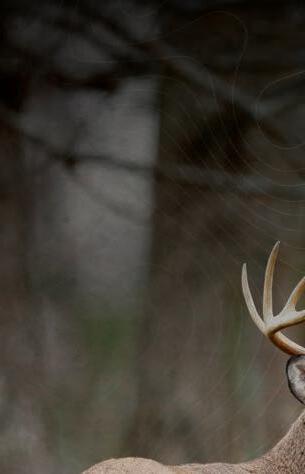
THE #1 WHITETAIL HUNTING APP
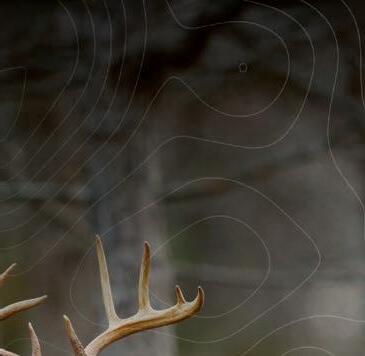



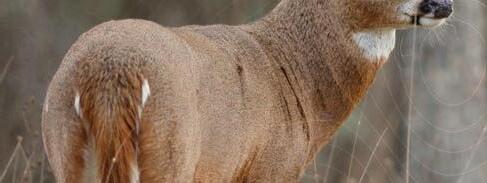
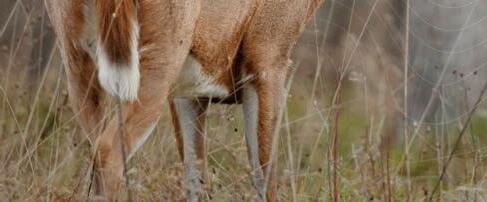
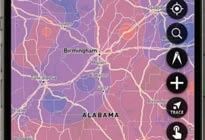


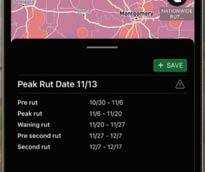


WHITETAIL RUT MAP

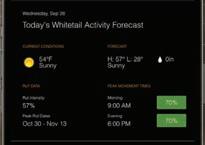


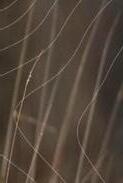
Unlock the most extensive Rut Map in the country

NATIONWIDE PROPERTY INFO



WHITETAIL ACTIVITY FORECAST
Download and map for FREE!



WHITETAIL RUT MAP

MONTHLY SATELLITE IMAGERY


WHITETAIL HABITAT MAP
huntstand.com

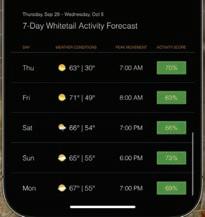

WHITETAIL ACTIVITY FORECAST
Plan your hunt around peak movement times
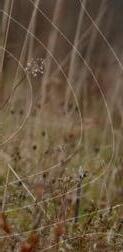
Join millions of hunters who use HuntStand to view property lines, find public hunting land, and manage their hunting property. Enjoy a powerful collection of maps and tools — including nationwide rut dates and a 7-day whitetail activity forecast with peak deer movement times.

NATIONAL AERIAL IMAGERY

CROP HISTORY


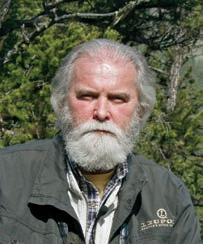
Conservation Matters
By Kurt Ebers
Shane P. Mahoney
Hunting Has Always Been a Woman’s Game
“The environment, after all, is where we all meet, where we all have a mutual interest. It is one thing that all of us share. It is not only a mirror of ourselves, but a focusing lens on what we can become.” ~ Lady Bird Johnson
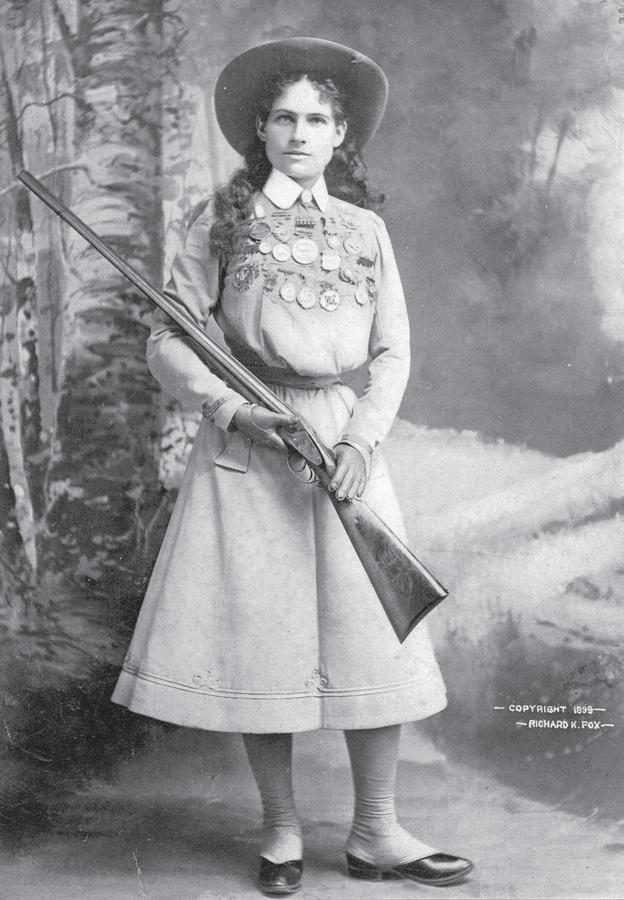

Throughout the human evolutionary process both men and women were ultimately dependant on their ability to harvest life-sustaining resources, food especially, from the natural environment and to avoid predators. Yet, despite these shared realities, and despite sometimes conflicting evidence to support such a claim, historical writings have predominantly reinforced the concepts of “man the hunter” and “woman the gatherer”, implying an almost genetic pre-disposition to their respective roles.
While this binary view has heavily influenced our understanding of prehistoric cultures and our impressions of acceptable gender roles in modern times, this interpretation is almost certainly more a reflection of historical gender bias in reporting than an empirical truth or likelihood. Maybe it is an early example of fake news? Regardless of the social impact of Robert Ardrey’s Hunting Hypothesis and other influential, male-dominated narratives of the twentieth century, we now know that women often hunted in prehistoric, ancient, and more recent previous eras, just as they do today. And just as for men, hunting for women took on many forms, functional as well as ceremonial.
Cave paintings, now theorized by some to have been primarily the creations of female artists (based on handprint sizes), certainly depict women taking both active and
2024 Spring
18
supporting roles in hunting. Additional archaeological evidence indicates that from early times Indian women hunted alongside men in that country. Meanwhile, Australian Martu women have always hunted extensively and continue to do so today. Very interestingly, Martu women hunt primarily more accessible and smaller game such as lizards to provision their closest relatives and to enhance cooperative relations with other women. Martu men, on the other hand, hunt larger, less predictable game, with broader political and competitive social agendas at play.
Sound familiar? I’m sure it does; but this pattern did not hold true everywhere. Recent archaeological finds in high altitude sites in Peru indicate clearly that 9000 years ago women were regularly engaged in big game hunting and that their hunting implements and weapons were buried with them for use in their afterlife, just as was done for males.
Ceremonial and non-subsistence hunting also involved women. In ancient Egypt, queens hunted from chariots, not for sustenance, but for sport; and there are many more recent historical references to European queens shooting tigers and panthers, pursuing, like their Egyptian counterparts, an aristocratic pastime. Queen Elizabeth II was, in fact, upholding a centuries-old tradition of the British Royal Family when she engaged in a tiger hunt in Meghauli, Nepal, in 1961.
Female association with hunting actually has a long, deep, and complex history. Why, then, the common perception in modern society that hunting is (or should be) the males’ domain? How and why did the older evidence for female hunting engagement become subjugated and seemingly forgotten? And why did women’s’ engagement in hunting come to be, in many ways, discouraged? Clearly women were always physically, emotionally, and intellectually
capable of pursuing and killing living organisms for food. So, what changed?
Part of the answer lies in how human societies evolved over time and how gender roles, in general, became more rigidly defined, separated, and restricted as our fundamental relationships with nature changed. Undoubtedly the development of agriculture and the ability to accumulate resources while sedentary played some role in this process, just as it strongly influenced a broad suite of other social dynamics. Patriarchal dominance has deep roots.
In Western civilization, the transition to patriarchy was already apparent by about 3,100 BCE, when female subordination was institutionalized in the earliest known written codes. This era also witnessed a societal shift away from cosmogonies in which female goddesses held positions of power and towards the Old Testament covenants where the powers of creation and fertility moved from Goddess to God. This was a watershed change for women and for what our human relationships to nature, and to one another, would become. Its momentum would last centuries, traverse continents and encircle most of the world. While many of its outcomes were explicit and direct, many others, just as influential and long-lasting, were less obvious and often unspoken.
From the last century of the Middle Ages onward, restrictions on women’s lives and roles in society spread outwards from Europe as Christian orthodoxy sailed the world’s oceans, powered by the winds of colonialism, religious missionary zeal and imperialistic ambition. Thus, in growing parts of the world, average women’s lives were increasingly governed by prohibition, restraint, and subservience. Enforced by religious ideologies, this feminine “ideal” had already permeated most of European society and was an important principle of
the Puritan Movement of the late 16th century, which deeply influenced, eventually, the social, political, ethical and theological perspectives of modern North Americans.
Thus, with the exception of some Indigenous and local cultures that escaped or resisted this European influence, increasingly, women were, pre-industrial revolution, largely discouraged from unfeminine engagements with nature, and especially with wild nature, patterns that extended very much globally, in fact, and far beyond the borders of North America and Europe or the geography of Christianity itself.
Some women, however, refused to be subjugated by societal ideals of appropriate female behavior respecting activities in nature, as in many other domains; rather, they challenged expectations, displaying the “eccentricity of conduct” identified by Mary Zeiss Stange in her essay Women and Hunting in the (American) West. Both huntresses and conservation activists emerged. Their stories are varied; many are exceptional; all are important. Too many are unknown.
In North America, at least, many of us are familiar with the story of the great sharpshooter Annie Oakley, perhaps the most famous early American huntress. Born into poverty in 1860 in western Ohio, Annie began trapping and hunting at the age of seven to support her widowed mother and siblings. By age fifteen, revenues from her shooting skills had paid off the mortgage on her mother’s farm. Yet, despite her celebrity as a sharpshooting star, it is well-known that she much preferred hunting. There could be no doubt, rifle in hand, she was the equal, if not the better, of any man. Her skills as a marksperson were almost beyond belief.
Remarkable, too, was Paulina Brandreth. Born in the Adirondack Mountains in 1885, Paulina published her first hunting story in Field and Stream Magazine,

Spring 2024 19
Conservation Matters

anonymously, at the age of 9 and, later, one of the first major books on deer hunting, Trails of Enchantment, in 1930, under the penname Paul Brandreth. An accomplished photographer and naturalist,
Brandreth’s book, which is still available, contains wonderful, startling photos and remarkably detailed information on White-tailed deer biology, as well as conservation commentary. Paulina hunted







alongside famous male hunters including Roy Chapman Andrews and Reuben Cary, though not all her companions may have known her true gender as she purposely dressed as a man when afield. For those who did know, it really made no difference. The way she hunted made that clear enough.
Accomplished female hunters and outdoor writers were not restricted to America, of course. Numerous Englishwomen also became well known for their hunting exploits, cousins Agnes and Cecily Herbert among them. These women hunted big game on three continents between 1906 and 1911. On their first safari, to Somaliland, the women made a bet with another allmale safari group that they would out-hunt them. Their triumphant win is described in Agnes’ first book, Two Dianas in Somaliland (1908).
Such forthright sentiments (and personalities) were obviously shared by other women hunters of that era. Lady Catherine Minna Jenkins, an Englishwoman who hunted tigers in India, numerous game species in Somalia, and a variety of mountain ungulates, including blue sheep, Tibetan argali, gazelles, urial, barasingha, ibex, and markhor on a grueling trip in the mountains of Tibet, was among them. Jenkins recorded the latter experience, which she undertook without her husband, in her book Sport and Travel in Both Tibets (1909). No one familiar with this account can be unimpressed with the sheer physicality and challenge of the adventure, nor with the independence, determination, and mental fortitude of its author. Reading this text, it is indeed hard to reconcile how women hunters could ever have been considered “less” than their male counterparts.
While the exploits of these early women hunters are extraordinary in themselves, what is equally significant are the efforts they made, via their writings and public
2024 Spring continued 20

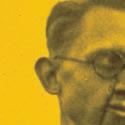
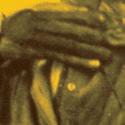

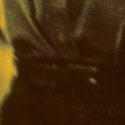
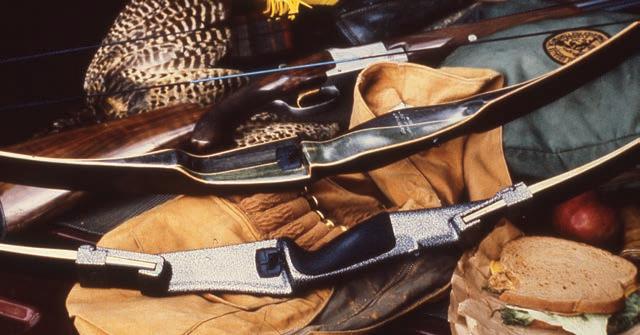

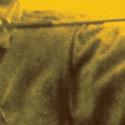
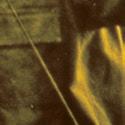
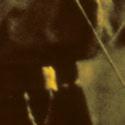



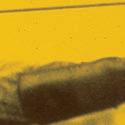

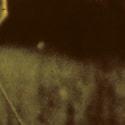
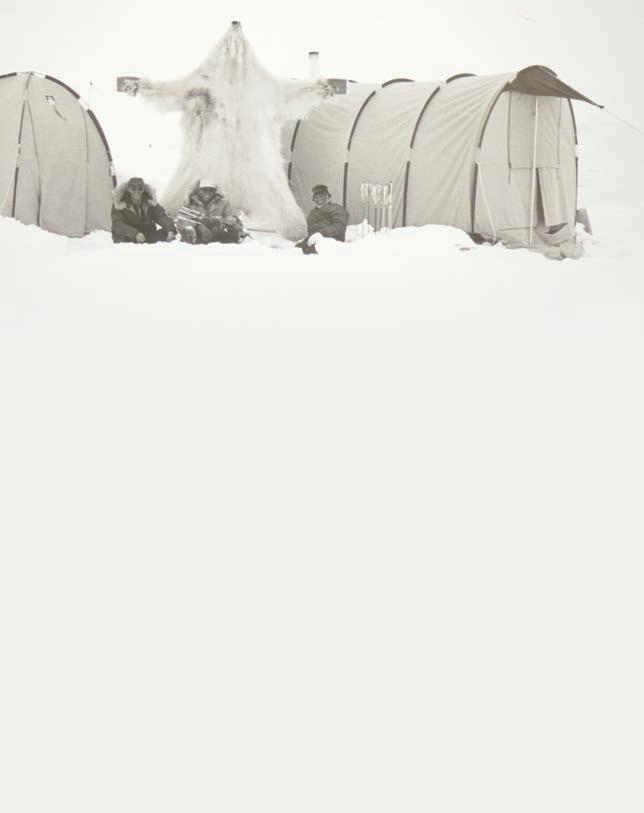
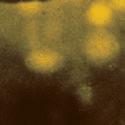

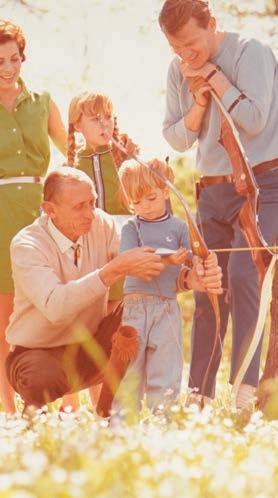

Conservation Matters

appearances, to bring their experiences to the world. They were not only proud of what they did but clearly wanted the world to know. Undoubtedly, they also hoped to inspire other women to challenge the expectations and boundaries imposed by society at that time. And just as these pioneering women defied social conventions to become accomplished shooters and hunters, so, too, did their female contemporaries who joined and helped define the newly emerging field of environmental conservation. Think Harriet Lawrence Hemenway, Minna Hall, Rosalie Barrow Edge, Margaret “Mardy” Murie (dubbed the “Grandmother of the Conservation Movement”), Herma Albertson Baggley, and the indominable Rachel Carson.
Today, women represent the fastest
growing hunting segment in American society. According to the National Shooting Sports Foundation, women make up 22% of all hunters, an incredible 25% increase in numbers since 2006. More and more women are choosing to hunt, expressing a desire to connect more closely with the food chain and nature, to procure the healthiest food available, and to take responsibility for ethical food procurement. While many of these participants grew up in hunting families, many more are being introduced to hunting by friends or through enrolling in programs that help teach women the skills to hunt and process their game.
This is good news, not just for societal progress, but for wildlife and habitat conservation. The potential for female
leadership and participation in conservation amongst women who hunt is immense and growing. Women hunters and their organizations are making great contributions towards preserving and protecting natural resources, fighting for action on climate change, leading research programs and educating the public on why all citizens should care about wild species and wild places, and for the respectful treatment and management of wild animals and the habitats they require. This will undoubtedly lead to new conversations within the hunting and conservation community and hopefully broaden this dialogue within society at large.
I think both Annie Oakley and Rachel Carson would be proud of the changes we are seeing. In fact, we all should be.
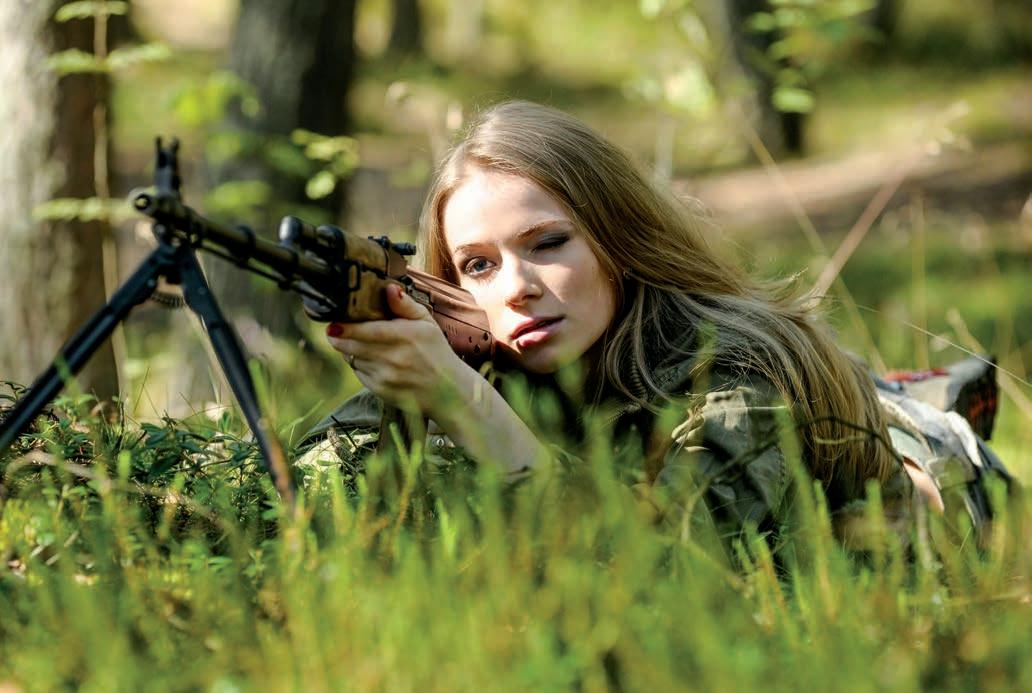

2024 Spring continued 22





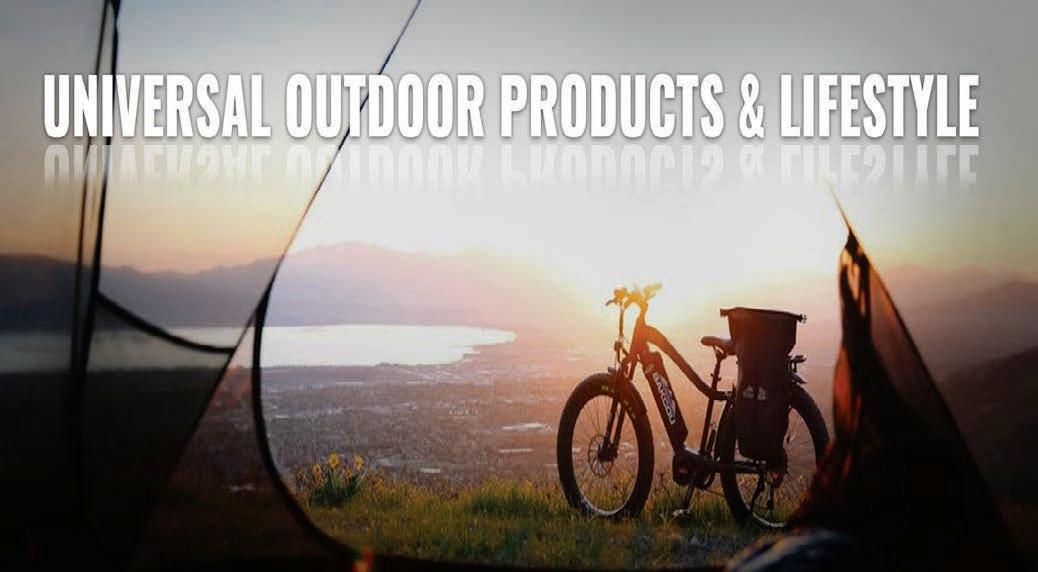
Universal outdoor products, LLC brings you this great offer on our P&Y inspired Bakcou turkey bike package.
Every bike purchasd in the month of March and April will come with these FREE products.
1. Rocky mountain hunting calls turkey kit, includes 1 crowcall, 1 slate call , 1 box calland 1 threepackof turkey diaphragms.
2. Viam outdoor gear kit includes 1 multi cloth and 1 setofG3 organizational bags.
3. 1 set of bakcou pannierbags
4. 1 PSG sm universal rack system
5. 1 Deadnutz 2D turkey target
Upon check out you will use the promo code “turkey2022”
This will give you $400.00 off any bike and the free gifts inside of this package valued at over $1,500.00 in total savings.
Free shipping
Orderyourstodayat www.universaloutdoorproducts.com
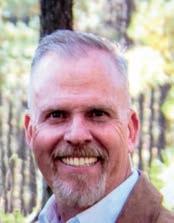
ABig Game Records
By Roy Grace
s I write this column, I can’t help but reflect on what the records committee has been able to accomplish over my last four years as your Records Committee Chair. From how we treat velvet-antlered animals to increasing our trophy display at conventions, this group of fine measurers has exceeded my expectations and helped me navigate both the records portion of the Pope and Young Club (Club) and my duties as a board member. I want to thank all of them for volunteering their time and putting the Club first. I had every intention of stepping down after this current term; however, I was ‘encouraged’ to stay on for one more term to assist with the transition of our new executive director and ensure continuity with our records program. So, to some of you, I must apologize up front, as I have agreed to remain for two more years.

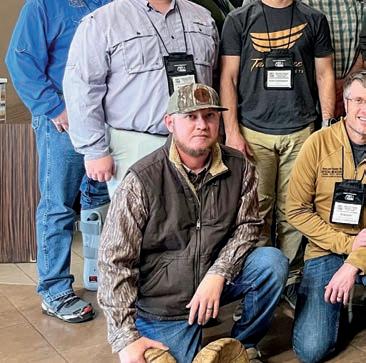

College Station Bowhunter Bash / Measurers Course
In early December of 2023, we held a onenight Bowhunter Bash in College Station, Texas. During this time, we also trained twenty-three new Pope and Young / Boone and Crockett official measurers. These new measurers successfully completed the course, attended the Saturday night Bash, went home with some swag, and better understood our measuring system. I want to thank those who helped Tim Rozewski. Kyle Lehr (B&C) and I instruct the course; Jennifer Schwab (B&C), Larry Strief, and Ricky Kruger, thank you for your assistance in teaching our new measurers. Lastly, a huge thank you to Jack Culpepper and his family for hosting a Texas barbeque dinner at their lovely home for all the students and instructors. Your generosity and support
were much appreciated.
If you haven’t attended a Bowhunter Bash event, you ARE missing out. Plan on attending the next one and join in the fun!
Measuring Workshops for 2024
We tentatively have seven joint (P&Y / B&C) measuring workshops scheduled for 2024. The locations will be Utah, Minnesota, West Virginia, Texas, Oklahoma, Saskatchewan, and Manitoba. Since this is a joint course, it will take a total of four days to complete and become certified. If you are interested in becoming an official measurer, go to our website, fill out a COMPLETED application, and submit it. We will work off our current applicant list but anticipate not having enough applicants to fill all these classes. So, this may be a great opportunity to make this commitment and become an official measurer.
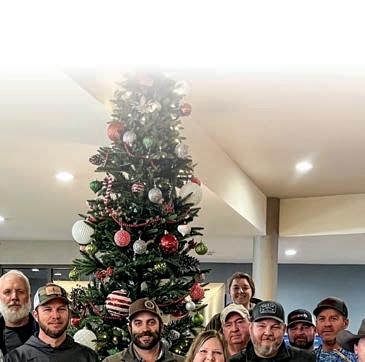
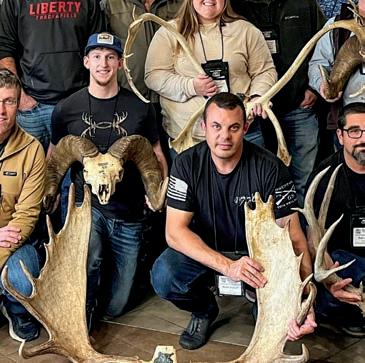
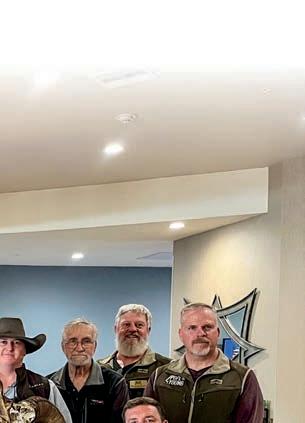

2024 Spring
24
New Appointees
Allen Crown - Arden, NC | Ben Murrell - San Antonio, TX | Blaine Starr - Warren, AR | Brian Dalzell - Katy, TX | Corey May - West Monroe, LA
Dan Mallia - Anderson, CA | Erin Stieder - Ridgley, MD | Fred Gill - Leicester, NC | James Warner - Sapulpa, OK | Jared Schmidt - Liberty, IL
John Culpepper - College Station, TX | Kyle Muncey - Pawhuska, OK | Kyle Shaffer - Sherman, TX | Luke Shellhaas - Greenville, OH
Mark Kramer - La Crescent, MN | Martin Cain - McArthur, OH | Martin Trujillo - Colorado Springs, CO | Matthew Haughey - Brentwood, TN
Rusty Wood - Nacogdoches, TX | Taylor Moore - Stockdale, TX | Wesley Nutt - Bivins, TX | Zach Pearson - Paducah, TX
Measurer Sign-up Incentive Program Recap (2023)
Our first year running our Measurer Sign-up Incentive Program has been hugely successful. Our measurers signed up 490 new members in our first year in 2023! Many of our measurers have received prizes for the number of new members they have signed up, and a few are waiting for their top-end prizes. Thank ALL of you, measurers, for taking the opportunity to sign up new members while measuring trophies or interacting at sporting events. You ARE the face of our organization and provide that positive interaction with potential members. Keep up your hard work, and enjoy the incentives as you move that membership needle!
Measurer Error Free Entry Program Winner
Speaking of measurers and stats, our error-free entry program has also had great success. This program is for measurers who submit an error-free entry(s) throughout the year. Each clean entry gives the measurer a chance to win a large Yeti ice chest at the end of the year. In 2023, we processed and accepted 2,452 entries into our records program. Of those, 1,295 were error-free. That means 52.8% of our overall entries were submitted perfectly! This is up from 31% the year before, so we are improving our efficiency and our Director of Records is very appreciative. At the end of 2023, the drawing was held for this program, and measurer Mike Casey of Dubuque, Iowa, won the Yeti cooler. Congratulations Mike!
Measurer’s Page on Facebook
This is just a reminder for those measurers with a Facebook account; please make sure you join the Pope and Young Measurer’s Page. It’s a great place to discuss complex trophy issues, exchange ideas, and keep each other informed on happenings with
the Club and conservation issues.
Sight Lights
I know I have written on this before. However, several recent inquiries have been made about the use of lights attached to bow sights. The official Club stance adopted several years ago is that using sight lights is not allowed under rule seven (7) of our Fair Chase Affidavit. Specifically, it states no animal shall be taken “By the use of electronic devices for attracting, locating, or pursuing game, or guiding the hunter to such game, or by the use of a bow or arrow to which any electronic device is attached except for lighted nocks and recording devices that cast no light towards the target and do not aid in rangefinding,
sighting shooting the bow.” What IS allowed is a light attached to the sight with the BATTERY REMOVED. The sub-committee (back in 2010) decided that light without a battery is no longer an electronic device and, therefore, allowable. Hopefully, this clears up some of the confusion in this area. If you have any questions or concerns, please do not hesitate to contact me.
Closing
As always, THANK YOU to our measurers and support staff. We all dedicate a lot of our time to this Club, and your Board truly does appreciate your time and efforts. Good luck in the Spring hunts, and remember to hunt ethically and within Fair Chase.


Spring 2024 25

On the night of October 12th, 2015, Kansas
On the night of October 12th, 2015, Kansas
On the night of October 12th, 2015, Kansas
City Fire Fighter, John Mesh and fellow firefighters responded to a building fire in the historic Northeast neighborhood in which he had grown up. Unfortunately, this would be Johns last alarm, while battling the blaze the three story building suddenly collapsed burying him in tons of rubble and debris, John would not survive his injuries.
City Fire Fighter, John Mesh and fellow firefighters responded to a building fire in the historic Northeast neighborhood in which he had grown up. Unfortunately, this would be Johns last alarm, while battling the blaze the three story building suddenly collapsed burying him in tons of rubble and debris, John would not survive his injuries.

City Fire Fighter, John Mesh and fellow firefighters responded to a building fire in the historic Northeast neighborhood in which he had grown up. Unfortunately, this would be Johns last alarm, while battling the blaze the three story building suddenly collapsed burying him in tons of rubble and debris, John would not survive his injuries.



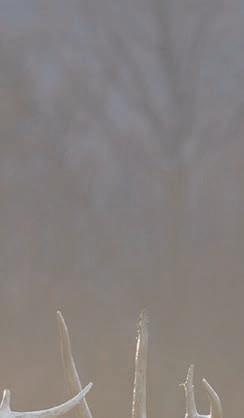

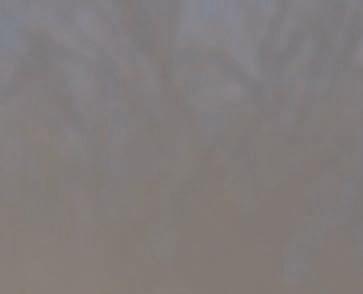
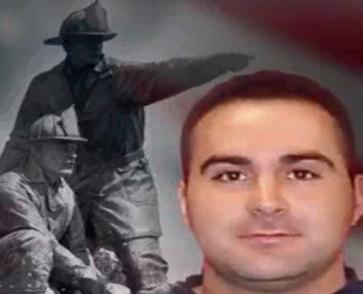
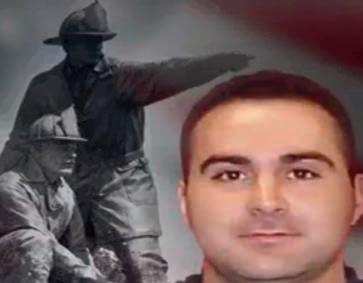
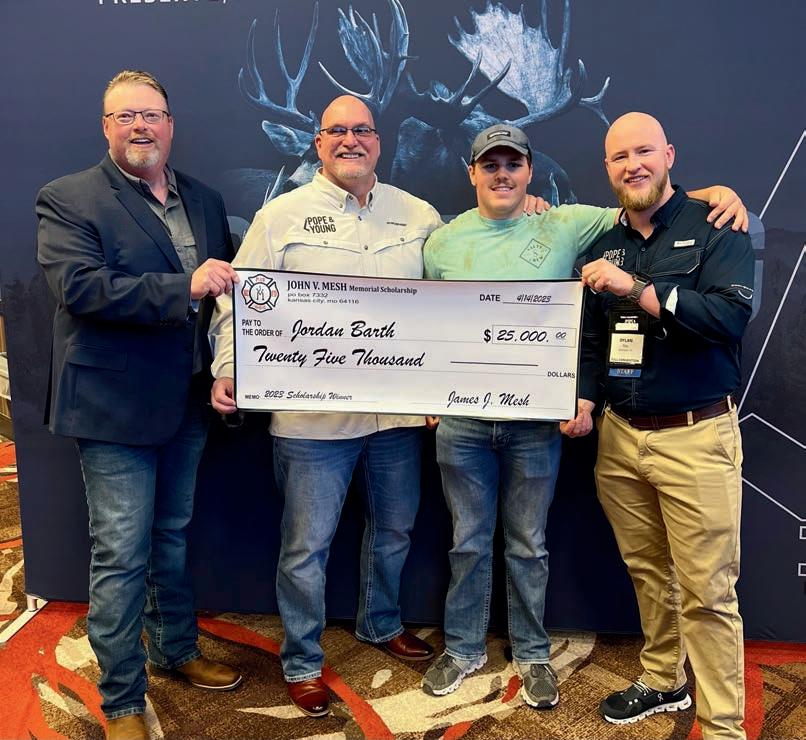


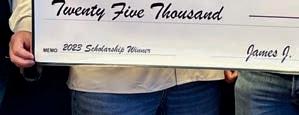



At the 33rd Biennial Pope & Young Convention, the John V. Mesh Memorial Scholarship presented a scholarship of $25,000 to Jordan Barthto continue his schooling in Wildlife
At the 33rd Biennial Pope & Young Convention, the John V. Mesh Memorial Scholarship presented a scholarship of $25,000 to Jordan Barthto continue his schooling in Wildlife
At the 33rd Biennial Pope & Young Convention, the John V. Mesh Memorial Scholarship presented a scholarship of $25,000 to Jordan Barthto continue his schooling in Wildlife Management Biology


The John V. Mesh Memorial Scholarship, a 501(C)3 Nonprofit, is dedicated to introducing kids and young adults to the

great outdoors. conservation, and learning Management Biology
The John V. Mesh Memorial Scholarship, a 501(C)3 Nonprofit, is dedicated to introducing kids and young adults to the

The John V. Mesh Memorial Scholarship, a 501(C)3 Nonprofit, is dedicated to introducing kids and young adults to the great outdoors.
While providing scholarships for those interested in pursuing a career in opportunities and experiences for those wanting to get into the outdoors.
While providing scholarships for those interested in pursuing a career in conservation, and learning opportunities and experiences for those wanting to get into the outdoors.
While providing scholarships for those interested in pursuing a career in opportunities and experiences for those wanting to get into the outdoors.
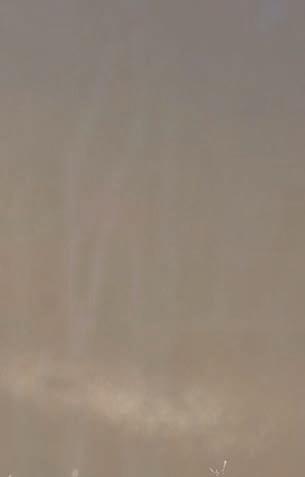


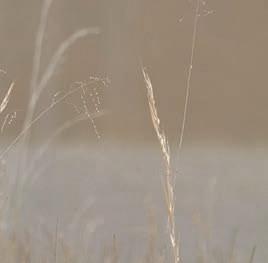
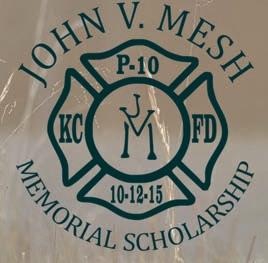
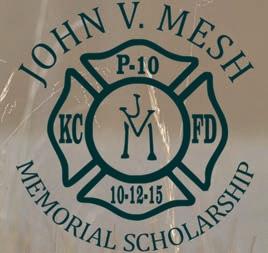




Make plans to join us for the 9th Annual Sporting Clay Shoot
Make plans to join us for the 9th Annual Sporting Clay Shoot



September 28th, 2024 in Lenexa, KS to benefit the effor wildlife conservation scholarship in North America.

September 28th, 2024 in Lenexa, KS to benefit the efforts of the premier wildlife conservation scholarship in North America.
ts of the premier wildlife conservation scholarship in North America.
www.johnvmesh.org
www.johnvmesh.org
www.johnvmesh.org
















@363huntclub
@363huntclub

@363huntclub

NEW MEMBER RECRUITMENT PROGRAM






































































INCENTIVE PRIZES
P&Y Logo KUIU cap
Official P&Y“OM Challenge Coin
Data through 1/8/2024
KenRimerWI57



StanZirbelWI32
StevenTaylorIN30







Matthew OlsonOH28
WilliamBellmanOH19
Tim Rozewski OR17
DaleWeddleKY9
JerryGanderWI8

Ozonics Micro Scent Eliminating Car Charger
OMEmbroidered Vest
Grizzly Cooler Package(up to $350 value)
Gear Package TBA(up to $ value)
Compound Bow
$ Gift Card to Bass Pro/Cabelas
Free Full Convention package for ($ value)
NOTE: This program is for Official P&Y Measurerswho are active members. To participate, please make sureyour own membership is active!

PRESERVE. PROMOTE. PROTECT.

Philip HerrnbergerPA8
GerryWegnerWI7
MerrittCompton NY7
William Cooper GA7
TonyHeilWI5

Jeff BestMI5
KevinKrauseWA4
Russ Spaulding WA4
JasonZinsND4
James Dowd NY4
Stan Rauch SD4
John GardnerCO4
Lee Schiferl VA3

Zack WaltonCA3
LeeWaltAR3

GaryWegnerWI3
BuckyIhlenfeldt WI3


Mark MillerWI3

John (Jack)Culpepper III TX3
Ben Bartlett TX3
JasonConverseSD3
Mark BaraSC3
JeradLangleyOK3
DonaldHaseleyNY3
RoscoeBlaisdellNH3
LeRoyHansenMI3
Robert Newton III MD3
JackFields II IN3
RichardPflanz IN3
GaryMcCainCA3
39 at 2 referrals 123 at 1 referral



For more informationvisit, pope-young.org/measurer-programs
Sheep • Measuring and Scoring Horns
Four wild sheep categories are eligible for records keeping by Pope and Young and the Boone and Crockett Club. The genus Ovis is divided into two species, the Dall’s sheep (Ovis dalli) and the bighorn sheep (Ovis canadensis). A subspecies of the pure white Dall’s sheep is the Stone’s sheep (Ovis dalli stonei); both are known as thin-horn sheep. The Stone’s sheep typically has a gray head and neck with body colors of gray, brown or black. For recordskeeping purposes, any thin-horn sheep with black hairs on the body is classified as a Stone’s sheep, unless only the tail is black. In the case of a black tail only, the trophy would be considered a Dall’s sheep. The bighorn category includes a southern subspecies, Nelson’s bighorn (Ovis canadensis nelsoni) or more commonly, the Desert bighorn.
Of these four categories of sheep, three are named after people. Dall’s sheep bears
the name of William Healey Dall (August 21, 1845 – March 27, 1927). Born in Boston, Massachusetts, Dall was an American naturalist and one of the earliest explorers of interior Alaska. He also founded the National Geographic Society. Stone’s sheep was named after Andrew J. Stone, the first hunter-naturalist to describe and collect specimens of this animal. Stone made a scientific expedition in 1896 into the Cassiar Mountains of British Columbia. The Desert bighorn received its subspecies name nelsoni from Edward William Nelson (May 8, 1855 – May 19, 1934). Born in Manchester, New Hampshire, Nelson was an outstanding American naturalist. He worked in Alaska and Death Valley and spent 14 years in Mexico. Nelson was the first to describe the Desert bighorn subspecies that had adapted to the dry desert regions of the southwestern United States and northern Mexico.
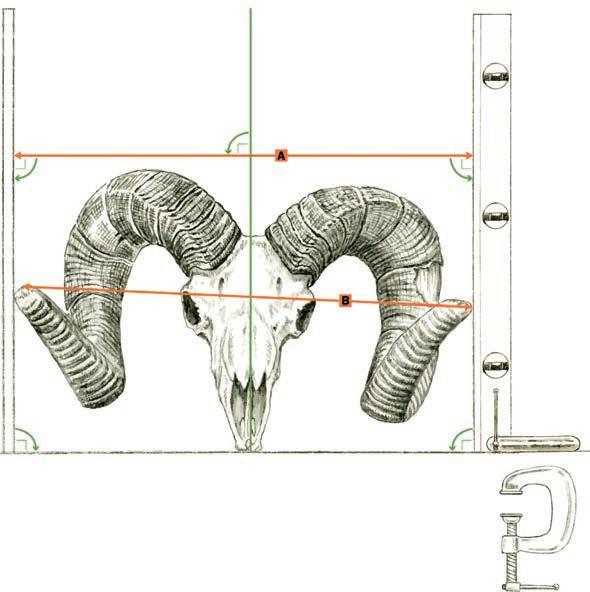
Horn configuration in sheep varies. The three basic forms: close curl, close curl with flaring tips, and wide flare. Bighorns generally show some degree of the close curl, while the close curl with flaring tips is often found in Stone’s and Dall’s sheep. The wide-flaring conformation is less common in all categories. Variation in horn shape is the main reason greatest spread and tipto-tip spread are supplementary data that do not figure into the final score. Use of spread in scoring sheep would discriminate against close-curl specimens and would be particularly inappropriate in bighorns, where massive horns with a close curl can make a most impressive specimen.
Spread Measurements
• The first step in scoring a sheep is to take the greatest-spread measurement (Figure 1), using two perpendiculars (such as carpenter’s levels held upright by large C-clamps, or perfectly square-cut wooden blocks). The horns are placed between two plumb carpenter’s levels and the measurement is taken with a folding carpenter’s ruler between the two perpendiculars. If perpendiculars are not available, a floor and vertical wall can be used for one perpendicular, with the second being improvised from a carpenter’s level, a carpenter’s square, or a straight, square-cut board. In no case should the human eye be relied upon for establishment of the second perpendicular line. One must ensure the line of measurement is at a right angle to the center line of the skull so that the measurement is not improperly taken at a diagonal. The greatest spread is recorded in the box on Line A of the score chart.
Tip-to-tip spread (Figure 1) is measured from the center of the tip of one horn to the center of the tip of the other. It is best taken using a folding carpenter’s ruler or some other straightedge. If the skull is in

2024 Spring
OUR P&Y, B&C,
REPRINTED FROM
JOINT MEASURER’S MANUAL
28
Figure
1
the way of the tip-to-tip spread measurement, it may be necessary to take the tip-to-tip spread with large calipers or two perpendicular uprights, such as carpenter’s levels. To do this, place the skull on a flat surface, and align the plumb, perpendicular uprights on the tip of each horn. Then measure the distance between the uprights with a folding carpenter’s ruler. As this measurement is taken directly from tip to tip, ensure the variation in height where the tips touch the carpenter’s squares is taken into account when measuring the distance from one carpenter’s square to the other. Tip-to-tip spread is recorded in the box on Line B of the score chart.
Note that the tip-to-tip and greatestspread measurements are supplementary data and are not figured into the final score. They are recorded on the score chart because they indicate the general conformation of the horns, and with the other measurements, help to give a more complete picture of the trophy.
Horn length and circumference measurements can be taken with the horns detached from the skull, but you must have the skull plate to do the spread measurements.
Axis Lines
• Length of horn and circumferences are taken at a right angle to the axis lines on the horn. Refer to (Figure 2) for a visual description of the axis lines of a sheep horn. Position the horns to directly view the outside edge of the horn. From this angle you will notice linear lines and rings. These rings or annuli completely encircle the ram’s horns and are not used as reference for taking measurements but are used in aging the ram.
Now focus on the long, linear marks. These lines, and there are dozens of them, are etched into the horn and start from the base and extend all the way to the tip. These
lines, which run parallel to each other, are referred to as axis lines. When measuring length of horn, the termination point is identified by holding a credit card or metal card perpendicular to these lines at the end of the horn. Circumference measurements are taken by placing a quarter-inch-wide steel tape on either side of the quarter end marks with the tape pulled tightly and perpendicular to these lines.
Length of Horn • Only a quarter-inchwide flexible steel tape may be used for horn length and circumference measurements on sheep; a steel cable cannot be substituted. At times, the horns on sheep may sit loosely on their cores. It is permissible to remove the horns from their cores for measurement of the lengths and circumferences. Be sure to note the right and left horns if you remove them from the skull to measure them.
As in all horn measurements, accuracy in measuring horn length is vital to subsequent measurements. Before taking horn-length measurements, affix masking tape to the horn along the entire line-oflength measurement to make pencil marks directly on the tape. Do not place pencil or other marks directly on the horn.
As illustrated in Figure 2, begin the hornlength measurement (C) by hooking the lip end of the measuring tape on the lowest front edge of the horn base where the crest of the horn begins. The line of measurement is then maintained along the horn surface to a point in line with the horn tip. If and when it is necessary to change the direction of the measuring tape or maneuver the horns, leave a pencil mark on the masking tape before you pivot the measuring tape. Use a credit card to determine the end of the measurement line by forming a right angle with a credit card and axis lines
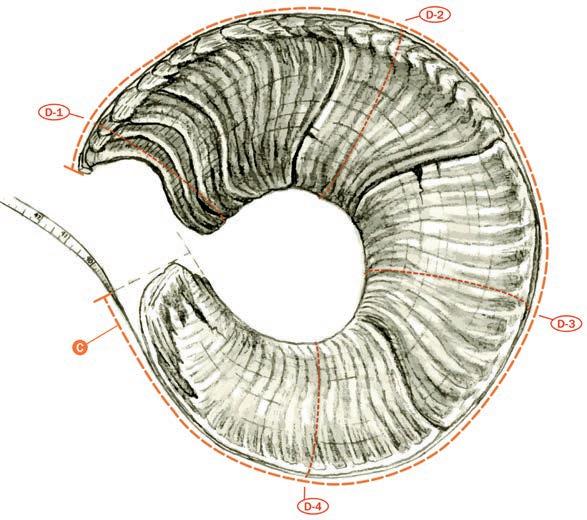

Spring 2024
29
Figure 2
Sheep • Measuring and Scoring Horns
at that point. This technique is necessary because broken or broomed horn tips, or both, are often encountered in sheep, especially older bighorns. The length-of-horn measurements are recorded on Line C of the score chart.
The length of a sheep horn is correctly taken with the tape contacting the high points along the horn, reflecting the greatest length of the entire horn. On many sheep, high points occur along the outside edge, but be aware this is not always the case. Some rams will exhibit a high ridge near the middle of the horn. Be careful not to push the tape down into depressions that result from the annual growth rings while measuring horn length. Mature
rams, because they frequently strike their horns against those of other rams, tend to chip pieces from their horns. If the length measurement crosses such a location, the tape must be stretched across the gap in a natural fashion (not pushed down into the gap, which would yield an artificially long measurement).
A mounted specimen presents a problem in locating the start of the horn-length measurement. Care must be exercised to begin at the forward edge of the hollow horn. This point is often covered with hair and cape, and could be fused with the mounting media. Careful probing with the tip of a
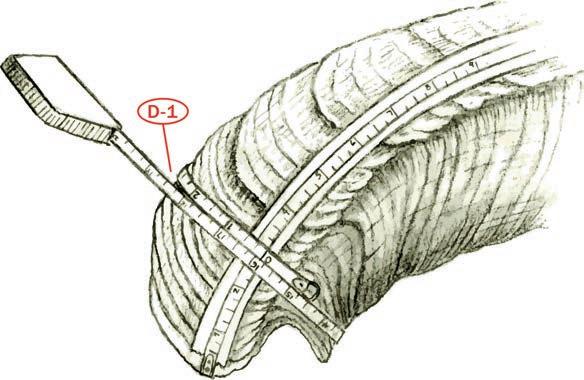
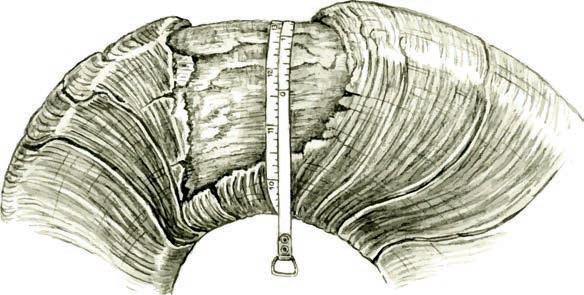

pocketknife and using a flashlight is often necessary to find the correct starting point.
Circumferences
• Once the length-ofhorn measurements have been recorded, the circumference-of-base measurements (D-1) are taken. Care must be taken in making the circumference-of-base measurements of a mounted specimen to avoid including hair, plastic material added by the taxidermist, or a portion of the skull in this measurement. The D-1 measurement is taken at a right angle to the axis of the horn at the lowest place where the tape remains in full contact with the horn base for its entire length and does not cross an open gap on the horn’s inner or outer side. The measurement does not follow the irregular edge of the horn; such a line would result in an inflated value, which would be incorrect. Figure 3 illustrates the proper tape positioning. The base circumference measurements are then recorded on Line D of the score chart.
Once the base measurements have been recorded, the locations of the D-2, D-3, and D-4 circumference measurements are determined by dividing the longer hornlength measurement into quarters (Figure 2). The Quarter Locations for Circumference Chart on page 254 in the back of the manual provides these values. Record the values of the three circumference locations in the blanks provided to the right of each circumference description on the score chart so they can easily be verified if there are any questions later about the measurements. Then mark the three locations (D-2, D-3, and D-4) carefully on the masking tape along the original line of horn-length measurement of each horn with a pencil. Don’t place pencil or other marks directly on the horn itself.
Establish these quarter locations by measuring from the base of each horn to the
2024 Spring continued
Figure
4
Figure 3
30
tip. This is essential to get proper matching of quarter locations on both horns. If the quarters were determined by measuring from the tip toward the base, the quarter locations would be placed nearer the base on the shorter horn than on the longer. This would yield an artificial difference between the quarter measurements. When marking the quarter locations of the horn on the masking tape, hold the measuring tape stationary along the original line followed in measuring the length of horn.
Once the quarters have been properly located and marked on the masking tape with a pencil, measure each circumference by carefully arranging a ring-end measuring tape at a right angle to the horn axis at that point. In other words, the circumference measurements are taken at right angles to the grain of the horn at the point of measurement. At the zero point of the measuring tape, the two ends should pass on opposite sides of the pencil mark for the quarter location, with the tape and the horn axis forming a right angle. Snug the tape around the horn before reading the result, again checking to be sure that the tape is correctly positioned on each side of the pencil mark. If you use a lip-end tape to measure circumferences, overlap the tape at a full 10-inch increment to simplify the procedure. Be sure to subtract the amount of overlap (in this case 10 inches) before recording the measurement.
If a chunk of horn is missing at the location where a circumference measurement is to be taken, no credit can be allowed for the missing piece. The circumference is measured in the usual manner by pulling the tape to its smallest value, at a right angle to the horn axis at that point, thus reflecting only the horn material still present (Figure 4). If it should happen that one horn is broomed to the extent that the horn material is completely missing at the
D-4 circumference location, simply enter a zero value in the appropriate box of the score chart to reflect the missing value and record this in the Remarks section of the score chart. The remaining circumference measurements (D-2, D-3, and D-4) are then recorded in their appropriate boxes of the score chart.
Since sheep often display broomed horns, there is no difference penalty on the score chart for asymmetry in horn length. With the length and circumference values, also record the plug number for the sheep on the line provided in the upper-right corner of the score chart.
Final Score Calculations
• After taking the last measurement, calculate the final score by first determining the differences between the horn circumferences (D-1 through D-4). Enter them in Column 3. Subtract the smaller measurement from the larger measurement for each line item, regardless of which side is smaller or larger, and enter the difference in the appropriate box in Column 3. This is followed by adding up the totals of Columns 1, 2, and 3.
Now turn your attention to filling in all the boxes in the lower left-hand corner of the score chart to calculate the final score for your trophy. Transpose the totals for Columns 1, 2, and 3 to the boxes indicated in the lower left-hand corner of the score chart. Then add Columns 1 and 2 together, and insert that amount in the box for the subtotal. Then subtract the total of Column 3 from that subtotal to arrive at the final score. If your final score exceeds the minimum score and
meets the other entry requirements for one or both of the organizations, you can obtain a list of local Official Measurers by going to their respective websites at www.boonecrockett.org or www.pope-young.org.
Aging Sheep
• Sheep can be aged by counting horn annuli (rings) left as a mark of the cessation of horn growth during each winter (Figure 5). The number of annuli on both horns of the same animal should be the same, unless one of the horns has been substantially broomed. The first annulus is generally within 2 to 4 inches of the tip of the unbroomed horn, with the second
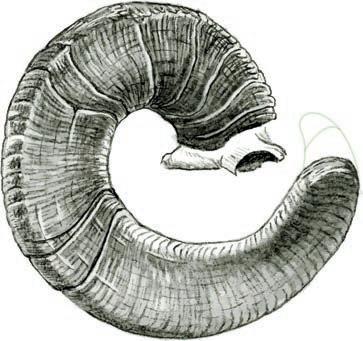
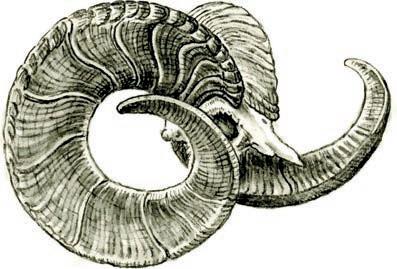

Spring 2024 31
Figure 5
Sheep • Measuring and Scoring Horns
annulus 6 to 9 inches farther down the horn and the third 3 to 5 inches beyond the second, although there is great variation in the pattern of annulus formation in the various categories of sheep. Almost all large bighorns and desert sheep broom off the first annulus. Many Stone’s and Dall’s sheep will have un-broomed horns, so that the number of annuli present equals the age in years. False annuli may appear on sheep horns, but they are usually not as deep as true annuli and do not extend completely around the horn. The annuli on desert sheep are less distinct than in other varieties, but they can still be counted accurately.
What You’ll Need to Score Sheep
• Copy of the current score chart for sheep for the appropriate organization
• Pencil and pen
• Masking tape
• Quarter-inch-wide steel ring-end measuring tape
• Quarter-inch-wide steel lip-end measuring tape
• Folding carpenter’s ruler with brass slide extension
• Carpenter’s level with C-clamp
You May Also Need:
• 1 or 2 carpenter’s levels with C-clamps
• Small carpenter’s square or credit card
• Flashlight
• Pocketknife Minimum Scores
Sheep Boundaries • The wild sheep of North America belong in only two species, the thin-horned sheep of northern British Columbia northward (Ovis dalli), and the bighorn sheep ranging from central B.C. southward to Baja, California (Ovis canadensis).
Desert Sheep • The bighorn sheep are separable into Rocky Mountain bighorn sheep and Desert bighorn sheep (Figure 6). Thanks to the conservation efforts of numerous groups and individuals, Desert
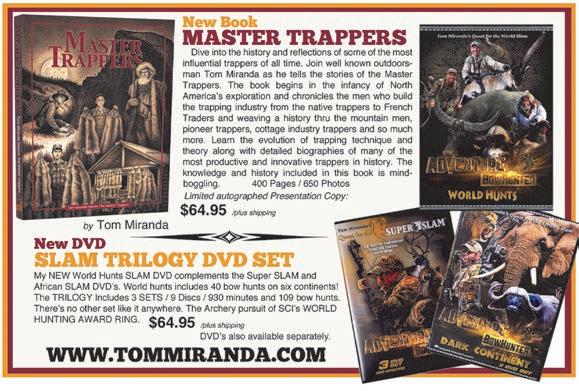
sheep are currently acceptable for entry from certain parts of California, Nevada, Utah, Arizona, New Mexico, Colorado, West Texas, and select free-ranging herds in Mexico including Carmen and Tiburon Islands. Bighorn sheep are found and acceptable for entry from most western states other than California which only has huntable populations of Desert sheep. Numerous bighorn sheep transplants of both Rocky Mountain and California bighorns have been made in the western states; some have been spectacularly successful in restoring sheep to ancestral ranges. In some cases, extremely high scoring trophies have come from these transplanted animals or their progeny.
These transplants have resulted in problems for records keeping in the case of the restoration of the so-called California bighorn, which has flourished in natural populations only from central and southcentral British Columbia. This subspecies originally ranged from extreme northeastern California through eastern Oregon, into eastern and central Washington, extreme southwestern Idaho, and northward into central British Columbia. Successful transplants from British Columbia have now been made into North Dakota (where the now-extinct Audubon’s sheep originally occurred) as well as many other areas within the original range of the subspecies. Currently, a few California bighorns are recorded in the listing for bighorn sheep, and these specimens are largely from native animals taken in British Columbia. Since it appears that California bighorns do not have horns as large as those from the Rocky Mountains, there have naturally been requests to establish a new trophy category for such animals. For now, they are only acceptable for entry in the bighorn sheep category for records-keeping purposes as few transplanted herds are comprised completely of California bighorns.

2024 Spring continued 32
B&C AWARDS B&C ALL-TIME P&Y Bighorn Sheep 175 180 140
165 168120
Desert Sheep

 Figure 6
Figure 6
Spring 2024 33
Records-keeping boundaries for Rocky Mountain bighorn sheep (blue) and Desert sheep (tan). Updated January 2023.
Big Game Species Profile
By Mike Schlegel


Desert Bighorn Sheep
2024 Spring
34
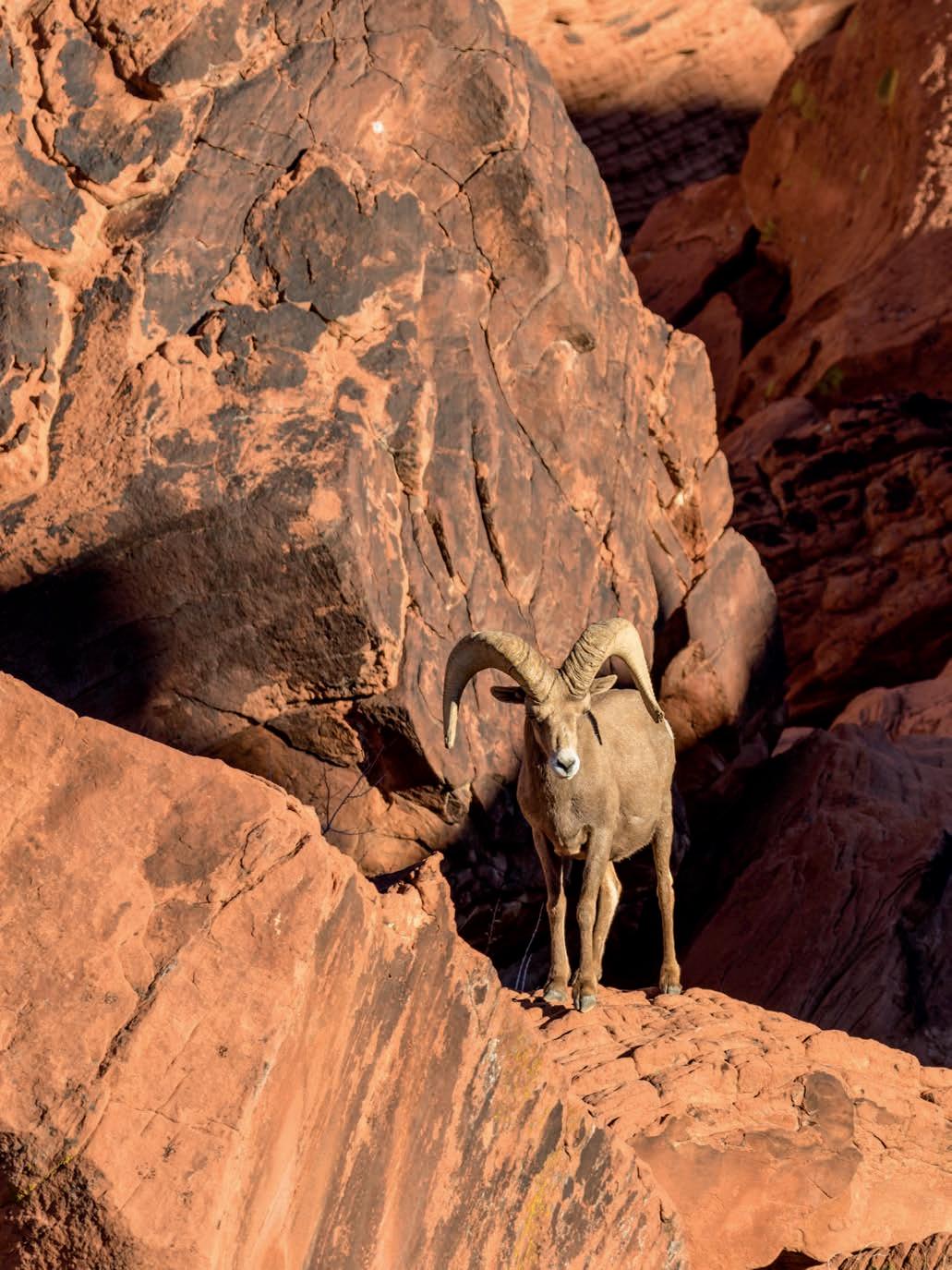

Spring 2024 35

Big Game Species Profile Desert Bighorn Sheep
Scientific Classification
Order: Artiodactyla - even-toed hoofed animals
Family: Bovidae – includes buffalo, cattle, sheep, goats
Subfamily: Caprinae - goats, sheep
Genus: Ovis - includes sheep, mouflons, urial, argali, bighorn, thin horns snow sheep
Species: Ovis canadensis
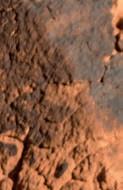

Subspecies: Ovis canadensis nelsoni
The subspecies name commemorates American naturalist Edward William Nelson (1855–1934). The Desert bighorn sheep is the state mammal of Nevada.
Distribution
The Desert bighorn sheep is a subspecies of bighorn sheep, Ovis canadensis, native to the desert regions of the southwestern United States. Specifically, they are found in Arizona, California,
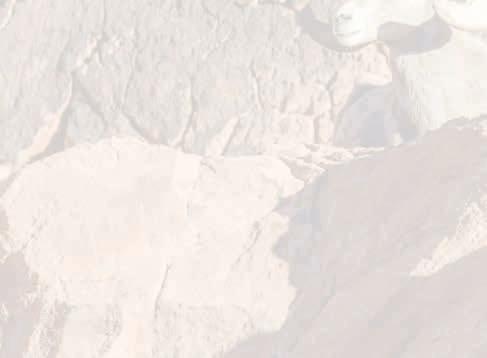
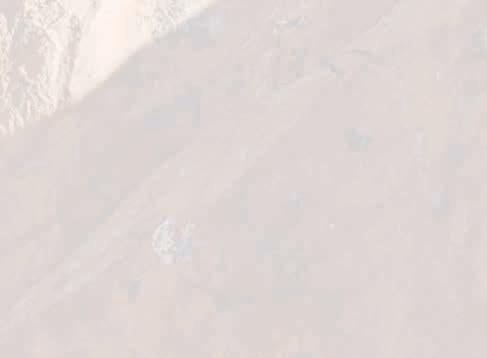


Colorado, Nevada, New Mexico, Texas, and Utah, as well as in northwestern Mexico. Due to concern about declining numbers of Desert bighorns, President Roosevelt, in 1939, signed a proclamation creating the Cabeza Prieta and the Kofa National Wildlife refuges in Arizona. The San Andres National Wildlife Refuge in New Mexico was established in 1941 (Figure 1). Unfortunately, a map showing distribution in Mexico is not available.
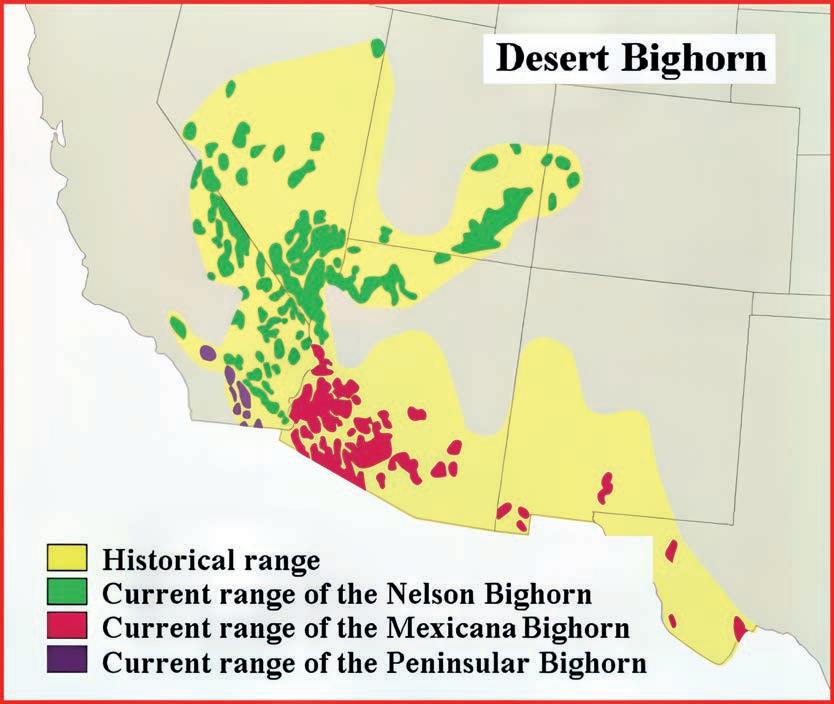


2024 Spring continued 36
Historical Desert bighorn range.
FIGURE 1

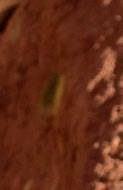

RamRamPercent
State PopulationTagsHarvestSuccess
AZ5,60012011798%
CA5,00030No Data
CO500151493%
NV8,20029423179%
NM1,1482828100%
TX78510No Data
UT3,00980 75 94%
Total 24,242 577 46581%
By Decade
DecadeNumberPercent
1970-19791‹1
1980-19892211%
1990-19992312%
2000-20094825%
2010-201979 41%
2020-20232010%
Total 193

Spring 2024 37
Table 1. 2022 Desert Bighorn Sheep Population Estimates
Table 2. Entries
Statistics
Big Game Species Profile Desert Bighorn Sheep


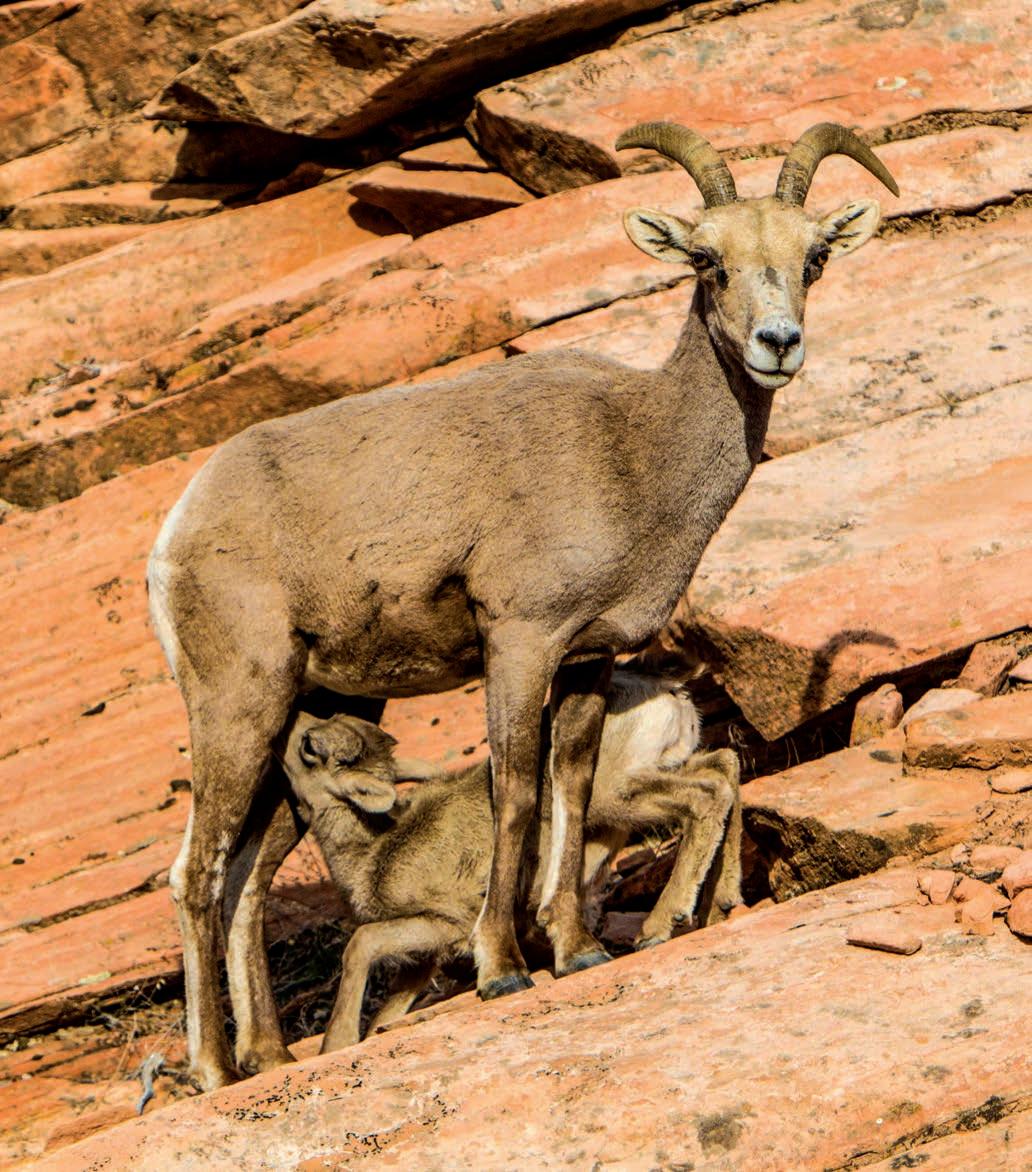
120 0/8 - 129 7/874%22%
130 0/8 - 139 7/852%11%
140 0/8 - 149 7/83015%911%
150 0/8 - 159 7/86433% 24 30%
160 0/8 - 169 7/84825%1823%
170 0/8 - 179 7/83217%19 24%
193 80
Carmen Island, MEX60
Sonora, MEX23
Mohave Co., AZ16
Nye Co., NV12
Maricopa Co., AZ11
Clark Co., NV10
Yuma Co., AZ9
Graham Co. AZ8
Tiburon, MEX5
Baja, MEX 5

2024 Spring continued 38
%
10%
ScoreAll-TimeTimeYears10
Table 3. Entries By Score
AllLast
Last
Years
————————————————————————— Total
180+ 74%79%
LocationNumber
Table 4. Top Ten
Locations All-Time
Statistics


The decline of Desert bighorn populations is attributed to competition with livestock, diseases contracted from livestock, overhunting, and human-caused habitat changes. Desert bighorn populations are estimated to be between 6,700 and 8,100 by the 1960s. Thanks to conservation measures to protect habitat, populations are increasing.
Physical Description

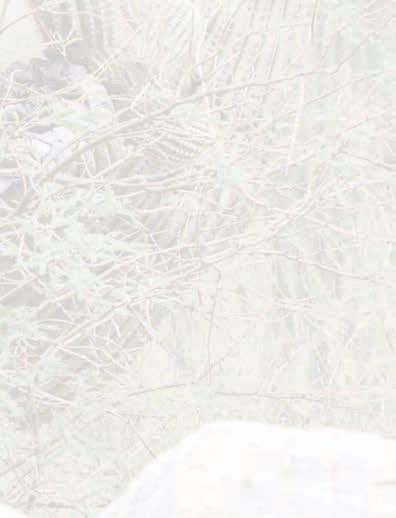

Desert bighorns are somewhat smaller than Rocky Mountain bighorns. Mature ram weight ranges between 150 and 175, whereas adult females average about 100 pounds. As with all bighorns, both sexes have horns. Desert ram horns are generally somewhat smaller than Rocky Mountain rams. However, the horns of the Desert bighorn ewe are generally longer than the ewes of the Rocky Mountain and California bighorns. Their coat is a light-colored gray/brown with white coloration around the nose and belly.
Desert Adaptations
Desert bighorn sheep are well-adapted for surviving the desert summer heat and cold winters. They are unique in that their body temperature can fluctuate several degrees. Although they require freestanding water, they can survive extended periods without water, providing body moisture from food sources. Also, they have unique hooves that are concave, enabling them to traverse the rocky desert habitats.
Diet
All wild sheep species are ruminants with a 4-chambered stomach within

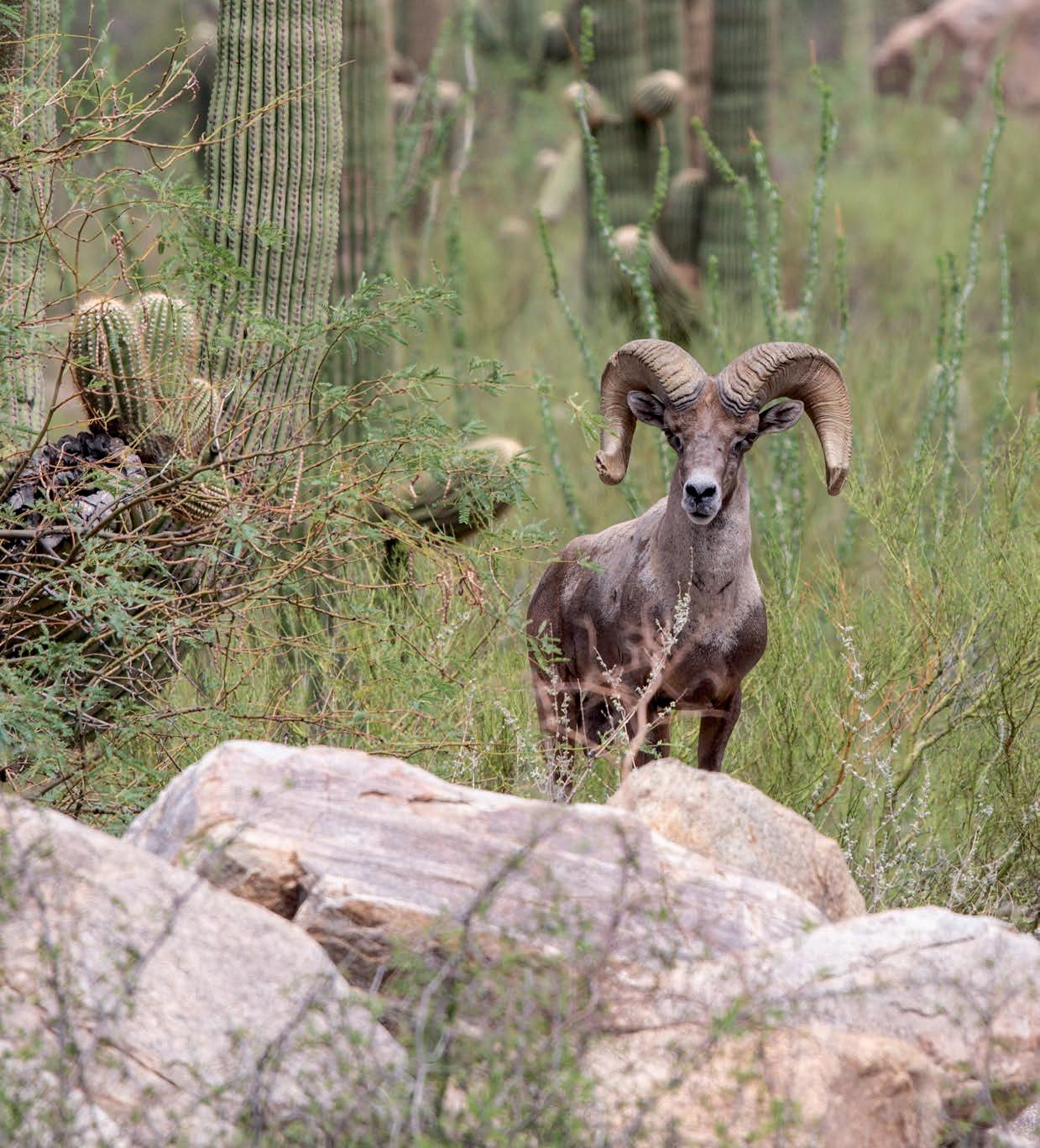

Top Locations Last Ten Years
LocationNumber
Camen Island, MEX22
Sonora, MEX18
Maricopa Co., AZ4
Yuma Co., AZ3
Mohave Co., AZ2
Nye Co., NV2
Pima Co. AZ2
Baja, MEX2
Coahuila, MEX2

Spring 2024 39
Table 5.
Statistics

Big Game Species Profile Desert Bighorn Sheep

which bacteria and protozoa digest their food. The favored food sources vary by seasonal availability and geographic location. As herbivores, the diet of Desert bighorn sheep is comprised mainly of grasses. However, forbs, shrubs, and cacti are also eaten. It is estimated that they process up to three pounds of forage daily. Also, Desert sheep usually are within 1-3 miles of a water source during the hot summer months.
Life History
Desert bighorn sheep, as with all wild sheep species, are social animals. Herd size, sex, age composition, and size vary seasonally. Spring, summer, and early fall herds are primarily ewes, lambs, and young rams. During this time, ram groups are off by themselves. Herd size is greatest during the winter
and spring months.
The life expectancy for ewes is 10-14 years and rams 9-12 years. Ewes first breed when 2 ½ years old, and rams are sexually mature when yearlings; however, dominancy with rams normally prevents younger rams from breeding ewes. The rut, or breeding season for Desert sheep is earlier than other species of bighorn sheep, occurring from August through November. Both the rut and lambing period occur over a longer time than other species of bighorn sheep.



It is common for pregnant ewes to isolate themselves to give birth. A single lamb is the norm; however, twins have been documented. Newborn lambs weigh 8-10 pounds and are precocial, meaning they are very mobile within an hour or so after birth. The number of

lambs born per year and lamb survival greatly depends on the quantity and quality of the ewes’ food sources, which in turn is dependent upon regional rain patterns. Lambs stay with their mother, learning seasonal movement patterns and social behavior.
Population Status
The major limiting factors regulating Desert bighorn sheep populations are competition for limited resources with other animals, both wild and domestic, the quantity and quality of habitat, habitat fragmentation, disease, and predation.
Habitat is the cornerstone for all wildlife. Due to the harsh and somewhat specialized habitats Desert bighorn sheep inhabit, their population size and distribution are subject
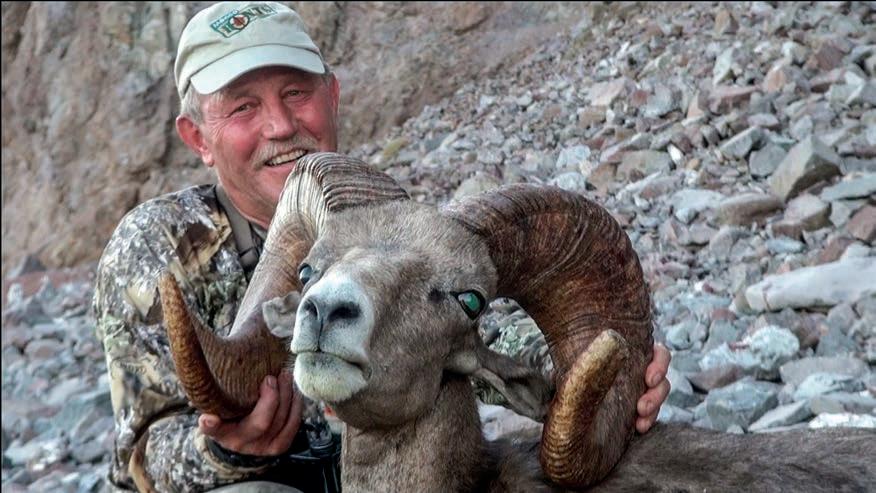



2024 Spring continued 40
Ron Sherer with his Carman Island ram.


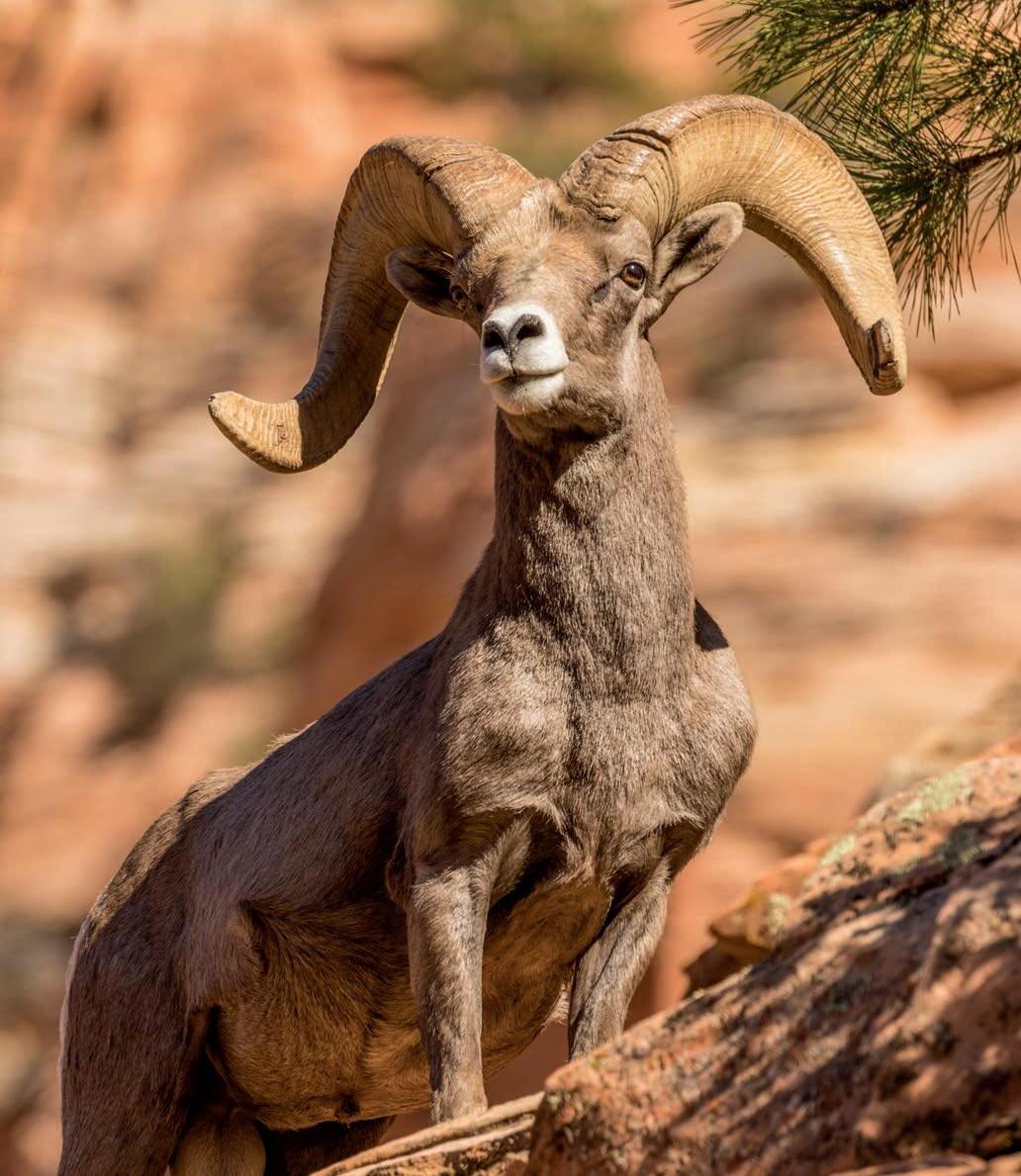
ScoreLoction
Date HunterOutfitter/Guide
186 4/8Maricopa County, AZ11/24/15Tony Lynn LoopSam Dieringer
185 6/8Sonora, MEX1/4/21Thomas Lee MuzaAmigos Guides and Outfitters
184 3/8Pima County, AZ11/17/17Daniel Hicks
183 4/8Sonora, MEX10/15/21Ricardo, LongoriaVicente Cazares
183Sonora, MEX11/30/19Jason A. Bryan
180 6/8Sonora, MEX3/1/21William TittlePancho Arce
180Graham County, AZ12/1/18Mariah Hinton-Pinedo
179 3/8Sonora, MEX1/31/20Timothy VanceShane Palister
179 3/8Tiburon Island, MEX1/8/13Brian BenyoJonas Guinn
178 6/8Hidalgo County, NM11/1/07Jim HensChris Harlow

Spring 2024 41
Table 6. Top 10 All-Time Scores
Statistics

Big Game Species Profile Desert Bighorn Sheep
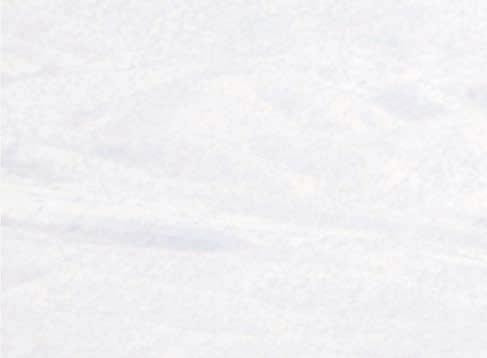
to fluctuations. Weather plays a significant role in the availability of the quantity and quality of forage and water availability. Human activity can also negatively impact key commercial and recreational habitat components. Wildfires benefit the bighorn sheep's habitat, but, unfortunately, wildfires are detrimental to other desert species, such as sage grouse.
Competition for forage and water with other species, specifically domestic livestock (cattle, sheep, and goats), feral burros, and horses, can be a significant limiting factor. Access to


the documentary “Out of Balance - The West's Wild Horses” is provided in the reference section. This documentary portrays the issue of unregulated wild horses on public lands in western states.
Respiratory disease is the most limiting factor regarding population numbers and distribution of Desert bighorns. As with Rocky Mountain bighorns, Desert bighorn sheep are very susceptible to Mycoplasma ovipneumoniae (Movi), transmitted by direct contact from domestic sheep and goats to wild sheep. Management programs are in place to prevent direct contact

between the species. This disease issue has been fully explained in previous bighorn sheep profiles in the Ethic. Also, the Pope and Young Club has contributed financially to fund management and research projects regarding this disease issue. All bighorn sheep species are susceptible to a variety of diseases and parasites. However, Movi is the most significant limiting factor in Rocky Mountain and Desert bighorn sheep populations.
Various predators prey on Desert bighorn sheep, including mountain lions, coyotes, bobcats, and golden eagles.
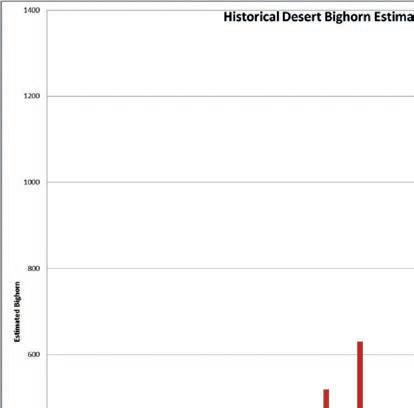



Desert Bighorn Sheep
Translocation
Success After Mountain Lion Control.
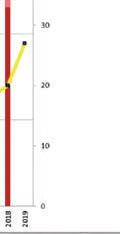

2024 Spring continued
42
FIGURE 2


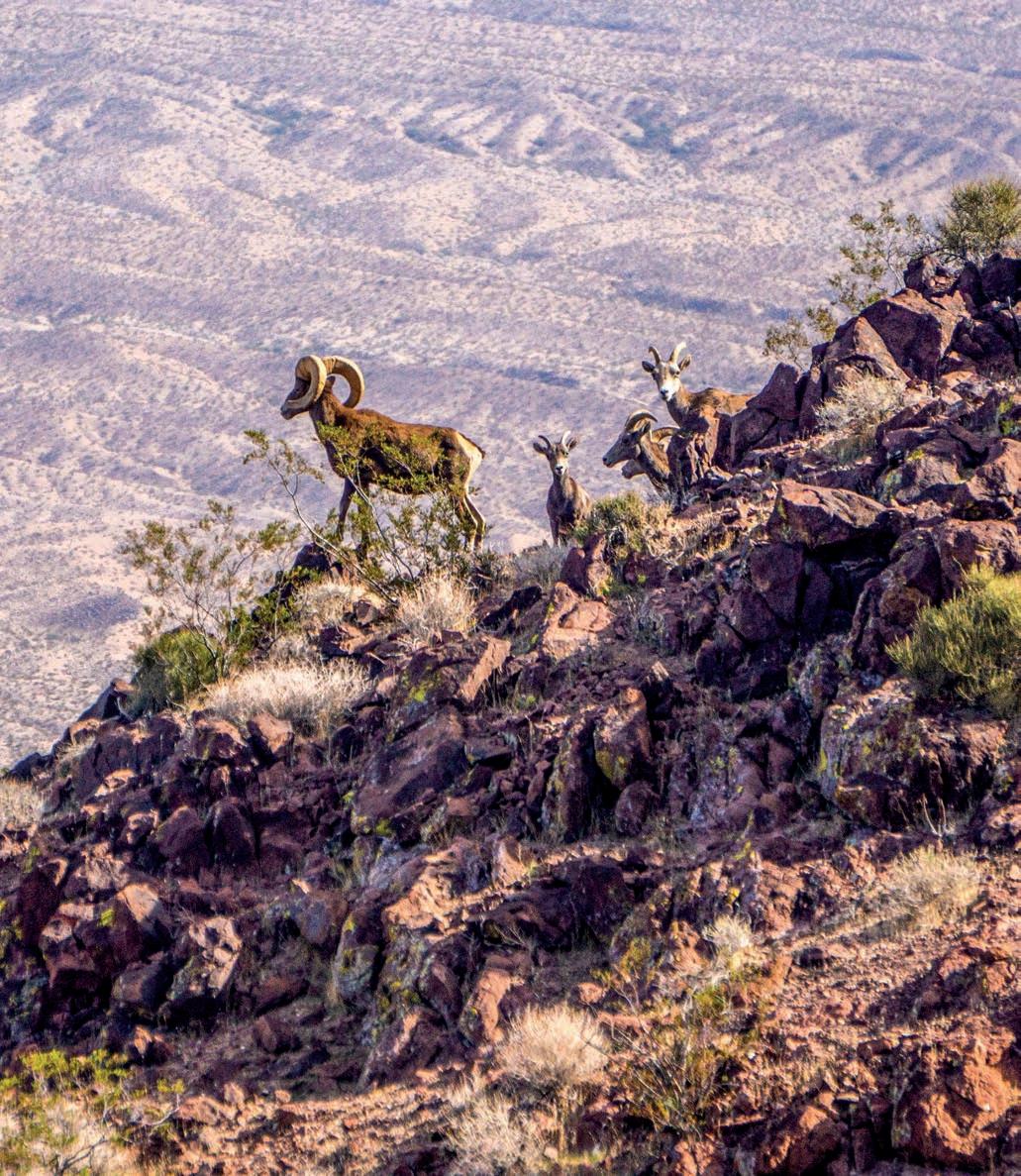
ScoreLoction
Last
Date HunterOutfitter/Guide
186 4/8Maricopa County, AZ11/24/15Tony Lynn LoopSam Dieringer
185 6/8Sonora, MEX1/4/21Thomas Lee MuzaAmigos Guides and Outfitters
184 3/8Pima County, AZ11/17/17Daniel Hicks
183 4/8Sonora, MEX10/15/21Ricardo LongoriaVicente Cazares
183Sonora, MEX11/30/19Jason A. Bryan
180 6/8Sonora, MEX3/1/21William TittlePancho Arce
180Graham County, AZ12/1/18Mariah Hinton-Pinedo
179 3/8Sonora, MEX1/31/20Timothy VanceShane Palister
179 3/8Tiburon Island, MEX1/8/13Brian BenyoJonas Guinn
176 3/8Caborcason, MEX2/28/19Ray AderholtMartin Leon

Spring 2024 43
Table 7. Top 10 Scores
10 Years
Statistics
Big Game Species Profile Desert Bighorn Sheep



However, mountain lions are by far the most significant. Limited water sources make Desert bighorns more susceptible to predation than other species of bighorn sheep. In New Mexico, between 1980 and 2001 the statewide Desert bighorn sheep population varied between 75 and 300, despite translocating 249 bighorns. An intensive mountain lion program was initiated in 2001. Mountain lions were removed before and after bighorns were relocated into a new area, When this program began, the statewide population was estimated at 175. Between 2001 and 2013, a total of 236 bighorns were translocated, and by 2013, the statewide population was nearly 800 (Figure 2)
Table 1 displays the most recent Desert bighorn population estimated in the western states. There is no data from Mexico regarding population status or harvest.
Bowhunting Desert Bighorn Sheep
shade up to rehydrate. This paid double benefits as while shaded up; we spotted the ram he shot later in the day.
Club Records
Currently, there are a total of 193 Desert bighorn sheep, 80 (41%) of which have been recorded during the past ten years. Table 2 shows the total number of entries by decade, 51% since 2010. The total entries by score, all-time, and last ten years are shown in Table 3. The percentage scoring 160+ for all-time is 46%, whereas during the last ten years, 56% are 160+. The top ten locations, all-time, are displayed in Table 4. These ten locations account for 82% of the total entries. The top ten locations during the last ten years (Table 5) account for 71% of the 80 entries. The top ten scores all-time and the top ten in the last ten years are shown in Tables 6 and 7. As you see, nine of the top ten, all-time, were taken during the last ten years.


Hunting techniques for Desert bighorns are no different than any other mountain-dwelling big game. Spot and stalk is the foremost technique, with emphasis on the spotting. These sheep blend into their environment very well and are easily missed. With few exceptions, a guide will be required. Thus, they know the best places to hunt and the sheep's movement patterns. A blind setup at water sources is also effective.
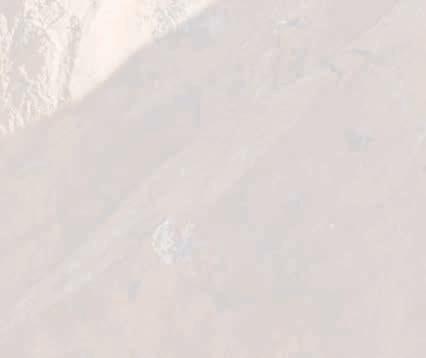
A common issue when hunting Desert bighorns is hot, dry hunting conditions. I accompanied Ron Sherer during his Carman Island hunt. We both consider ourselves ‘fit’ hunters. However, by noon on the first day, we needed to



References
www.ndow.org/species/desert-bighorn-sheep
https://en.wikipedia.org/wiki/Desert_bighorn_sheep
https://www.ndow.org/species/desert-bighorn-sheep/# https://bighorn.org/about-bighorns/#desertz
https://www.usgs.gov/centers/werc/science/ ecology-and-conservation-desert-bighorn-sheep
https://ielc.libguides.com/sdzg/factsheets/bighornsheep/reproduction
https://wafwa.org/wp-content/uploads/2023/08/2022Rangewide-Status-of-Wild-Sheep-FINAL_APPROVED.pdf
https://www.google.com/search?client=firefox-b-1-d& q=movie+documenting+wild+horse+damage#cobssid= s&fpstate=ive&vld=cid:d9802ab5,vid:4OJ5nMfo4UU,st:0 https://www.fws.gov/sites/default/files/documents/ HartMt_BHS_EIS_Record_of_Decision_FINAL_20220107_ Signed.pdf
http://media.nwsgc.org/proceedings/MWSGC-2010/ Foster%20&%20Whittaker%202012,%20129-137.pdf



2024 Spring continued 44




Spring 2024 45

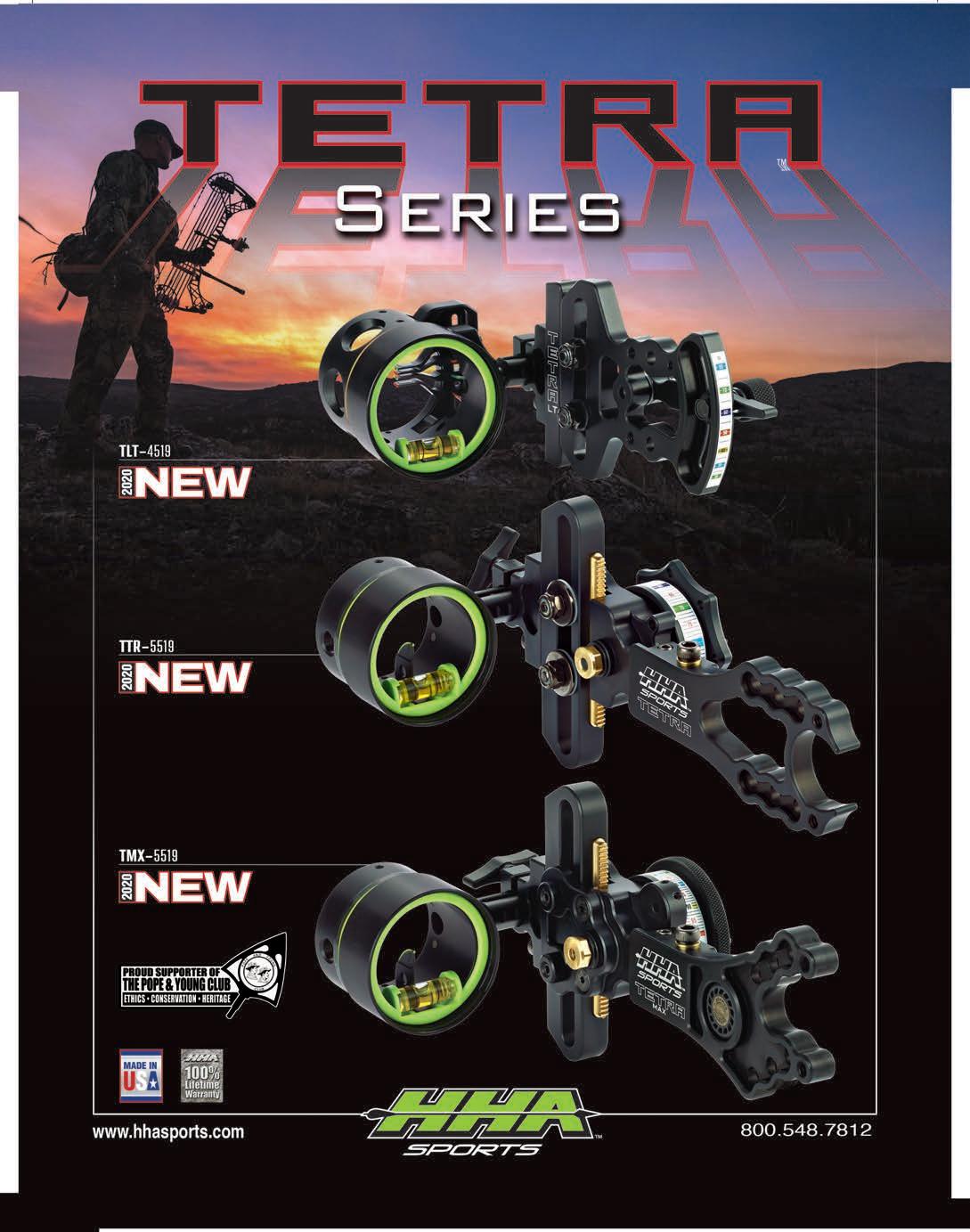
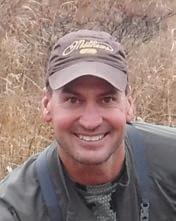

Noska’s Notes
By Frank Noska
Double Bull Deserts
Bowhunting Desert sheep is one of the most coveted North American big game hunts a bowhunter can check off their bucket list. Back in 2007, I had worked hard and squirreled away enough money to go on my first Desert sheep bow hunt. This first hunt was on Carmen Island in Mexico. Then in 2018, I found a great place on the mainland, in Sonora, Mexico, and bowhunted Desert sheep a second time. The following year, I helped a friend get his archery Desert on the same ranch, then had the opportunity to hunt another one for myself.

1st Double Bull Desert, The Ol’ Two Star Ram, 2007

While attending the Sheep Show in Reno in 2006, I decided to book my first Desert sheep hunt. Landing in Loreto, Mexico, I remember many things about this adventure. Carmen Island had not yet become the popular spot for bowhunters, as it later would evolve into. As I deplaned, people were there to greet and transport me from the airport to a boat. They used the boat to get over to the island from the mainland. Sergio, the guy in charge of Carmen Island sheep hunts, called my driver on the phone before we ever got out of the

airport terminal. When the driver handed the phone over to me, Sergio asked me if I had all my gear, if I needed anything, and just basically how I felt and if I was excited. That simple call and attentiveness I have never forgotten. He is a friend to this day.
Cruising up to the shoreline in front of the Carmen Island sheep camp via the small motorboat, I was greeted by more helpful and attentive people. I felt more like a special dignitary than a sheep bowhunter when I was shown the house and accommodations that would be all mine during this hunt. It’s strange how sometimes you


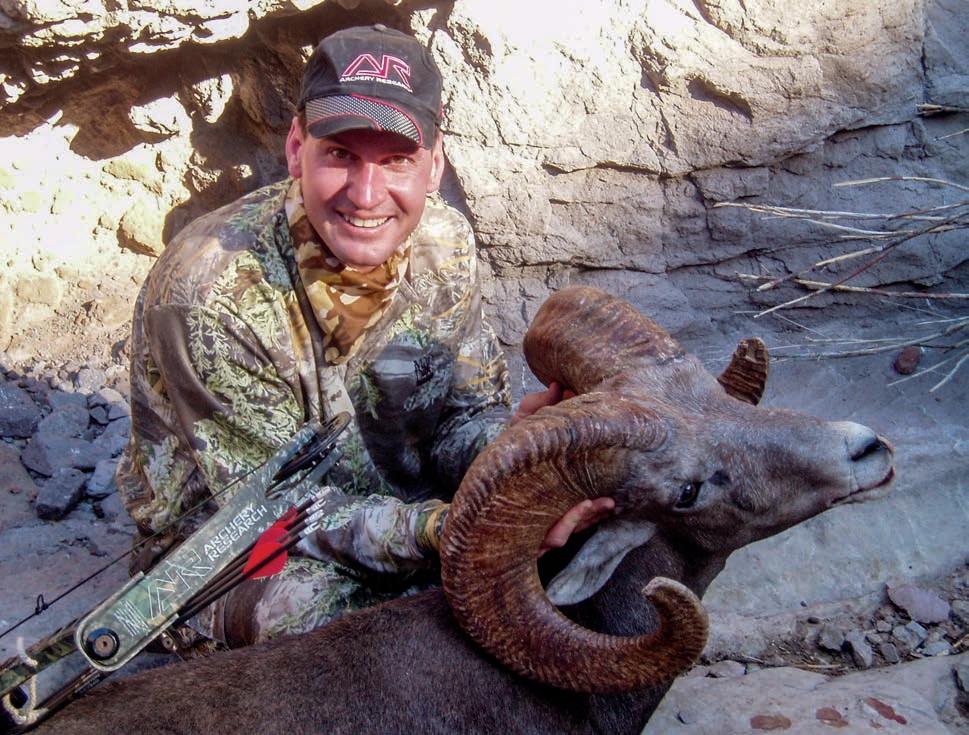


48
2024 Spring
The author, with his first Desert sheep scoring 154 4/8.

can remember even the smallest details. I remember that just about every toiletry a person would need was there in new and unopened packages in a nice big bathroom. I had brought everything I needed, but there were new toothbrushes, toothpaste, razors, shaving cream, deodorant, etc., in case a hunter forgot them. My first Desert sheep hunt was off to a good start. The next morning, we took the boat to one spot on the island with a freshwater source. The sheep were regularly using this fresh water. We had a good day of hunting and did spot some sheep at long distances, but no close opportunities materialized. The next day we found another freshwater source. Some large rocks had fallen together to create a small place that naturally collected and kept water from any rain. The many sheep trails that led to this water made it apparent that several sheep were using it. After discussing the best options, I agreed that sitting and waiting for a ram to come to the water was a good plan. My guides brought in a Double Bull blind, and we quickly set it up on the only flat spot in proximity to the water. It was a perfect 20 yards from the water. Getting into the blind, I had a good feeling.



After waiting a few hours, I heard some small rocks rolling down nearby. It wasn’t long, and a nice ram materialized above the waterhole. At first glance, I knew I would be happy to harvest this ram. The ram was cautious and surveyed the area all around the water hole. When he was satisfied that it was safe, he started making his way down towards the water. When he was broadside at 20 yards, I took my shot; the first shot I should clarify. The arrow flew way low and completely missed. The ram jumped and was startled when the arrow hit the rocks behind him, but he relaxed and settled down rather quickly. The ram approached the water hole








49 Spring 2024
My best Desert sheep to date, scoring 170 1/8.
Frank “Two Star” Noska!
Noska’s Notes

again to try and get a drink. I shot a second time. Once again, my arrow shot way low and missed the ram. Now, the ram jumped and ran up above the water. He was nervous and really rattled now, trying to figure out what had just happened. Inside the blind, I was rattled myself, but slowly took out a third arrow and nocked it. From observing how my first two arrows had flown, I assumed that my bow sight was off or my bow was out of tune somehow. I figured I had to aim about a foot high to compensate and hit where I wanted. As I was about to draw and shoot this third arrow, I noticed at the bottom of the shooting window fabric where my first two shots had hit. I had shot the blind twice! Admitting that there was likely a high level of excitement






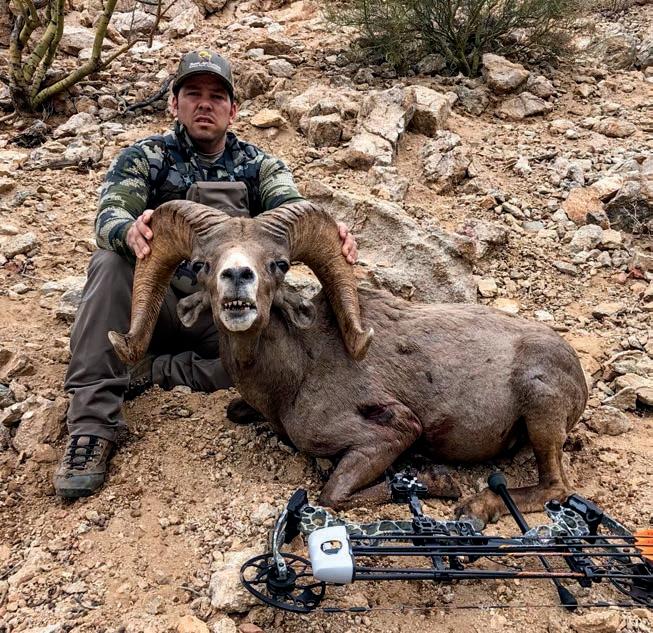
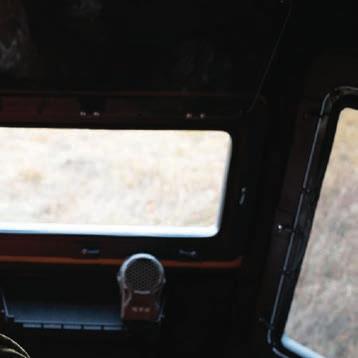
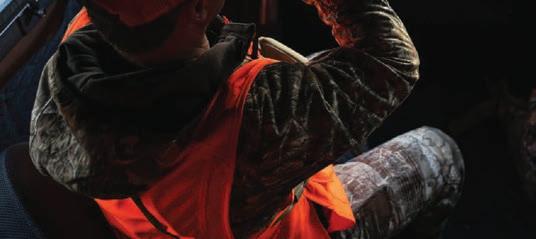



Every square inch of the rotomolded GRIZZLY® HUNTING BLIND has been thought through, optimally designed, manufactured, and lived. You won’t find a hunting blind that’s more hunter-friendly, solidly constructed, feature-rich, and deadly quiet. Learn more at grizzlycoolers.com
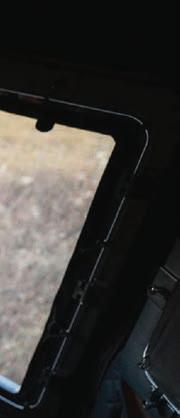


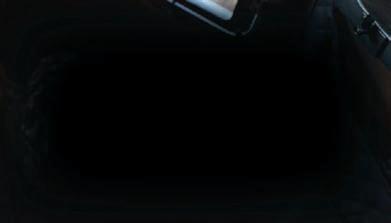

50
ADVENTURE GUARANTEED. FOR
LIFETIME. 2024 Spring
THE HUNTING BLIND
A
continued
Jeremy Foster, with his first Desert sheep.

and a dose of “ram fever” would be appropriate to confess at this time. Drawing my bow for the third shot, I adjusted my body position higher in the blind to ensure my arrow would not hit the fabric of the blind. This arrow hit the exact spot I was aiming at and passed through the ram’s lungs. He only went about thirty yards and was down. The third time was a charm! The level of luck I had with me that day that allowed three shots at the same ram was off the charts! My first Desert sheep scored 154 4/8”. About three weeks later, the Pope and Young biennial convention was held in Lancaster, PA. My good friend Tony Mudd had heard about my Double Bull blind shooting performance in Mexico. He surprised me with a “Double Hole Blinds, Outstanding




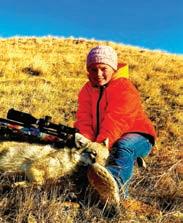







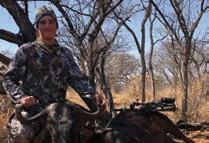
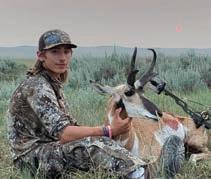













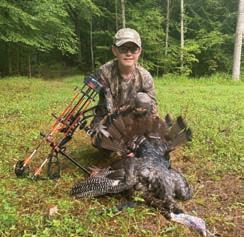















51
HUNTING IS CONSERVATION For more information on S3DA: visit www.S3DA.org or Email: infos3darchery@gmail.com Spring 2024
The author with his third Desert sheep scoring 160 2/8.
Noska’s Notes

Achievement Award” framed certificate he created and coined me Frank “Two Star” Noska! We got a lot of laughs outa that.
2nd Double Bull Desert, Birthday Ram, 2018
In 2018, I discovered what I think is probably the best place to bowhunt Desert sheep in Sonora. On that hunt, I once again hunted out of the comfort of a Double Bull blind. This blind was placed in a perfect location and within bow range of the only water around. My mind was set on a good ram we had spotted early in the hunt, far up on top of a nearby mountain. I sat in that blind for a few days, seeing several sheep and even passing some lesser rams, waiting



on this big one to come into bow range. Finally, the patience paid off, and my best Desert sheep to date, a 170 1/8”, came into bow range on my birthday, March 7, 2018.
3rd Double Bull Desert, Doubled on Deserts, 2019
In 2019, I helped my friend, Jeremy Foster, arrow his first Desert on the same ranch I hunted in 2018. And you guessed it; he also shot his ram from a Double Bull blind as well. After taking pictures and celebrating Jeremy’s great Desert sheep, the ranch informed me that it had an extra sheep tag. I couldn’t resist trying for another Desert, so I purchased that hunt. A couple of days later, on March 9, 2019, my third Desert sheep was
shot from the same blind that Jeremy used.
It is not a secret that I spend an enormous amount of time hunting out of “pop-up” blinds. Most of this time is in Sonora, Mexico, for Coues deer, where I hunt at least 30 days or more a year out of blinds. It is not for everyone, I understand, spending that much time confined in a small blind. The effectiveness of bowhunting out of well-placed blinds is why I endure and enjoy it. It is, for sure, a deadly method of bowhunting. Having tagged my first three desert sheep out of blinds, maybe I will try to change it up and hunt my next one by stalking like I hunt Dall sheep back home in Alaska. There are no guarantees, though, because I do love my blind hunting!

















52
continued 2024 Spring Save The Date Pope & Young Bowhunters Bash April 6th: Ogden, UT May 18th: Alexandria, MN Raffles Auctions Giveaways Food Entertainment Learn More: www.pope-young.org

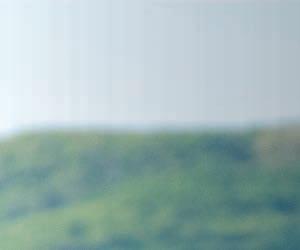
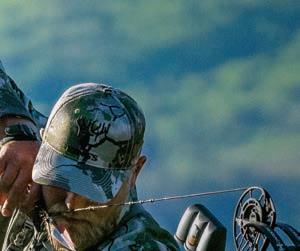
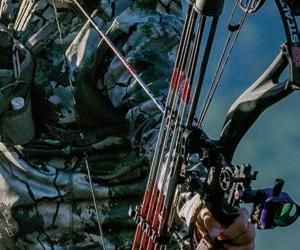
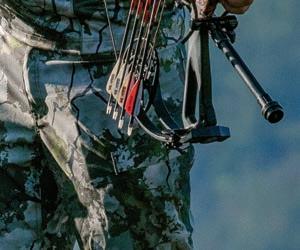
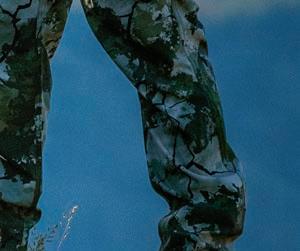
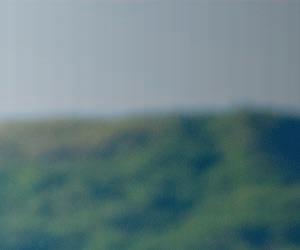
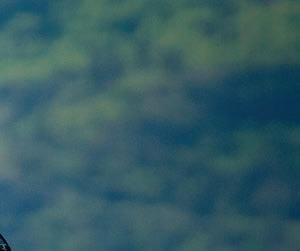
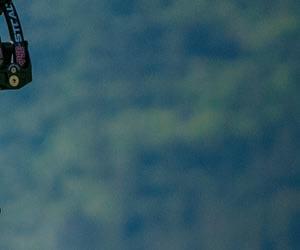




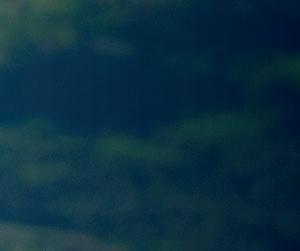

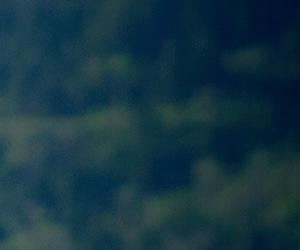
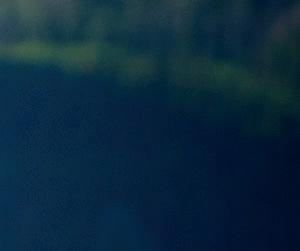


CLOTHING & GEAR FOR WHEN, WHERE, AND HOW YOU HUNT. Kings leads the way in hunter-designed, high-tech, proprietary patterns that blend into terrains from the desert plains to the snowy peaks. No matter the season, the weather, or where you hunt, Kings keeps you concealed. kingscamo.com
34 th Recording Period Partial Listing

BLACK BEAR
WORLD RECORD 23 5/16 SCOREHUNTER/OUTFITTER
AREA/ST/PROV DATEMEASURER
21 4/16Russell Richardson Gila County, AZ8/11/2022D. Richardson
21 1/16Dan Thomson Smokey Lake, ALB5/13/2023D. Powell
20 15/16Eric Burkhart Lake Manitoba Narrows, MAN 5/23/2023S. Holman
20 12/16Garth Michael Vandenberghe Brandon, MAN5/25/2023S. Holman
20 5/16Olen Jones Jr Gilmer County, WV11/8/2022T. Dowdy
20 2/16Jeff Lorenz Bjork Lake, SAS5/23/2022P. McKenzie
20 1/16Derek B. Staten Monroe County, WV10/29/2015T. Dowdy
19 13/16Cody Gilbert Nelson / Flatliner OutfittersRoutt County, CO9/10/2023B. Dalzell
19 12/16Brian Burkeland Stratton, ONT6/6/2019S. Zirbel
19 12/16TJ Stokes / Emily Plihal Guiding and OutfittingNorthern Sunrise, ALB5/19/2022K. Sanford
19 10/16Christopher Neuman Cordova, AK5/15/2014J. Spillers
19 9/16Daniel Ehntholt Washington County, NY10/27/2022R. Johndrow
19 6/16Jerry Sellers
Inwood, MAN5/24/2023P. Parcher
19 5/16Toby Donald Strider / Smoothstone Lake LodgeSmoothstone Lake, SAS5/31/2023J. Pope, Jr.
19 4/16Jason Gourde Monts Valin, QUE6/15/2023R. Groleau
19 2/16Calvin R. Davis
Lynn Lake, MAN6/12/2023C. Rotering
19 1/16Brad Sparks Prince of Wales-Hyder, AK5/6/2023T. Embry
18 15/16Matthew Lee Fitzgerald Glacier County, MT9/15/2021T. Rozewski
18 15/16Madeline Denise Strider / Smoothstone Lake LodgeSmoothstone Lake, SAS5/30/2023J. Pope, Jr.
18 13/16Jay Hettinger Batty Lake, MAN6/6/2023J. Zins
18 11/16Olivia Hettinger Welton Lake, MAN6/6/2023J. Zins
18 10/16Sylvain Caron Polar Lake, NBW6/21/2021L. Soucy
18 9/16Austin Anselmi / Wildwood OutfittersMystery Lake, MAN5/22/2023J. Harmon
18 7/16Don Schleicher Aitkin County, MN9/1/2007D. Brandenburger
18 6/16William Kyle Shaffer / Borderline Guide ServiceAroostook County, ME8/28/2019L. Streiff
18 6/16Yannick Leclerc
Abitibi-Témiscamingue, QUE 6/26/2023M. Jerome
18 5/16Timothy Fisk Rossburn Municipality, MAN 5/23/2023S. Holman
18 3/16Armen Papazyan Wondering River, ALB5/12/2022C. Dillabough
18 2/16Matt Hentrick / Emile Burnouf Cluff Lake, SAS6/6/2022M. Olson
18 2/16Nathan Andersohn / Stan Parkerson 7 Mile Creek, AK6/22/2023S. Parkerson
18 1/16Caleb M. Latteier Anchorage, AK6/18/2020T. Embry
GRIZZLY BEAR
WORLD RECORD 27 1/16
23 14/16James Ethan Harbison Coldfoot, AK9/16/2023P. Nelson
POLAR BEAR
WORLD RECORD 26 10/16 SCOREHUNTER/OUTFITTER
20 4/16Frank S. Noska IV / Beaufort Sea AdventuresCape Brown, NWT4/18/2023R. Ratz
COUGAR
SCOREHUNTER/OUTFITTER
WORLD RECORD 16 1/16
AREA/ST/PROV DATEMEASURER
15 7/16Fynn Ryley Harris / Old North Trail Outfitters IncBrazeau, ALB12/7/2022D. Loosemore
14 3/16Tim Vance / Tracks and Trails Clearwater, ALB3/2/2023A. Hill
13 10/16Frank Bennett / NM Professional Big GameCatron County, NM1/3/2022M. Kronyak

BARREN GROUND CARIBOU WORLD RECORD 448 6/8
SCOREGROSSHUNTER/OUTFITTER AREA/ST/PROV DATEMEASURER
351 2/8366 0/8Dan Evenson Brooks Range, AK9/9/2023N. Muche

CENTRAL CANADA CARIBOU VELVET WORLD RECORD 384 4/8 SCOREGROSSHUNTER/OUTFITTER AREA/ST/PROV DATEMEASURER
311 0/8324 5/8Michael Haack / Lodge at Little DuckBaralzon Lake, NUN8/28/2023R. Mehling
WOODLAND CARIBOU WORLD RECORD 375 0/8
SCOREGROSSHUNTER/OUTFITTER AREA/ST/PROV DATEMEASURER
323 2/8333 3/8Michael Haack / RAYS Howley, NFL10/11/2023E. Stanosheck
TYPICAL COLUMBIAN BLACKTAIL DEERWORLD RECORD 172 2/8
SCOREGROSSHUNTER/OUTFITTER AREA/ST/PROV DATEMEASURER
98 0/8102 3/8Rick Popovitch Alameda County, CA8/31/2023M. Kronyak
TYPICAL COLUMBIAN BLACKTAIL DEER VELVET WORLD RECORD 148 5/8 SCOREGROSSHUNTER/OUTFITTER AREA/ST/PROV DATEMEASURER
135 3/8142 5/8Garret W. Hoppe Mendocino County, CA8/20/2022J. Onysko
116 5/8118 3/8Chuck Adams Mendocino County, CA7/18/2023R. Niziolek
112 4/8117 0/8Dennis Kerby Santa Cruz County, CA7/8/2023B. Watson
109 5/8112 3/8Chuck Adams Mendocino County, CA7/21/2023R. Niziolek
TYPICAL SITKA BLACKTAIL DEERWORLD RECORD 116 3/8 SCOREGROSSHUNTER/OUTFITTER AREA/ST/PROV DATEMEASURER
85 1/888 4/8David S. Benitz Bussy Creek, AK11/15/2021M. Nilsen
84 2/896 0/8David S. Benitz Prince of Wales Island, AK11/11/2015M. Nilsen
82 1/884 3/8David S. Benitz Le Conte Bay, AK11/13/2017M. Nilsen
81 7/887 3/8David S. Benitz Kupreanof Island, AK11/24/2016M. Nilsen
TYPICAL SITKA BLACKTAIL DEER VELVETWORLD RECORD 109 7/8 SCOREGROSSHUNTER/OUTFITTER AREA/ST/PROV DATEMEASURER
95 0/897 0/8Timothy Turner Kodiak, AK 8/1/2023J. Bradley
TYPICAL COUES’ DEER WORLD RECORD 130 1/8 SCOREGROSSHUNTER/OUTFITTER AREA/ST/PROV DATEMEASURER
109 6/8110 6/8Joseph L. Dungca Cochise County, AZ1/6/2021C. Sheley
81 4/883 2/8Kent Reierson Sonora, MEX1/26/2023C. Richardson
NON-TYPICAL COUES’ DEER WORLD RECORD 139 2/8 SCOREGROSSHUNTER/OUTFITTER AREA/ST/PROV DATEMEASURER
120 1/8121 5/8Zack Walton Sonora, MEX1/8/2023S. Godfrey
TYPICAL MULE DEER WORLD RECORD 205 6/8 SCOREGROSSHUNTER/OUTFITTER AREA/ST/PROV DATEMEASURER
186
Entries that have been accepted into the Records Program since the publication of the last quarterly journal. 2024 Spring 54
SCOREHUNTER/OUTFITTER AREA/ST/PROV
DATEMEASURER
AREA/ST/PROV DATEMEASURER
5/8197 1/8Dillon Haderlie Salt Lake County, UT11/29/2022S. Pyper 174 6/8178 1/8Stephen J. Shelton Jefferson County, CO11/11/2022B. Smith
6/8174 4/8Lance Robert Poole Moffat County, CO9/28/2023J. Knez 159 3/8180 4/8David Turner Rio Arriba County, NM9/13/2023E. Fanchin 156 0/8172 3/8M. Blake Patton County of 40 Mile, ALB9/7/2023R. Skinner 155 1/8180 4/8Chuck Adams Johnson County, WY9/18/2023R. Niziolek 154 0/8160 4/8Travis Aramenko Dirt Hills, SAS9/23/2021B. Deyo 153 7/8165 3/8Jonathan Sidney White Swift Current, SAS9/6/2021F. Hendrickson 152 0/8168 1/8Kip Fowler Salt Lake County, UT11/25/2022S. Pyper 149 3/8174 7/8Keith Pullins Pennington County, SD9/26/2023G. English
166
SKULLS ANTLERS

TYPICAL MULE DEER VELVET WORLD RECORD 218 2/8
SCOREGROSSHUNTER/OUTFITTER AREA/ST/PROV DATEMEASURER
201 1/8208 1/8Justin Rafuse Cadillac, SAS9/3/2023D. Pezderic
188 4/8191 5/8Dylan Goodluck San Juan County, NM9/5/2021D. Cowley
176 0/8186 4/8Nicholas Erickson Mohave County, AZ8/22/2022S. Cowles
175 5/8182 2/8Bridger Sanders Weber County, UT8/19/2023C. Mitton
154 4/8157 1/8Brent A. Webster Teller County, CO9/8/2023J. Fields II
154 0/8157 0/8Toby Donald Strider Carbon County, UT8/28/2023J. Pope, Jr.
153 4/8156 7/8Jude Dupre Mesa County, CO9/4/2023R. Steverson
151 5/8165 5/8Dustin P. Kline Elko County, NV8/17/2023G. Hernandez
148 5/8152 4/8Ryann Eugene Horton Tulare County, CA9/3/2023B. Watson
147 6/8162 2/8Trevor Embry / Paul PaulhamusTodd County, SD8/28/2023E. Fanchin
NON-TYPICAL
MULE DEER WORLD RECORD
291
181 0/8185 4/8Christopher Gallitelli Powder River County, MT9/22/2022R. Rauscher 179 2/8184 0/8Chuck Adams / Doyl ShippRosebud County, MT10/14/2023R. Niziolek
NON-TYPICAL MULE DEER VELVETWORLD RECORD
326 1/8
221 6/8227 0/8Michael Everett Miller Silver Valley, ALB8/28/2022R. Harris
209 5/8213 6/8Hunter Wood Mercer County, ND9/3/2023J. Zins
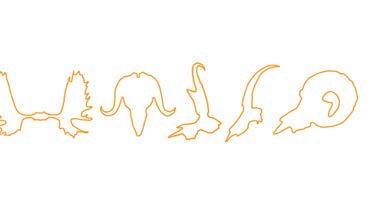
Hunter:


Conejos

TYPICAL WHITETAIL DEER CONTINUED WORLD RECORD 204 4/8 SCOREGROSSHUNTER/OUTFITTER AREA/ST/PROV DATEMEASURER
146 7/8151 7/8Kaleb Pfohl Grant County, WI11/14/2022B. Ihlenfeldt
146 5/8149 3/8Bill Watts Jr Berrien County, MI11/4/1987T. Fisk
146 4/8159 2/8Ethan Washburn Morrison, MAN10/28/2022J. Lunde
145 7/8148 7/8Alan J. Cusick Montgomery County, MD11/6/2018A. Gray
144 7/8155 7/8Gavin Kaufman Kewaunee County, WI10/30/2021B. Ihlenfeldt
144 5/8151 0/8Michael T. McReath Marquette County, WI10/5/2023J. Ramsey
144 3/8147 6/8Leon E. Steele Jr Jefferson County, NY9/27/2023M. Cooper
144 1/8149 1/8Ethan Comer Monroe County, KY10/8/2022C. Adams
172 7/8182 2/8Jared
170 3/8180
162 3/8171 3/8Ray Melom Smoky River, ALB10/30/2022B. Watson
161 0/8173 4/8Nicholas J. Buchheit Lincoln County, MO12/13/2019J. Detjen
158
Krueger
154 1/8157 5/8Sean Lynn Livingston County, NY10/29/2022W. Tyler
154 0/8167 1/8Russell Guthrie Vermilion County, IL10/21/2022D. Good
153 7/8172 3/8Larry Martell Buffalo County, WI10/27/1996K. Rimer
153 2/8158 7/8Cody Bell Ste. Genevieve County, MO10/8/2022D. Harris
152 7/8157 2/8Sy K. Graykowski Marathon County, WI10/31/2021T. Heil
152 4/8160 0/8Robert Meduna Phelps County, NE11/10/2021L. Meduna
152 3/8170 4/8Kyle Mohr Dixon County, NE10/15/2022G. Hempey
151 2/8158 4/8Paul Birinyi / Perry RossFord County, KS11/4/2022S. Smith
151 0/8161 5/8Matt Hentrick Meigs County, OH11/4/2022M. Olson
150 2/8158 5/8Dayton M. Dow Blackford County, IN10/9/2022T. Wright
149 7/8158 4/8Paul (Bo) C. Aughtry III Republic County, KS11/11/2022R. Ernst
149 0/8152 7/8Corey Norman Jackson County, OH9/25/2022M. Headen
149 0/8159 4/8Greg A. Miller Vernon County, WI9/24/2023S. Godfrey
148 6/8152 0/8Thomas Garrett Jewell County, KS11/5/2018T. Yaniko
148 2/8159 1/8Derek Charles Doane Wabasha County, MN11/7/2014C. Collins
148 0/8157 5/8Aric Bush Marquette County, WI10/16/2021A. Zuhlke
147 5/8153 7/8Jud Collett Pike County, IN11/4/2020R. Pflanz
147 3/8161 0/8Dave Page Sauk County, WI10/16/2022D. Peterson, Jr.
147 3/8153 6/8Joshua David Schlesser Plymouth County, IA11/14/2022J. Weltz
144 0/8152 1/8Jordan M. Gross Mercer County, OH11/12/2022W. Bellman
144 0/8146 6/8Alex D. Brauer Shawano County, WI10/14/2023T. Heil
143 7/8167 4/8Greg Collins Buffalo County, WI11/4/2010J. Squires
143 7/8165 5/8Jared Hook Dane County, WI10/26/2021D. Peterson, Jr.
143 4/8155 7/8Hunter L. Fetterhoff Grant County, IN11/11/2022J. Moore
143 4/8163 0/8Sarah I. Kvortek Allegheny County, PA9/23/2023S. Derugen
143 1/8156 0/8Kiefer L. Stiffler Clark County, IN10/8/2022S. Taylor
142 7/8157 7/8Arnold Crum Allamakee County, IA10/1/2023L. Miller
142 6/8165 2/8Matthew Doth Ramsey County, MN10/30/2020J. Olson
142 5/8154 5/8Mark Kissinger Appanoose County, IA11/4/2013S. Zirbel
142 5/8144 3/8Jacob Castleberry Cherokee County, GA10/27/2022S. Quinn
142 4/8146 7/8Douglas Lee Kessel Fillmore County, MN9/19/2020J. Kelly
142 2/8144 7/8Tyler Frisinger Barron County, WI10/4/2020D. O’Brien
141 7/8149 3/8Johnny R. Morris Washington County, IN11/2/2009S. Taylor
141 5/8155 7/8Jason Goebel Waushara County, WI10/21/2023M. Miller
140 5/8143 7/8Derek Charles Doane Wabasha County, MN11/4/2012C. Collins
140 4/8144 4/8David W. Temmen Maries County, MO10/16/2011L. Lueckenhoff
140 0/8143 1/8Jay Deones Winneshiek County, IA10/16/2023L. Streiff
139
139
139
139

Spring 2024 55
1/8 SCOREGROSSHUNTER/OUTFITTER AREA/ST/PROV DATEMEASURER
SCOREGROSSHUNTER/OUTFITTER AREA/ST/PROV DATEMEASURER
SCOREGROSSHUNTER/OUTFITTER
TYPICAL WHITETAIL DEER WORLD RECORD 204 4/8
AREA/ST/PROV DATEMEASURER
Kenner Logan County, KY9/25/2022W. Cooper
7/8Sheila
Trempealeau
Weisenberger
County, WI10/10/2023S. Godfrey
6/8Bradley J. Meunier Spencer
170 2/8172
County, IN11/1/2022R. Pflanz
Cecil
Knox
169 5/8185 4/8Steve Flanagan
County, MD11/11/1992J. Melvin 165 5/8168 6/8Scott Wilkins
County, IL11/13/2016S. Grabow
160 6/8180 3/8Jesse Wegner Fayette County, IA11/16/2017B. Dixon
158 7/8169 1/8Adam Treece Cherokee County, KS11/21/2022J. Langley
5/8161 6/8Gregory Humphrey Will County, IL10/24/2022F. Achilles
157 2/8163 6/8Connor Klermund Waukesha County, WI9/17/2023P. Barwick
3/8Lexington Thurman Livingston County,
1/8Matt
Will
5/8Stephan
157 1/8164
IL11/4/2022J. Brandon 156 4/8184
Paplawskas
County, IL12/11/2022R. Graber 155 7/8159
Kimbel Stark County, OH11/2/2022A. Cramer
154 4/8162 1/8Joe Fisher Saunders County, NE11/25/2022R.
154 1/8171 0/8Brian Williams Green County, WI10/15/2023S. Gobeli
6/8145 1/8Jesse Wegner Fayette County, IA10/31/2012B. Dixon
4/8143
1/8Noah Thigpen Bolivar County, MS10/8/2022C. Neill
2/8153
Hayes
3/8143 7/8Kurt Bruce Charles County, MD11/22/2022C. Wilcox 139
1/8Donald M. Bowling Kalamazoo County, MI11/8/2022L.
1/8172 1/8Brian Duren Lee County, GA9/9/2023W. Cooper
6/8142 5/8Gavin Broz Pine County, MN10/22/2022J. Lunde
3/8165 6/8Alexander Skebba Buffalo County, WI11/8/2020S. Godfrey 138 1/8146 1/8Paul Cresti Somerset County, NJ10/27/2020M. Kronyak 138 1/8146 3/8Shan Akin Sumter County, GA12/3/2021W. Cooper
5/8149 2/8Kenneth L. Huckabee Stephens County, TX10/2/2023D. Sherpy
2/8146 1/8Dean Edward Darcy Putnam County, NY11/15/1988K.Rose 137 1/8143 7/8Austin Poe St. Louis County, MO11/18/2007C. Neill 137 1/8142 2/8Cody Heher Ness County, KS11/2/2020R. Newton III 136 5/8142 4/8Jeremy Harshman Kosciusko County, IN11/2/2020R. Graber
4/8162 2/8Jimmy D. Young Jr Van Buren County, MI11/12/2022A. Blaske
0/8143 5/8Shan Akin Sumter County, GA10/14/2022W. Cooper 136 0/8144 4/8Richard A. Waggoner Oklahoma County, OK10/4/2023S. Kirkland
Mule Deer Velvet
138
138
137
137
136
136
Typical
Score: 160 1/8
County, Co
Clint Hukill
09/02/2022
Date:
34 th Recording Period Partial Listing
TYPICAL WHITETAIL DEER CONTINUED WORLD RECORD 204 4/8 SCOREGROSSHUNTER/OUTFITTER AREA/ST/PROV DATEMEASURER
135 2/8138 7/8Aaron Onsrud Hennepin County, MN10/29/2014D. Brandenburger
135 1/8140 0/8Jesse Lustfield Lincoln County, MN11/3/2022J. Converse
134 2/8154 0/8Keith Brossard Columbia County, WI11/2/2018D. O’Brien
134 1/8143 3/8Steve Wade Sauk County, WI10/31/2014D. Peterson, Jr.
133 7/8139 0/8Kenneth Baker, Jr Clarke County, IA11/11/2020T. Bollinger
133 7/8159 3/8Matthew Kinsey Linn County, MO11/2/2021P. Layman
133 4/8141 0/8Wyatt L. Carter Jefferson County, IN10/9/2022S. Taylor
133 4/8139 5/8Jim Harnden Pierce County, WI11/9/2022E. Hagen
133 2/8138 7/8Eric Jameson Smith Madison County, VA10/28/2021A. Martel
133 0/8137 6/8Rob Kaiser Mercer County, OH11/13/2022T. Wright
132 7/8158 1/8Lucas Karls Manitowoc County, WI10/30/2022S. Zirbel
132 2/8137 6/8Thomas Baranski Cecil County, MD10/15/2023R. Newton III
132 1/8150 1/8David Percival Moniteau County, MO11/13/2009L. Redel
131 4/8140 0/8Kyle Noe Magdziuk Leon County, FL12/5/2020R. Newton III
131 2/8133 6/8Ricky Alan Acord II Hodgeman County, KS10/31/2020R. Newton III
131 0/8135 1/8Cody Reiffenberger Minnehaha County, SD11/13/2022E. Hagen
130 7/8134 1/8Ryan Douglas Pummell Lenawee County, MI10/18/2019J. Best
130 5/8132 2/8Curtis R. Theisen Jefferson County, WI10/29/2021D. Evenson
130 2/8135 6/8Matthew Geren Kalamazoo County, MI10/19/2022A. Blaske
130 0/8136 1/8Brandon Enevold Spokane County, WA12/10/2021S. Duchow
129 7/8135 3/8Rob Lane Morris County, NJ9/15/2023M. Kronyak
129 6/8142 5/8Larry Looman St. Joseph County, MI11/3/2019E. DeYoung
129 6/8132 0/8Brandon Enevold Spokane County, WA9/1/2023S. Duchow
129 5/8135 2/8Frederick J. Sweisthal JrSabinas Hidalgo, MEX12/28/1997K. Rimer
129 5/8162 0/8Randy Heckenlively Thayer County, NE11/5/2022R. Hochstein
129 5/8134 7/8William Smyrnis Frehse Dekalb County, GA9/9/2023K.Rose
128 7/8142 6/8Wyatt John Minter Lyon County, IA11/6/2022G. Hempey
128 4/8154 5/8David O’Brien Burnett County, WI9/29/2023K. Zimmerman
128 3/8129 5/8Josh Bennett Jackson County, MO10/31/2022J. Blystone
128 3/8130 6/8Tom Gorski Monroe County, WI9/27/2023R. Walter
128 2/8130 5/8Neil K. Thagard Jr. Barber County, KS11/21/2017M. Schlegel
127 7/8132 5/8Zachary D. Davis Newago County, MI10/5/2022S. Pitsch
127 6/8137 4/8Tim Thomson Pulaski County, MO12/20/2021D. Hollingsworth
127 5/8130 3/8Kurtis Wilke Sheboygan County, WI10/29/2021E. Jones
126 7/8133 6/8Gregory Humphrey Will County, IL11/18/2020F. Achilles
126 6/8133 4/8Raymond Randall Val Verde County, TX12/31/2021M. Poteet
126 2/8129 2/8Carey Hamil Onslow County, NC11/20/2020D. Kelly
125
125
125 5/8129 1/8Jerry Kattawar Coahoma County, MS10/1/2022N. Crafton
125 3/8144 3/8Robert L. Pagel Jr Waupaca County, WI11/2/2022E. Conradt
125 3/8128 3/8Damian Smith Montcalm County, MI10/4/2023A. Smith
125 3/8140 1/8Toby Donald Strider Randolph County, NC10/5/2023J. Pope, Jr.
125 2/8133 6/8Kyle Zwicker Lafayette County, WI11/11/2022S. Gobeli
125 1/8139 6/8John Raymond Berry Polk County, MO9/15/2023T. Kennemer
125 0/8129 3/8Ryan Tarrie Mercer County, KY9/15/2022J. Lacefield
TYPICAL WHITETAIL DEER VELVETWORLD RECORD 181 3/8 SCOREGROSSHUNTER/OUTFITTER AREA/ST/PROV DATEMEASURER
160 2/8163 4/8Ryan Jones Ricks Carroll County, MS9/17/2023C. Neill
137 2/8143 7/8John Ryan Hall Warren County, MS9/17/2022C. Neill
133 5/8140 5/8Christopher Greyson EvansScott County, KY9/4/2023T. Apostolopodos
129 1/8148 2/8John Casey Spencer County, KY9/8/2022M. Roberts
126 7/8143 1/8Larry David Jones Jr Terrell County, GA9/9/2023D. McGrath
NON-TYPICAL WHITETAIL DEER WORLD RECORD 327 7/8
SCOREGROSSHUNTER/OUTFITTER AREA/ST/PROV DATEMEASURER
206 6/8211 1/8Cory Dale Watts Adams County, IA11/26/2022D. Paul

NON-TYPICAL WHITETAIL DEER CONTINUED WORLD RECORD 327 7/8 SCOREGROSSHUNTER/OUTFITTER AREA/ST/PROV DATEMEASURER
198 6/8204 4/8Austin Chancellor Cass County, MO9/22/2023B. Denison
188 5/8195 5/8Josh Cantrell Harrison County, IN10/3/2022R. Pflanz
188 1/8193 2/8Phillip Clay Cornett Sumner County, TN10/14/2023R. Roberts
187 4/8193 5/8Russell Biebl Vernon County, WI11/6/2022B. Laufenberg
185 5/8196 0/8Cody Payton Trimble County, KY9/26/2023D. Weddle
184 1/8195 0/8Jesse Wegner Fayette County, IA10/18/2018B. Dixon
184 0/8193 0/8Troy Matter Van Buren County, IA11/6/2022R. Tebbs
182 4/8192 2/8Michael Anthony Reed Cass County, IL11/18/2009T. Yetter
181 7/8187 6/8Greg Hand Polk County, IA11/20/2022T. Kalsbeck
180 5/8191 2/8Tom Bates Mahaska County, IA11/2/2020T. Kalsbeck
177 0/8182 2/8Kristopher G. Boucher Lincoln County, KS11/3/2022P. Riese
176 7/8187 0/8Paul Ovadal Vernon County, WI9/28/2023J. Gander
173 2/8178 2/8Brad Elbert Pope County, MN12/25/2020S. Grabow
171 7/8174 2/8Graham McDonald Jasper County, GA9/16/2023R. Register
171 5/8183 7/8Chris Perry Lampasas County, TX10/4/2021L. Wood
171 4/8178 5/8Michael Taylor Scotland County, MO9/24/2018D. Robillard
169 4/8179 5/8Andrew W. Hall Elk County, KS9/15/2022M. Whitehead
162 3/8178 2/8Christopher A. Dartley Montgomery County, PA9/20/2022B. Vollmerding
159 7/8173 4/8DJ Johnson Parker County, TX10/13/2023L. Young
159 4/8170 1/8Joshua J. Smith Montgomery County, IN10/29/2022G. Howard
155 4/8160 0/8Mike Jacopian Hickory County, MO11/4/2012J. Blystone
155 1/8162 2/8Fred Quin Richland County, OH10/1/2021G. Tori
TYPICAL AMERICAN ELK WORLD RECORD 430 0/8 SCOREGROSSHUNTER/OUTFITTER AREA/ST/PROV DATEMEASURER
395 1/8405 4/8Bailey Fender / Black Mtn OutfittersCibola County, NM9/19/2023B. Yorksmith
392 2/8403 4/8Nathan Sisam / Craig HubbardWhite Pine County, NV9/4/2023K.Lepard
389 2/8397 3/8Zachary T. Slaugh Uintah County, UT9/14/2023J. Slaugh
365 1/8373 2/8Joel Booth Broadwater County, MT9/29/2023R. Nail
362 5/8368 7/8Justin Davis Park County, CO9/18/2023M. Arnold
361 0/8372 5/8Gregory L. Brown Powder River County, MT9/4/2023J. Staten
351 2/8359 3/8Jonathan Sims Coconino County, AZ9/16/2023T. Grover
348 6/8365 2/8Tim Hoffman Millard County, UT9/15/2022C. Mitton
347 5/8360 7/8Josh Woodworth Dolores County, CO9/8/2023T. Watts
347 0/8357 4/8 Frank Bennett / NM Professional Big Game Catron County, NM9/12/2023M. Kronyak
344 5/8354 1/8Matt Clowe Larimer County, CO9/18/2023J. Culpepper
343 4/8359 6/8Darin D. Grimm Catron County, NM9/11/2023E. Foster
342 2/8375 3/8Justin Petroske Cascade County, MT9/7/2023T. Heil
340 7/8359 1/8David M. Larson Teton County, MT9/13/2023L. Coccoli
337 3/8351 3/8Ross Cordova Larimer County, CO9/21/2023J. Bradley
335 0/8342 2/8Anthony Scott Powell Platte County, WY9/14/2021M. Bara
333 1/8342 4/8Forest Keith Mesa County, CO9/28/2023C. Rehor
332 1/8342 6/8Ron Niziolek Park County, WY9/6/2023M. Barrett
330 7/8339 3/8 Brandon Ryder / Elk Camp Guide Service Apache County, AZ9/25/2023R. Grace
328 1/8334 3/8Ron Niziolek Park County, WY9/12/2022M. Barrett
328 1/8338 0/8Jim Kennedy Big Horn County, MT9/22/2022T. Barnes
327 1/8339 5/8Matthew Alexander Grant County, OR9/13/2023S. Miles
322 6/8328 7/8Haneon Durden III Mesa County, CO9/16/2022A. Hammond
319 7/8326 0/8Mike Argenta / Montana TrophyFergus County, MT9/20/2023S. LePage
316 7/8326 2/8Joseph Wayne Holcomb Jr.Crook County, WY9/22/2022B. Andrews
315 2/8326 3/8Cody Gregg / Hidden ValleyWheatland County, MT9/25/2022R. Dufault
315 2/8322 4/8Chuck Adams Campbell County, WY10/1/2023R. Niziolek
314 2/8331 1/8Vincent Storino Jr / Big RimSocorro County, NM9/14/2022M. Kronyak
314 1/8350 1/8Adam Highman / Ty McFarlandCoconino County, AZ9/25/2023M. Sedelbauer
311 6/8319 3/8Christoher R. Clary Routt County, CO9/3/2023T. Yaniko
309 1/8318 7/8Chad Schau / Shadow ValleyCoconino County, AZ9/21/2023A. Blaske
308 6/8314 5/8Justin Wallace Carbon County, WY9/12/2023R. Burtis
308 1/8313 1/8Jason Stafford Park County, WY9/28/2023R. Niziolek
307 7/8327 2/8Sam Larson Fergus County, MT9/3/2023J. Hoenk
305 0/8319 2/8Timothy Vance / Iron MountainAlbany County, WY10/11/2023D. Allen
302 2/8314 7/8Ryan Ricau Laramie County, WY9/24/2023R. Burtis
300 3/8309 4/8Megan E. Ashley White Pine County, NV9/10/2023G. Hernandez
continued 2024 Spring
56
126 2/8129 7/8Curtis R. Theisen Jo Daviess County, IL11/4/2021D. Evenson
6/8132 5/8Zachary Houle Pickens County, AL11/28/2022L. Manning
5/8127 5/8Matthew Olson Fairfield County, OH10/30/2010M. Hentrick
125 3/8126 3/8Tom Vanasche Sullivan County, IN11/6/2020R. Niziolek

TYPICAL AMERICAN ELK CONTINUED WORLD RECORD 430 0/8 SCOREGROSSHUNTER/OUTFITTER AREA/ST/PROV DATEMEASURER
299 1/8346 0/8Brandon J. Kantola Cheboygan County, MI9/15/2023L. Hansen
289 7/8296 6/8Jason Stafford Navajo County, AZ9/23/2023R. Niziolek
289 2/8297 0/8Brian Brzek / Bald MountainSublette County, WY9/15/2023R. Niziolek
283 4/8287 7/8Sheldon Kelly Moyie River, BC9/2/2023E. Swanson
269 2/8289 4/8Stephen Carver / CodyFergus County, MT9/25/2022E. Feron
268 2/8274 1/8Boone Rose Sheridan County, WY9/24/2023M. Barrett
265 1/8275 5/8 Richard Backes / Montana Guide Service Park County, MT9/22/2023T. Tiedemann
264 1/8277 5/8Jacob W. Theule Idaho County, ID9/21/2023D. Paplawski
NON-TYPICAL AMERICAN ELKWORLD RECORD 449 4/8 SCOREGROSSHUNTER/OUTFITTER AREA/ST/PROV DATEMEASURER
383 7/8395 5/8R. Cade Powell Washakie County, WY9/7/2023R. Niziolek
375 1/8392 4/8Abraham Elijah Soto Kern County, CA9/2/2023G. McCain
321 1/8350 5/8Eric Rainville Gordondale, ALB9/7/2021E. Tremblay
ROOSEVELT’S ELK VELVET WORLD RECORD 324 2/8 SCOREGROSSHUNTER/OUTFITTER AREA/ST/PROV DATEMEASURER
324 2/8329 2/8Chris Krampe Humboldt County, CA8/4/2023J. Bordelon



TULE ELK WORLD RECORD 336 1/8 SCOREGROSSHUNTER/OUTFITTER AREA/ST/PROV DATEMEASURER
270 6/8277 1/8Alan Harris Kern County, CA8/11/2023Z. Walton
257 0/8267 5/8 Donald Ray Stidman / Eagle Eye Outfitters Inyo County, CA8/17/2023G. McCain
ALASKA-YUKON MOOSE
WORLD RECORD 249 1/8 SCOREGROSSHUNTER/OUTFITTER AREA/ST/PROV DATEMEASURER
197 4/8202 1/8Rick Popvitch Kusilvak Census Area, AK9/24/2023M. Kronyak
192 2/8193 1/8Ray Pastway / Jeff CurwellTuck Creek Drainage, AK9/9/2022L. Buck
192 0/8195 0/8Cal Hepburn Bonanza Creek, AK9/23/2023S. Parkerson
186 2/8190 3/8Frank Neumann Boulder Creek, AK9/15/2023N. Muche
182 2/8190 3/8 Andrew B. Aiello / Ceasar Lake Outfitters Beaver River, YUK10/5/2022T. Humes
176 2/8183 7/8Jamey Rothmeier Yukon-Koyukuk, AK9/19/2023D. Poole
CANADA MOOSE VELVET WORLD RECORD 181 0/8 SCOREGROSSHUNTER/OUTFITTER AREA/ST/PROV DATEMEASURER
174 6/8185 6/8Trace Armstrong Mountrail County, ND9/1/2023J. Zins


Spring 2024 57
Species:Typical American Elk Location:Jefferson County, CO Species: Typical Score: 363 4/8 Hunter: Brandon Stolba Location: Jefferson Date: 09/21/2021
34 th Recording Period Partial Listing
SHIRAS’ MOOSE WORLD RECORD 192 0/8 SCOREGROSSHUNTER/OUTFITTER AREA/ST/PROV DATEMEASURER
167 1/8175 2/8David C. Leach Jackson County, CO9/1/2023T. Hawkins
162 6/8176 3/8Cody Covey Park County, CO9/9/2023M. Arnold
144 0/8149 5/8Randy Kendrick Routt County, CO9/17/2023R. Rockwell
125 3/8129 0/8Jonah Stewart Weber County, UT10/22/2022J. Mancuso
SHIRAS’ MOOSE VELVET WORLD RECORD 151 4/8 SCOREGROSSHUNTER/OUTFITTER AREA/ST/PROV DATEMEASURER
160 0/8164 6/8Mark W. Elliott Routt County, CO9/9/2023J. Knez
HORNS

MUSKOX WORLD RECORD 127 2/8 SCOREGROSSHUNTER/OUTFITTER AREA/ST/PROV DATEMEASURER
121 6/8122 7/8Joe Bradley Coppermine, NUN3/30/2023D. Doerr
116 4/8120 2/8John Beckett Coppermine River, NUN3/3/2023D. Doerr
108 6/8112 7/8Matt Hentrick / David KuptanaUlukhaktok, NWT8/20/2023M. Olson
98 4/8104 1/8Jeffrey T. Mardis Ulukhaktok, NWT8/20/2023M. Hentrick
PRONGHORN ANTELOPE WORLD RECORD 91 4/8 SCOREGROSSHUNTER/OUTFITTER AREA/ST/PROV DATEMEASURER
80 0/881 1/8Sierra Dockter Pondera County, MT8/17/2023R. Rauscher
79 2/879 3/8Justin J. Rozich Jackson County, CO8/16/2023S. Sanborn
78 4/879 5/8Lucas A. Neuhauser Wallace County, KS9/24/2023J. Ramsey
77 4/878 4/8Chuck Adams Johnson County, WY9/16/2023R. Niziolek
77 2/878 2/8Mark Jon Miller Campbell County, WY8/16/2023S. Zirbel
76 4/877 2/8Robert Brandstetter Jackson County, CO8/16/2023D. Doerr
72 0/872 6/8Jacob Bradley Weld County, CO9/7/2023T. Bradley
70 6/872 4/8Daniel R. Schurg Petroleum County, MT9/11/2023K. Lehr
70 6/872 0/8R. Craig Oberle Campbell County, WY9/20/2023S. Rauch
70 4/871 7/8Somers H. Endicott Hot Springs County, WY9/16/2018E. Jones
70 4/871 0/8Henry Scott Darr Powder River County, MT9/21/2023J. Pope, Jr.
70 2/870 7/8Austin Hiatt Millard County, UT8/27/2021C. Ashcroft
PRONGHORN ANTELOPE CONTINUED WORLD RECORD 91 4/8 SCOREGROSSHUNTER/OUTFITTER AREA/ST/PROV DATEMEASURER
69 2/870 0/8Scott J. Walter Perkins County, SD8/26/2023S. Rauch
69 0/870 3/8Neil Thagard Johnson County, WY8/15/2017M. Schlegel
67 6/868 5/8Ethan Vincent Las Animas County, CO8/15/2022T. Rozewski
67 6/868 1/8Joshua Goodnight Las Animas County, CO9/18/2022M. Headen
67 6/867 7/8Timothy J. Vance / Iron Mtn OutfittersAlbany County, WY8/21/2023E. Boley
67 2/867 5/8Antoine Martineau-RousseauEl Paso County, CO8/31/2023R. Groleau
67 2/868 2/8Denise Fleming Campbell County, WY9/19/2023L. Harlan
ROCKY MOUNTAIN GOAT WORLD RECORD 53 4/8 SCOREGROSSHUNTER/OUTFITTER AREA/ST/PROV DATEMEASURER
50 2/850 3/8Brandon Davis Wallowa County, OR9/7/2023R. Stahl
49 4/849 7/8Paul Vice / Babine Guide OutfittersBabine Mountains, BC9/10/2023A. Clark
48 2/848 6/8Frank S. Noska IV Lake George, AK8/25/2023C. Brent
47 2/847 2/8Jeff Behncke Grand County, CO7/21/2020J. Legnard
45 0/845 3/8Scott J. Regli / Secret PastElko County, NV9/1/2022T. Humes
42 4/842 7/8 Adam James Reiter / HD Outdoors of WY Park County, WY8/20/2023R. Niziolek
BIGHORN SHEEP WORLD RECORD 209 1/8 SCOREGROSSHUNTER/OUTFITTER AREA/ST/PROV DATEMEASURER
183 0/8183 1/8Justin Kamps / Dog CreekFergus County, MT9/8/2023E. DeYoung
175 5/8176 5/8Richard A. Smith Jr. Taos County, NM8/1/2023G. Calkins
167 2/8167 5/8John Sarvis Carbon County, WY8/15/2023R. Niziolek
158 7/8159 5/8Dan Evenson Canmore, ALB11/21/2022S. Godfrey
DALL’S SHEEP WORLD RECORD 174 0/8 SCOREGROSSHUNTER/OUTFITTER AREA/ST/PROV DATEMEASURER
152 3/8152 6/8Dan Evenson Watson Lake, YUK8/23/2023S. Godfrey
DESERT BIGHORN SHEEP WORLD RECORD 186 4/8 SCOREGROSSHUNTER/OUTFITTER AREA/ST/PROV DATEMEASURER
173 4/8174 0/8Lee Duet Sonora, MEX2/23/2023R. Steverson


Species: Desert

Species:Desert Bighorn Sheep
Score: 157 4/8

Hunter: Zack Walton
Location: Sonora, Mexico
Date: 12/13/2021
continued 2024 Spring
58

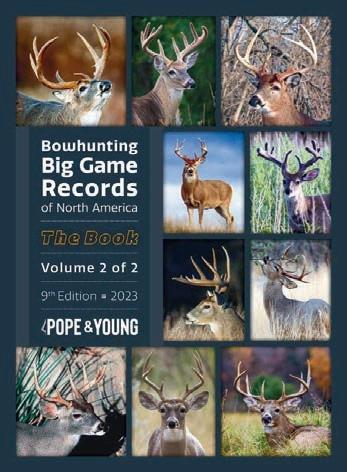






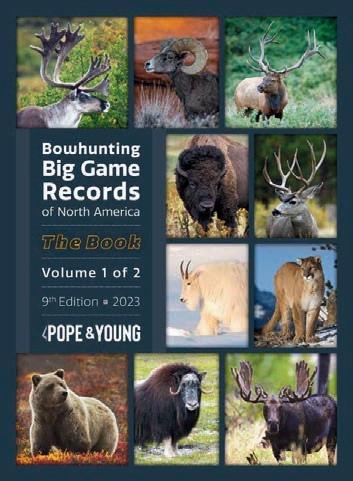
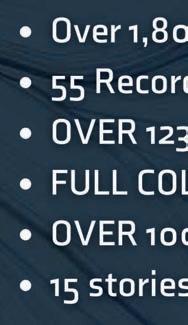



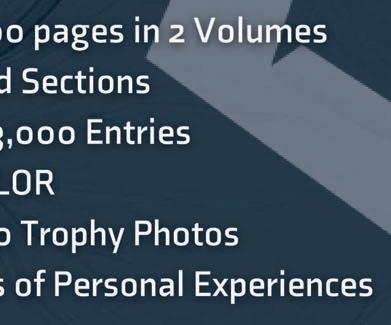








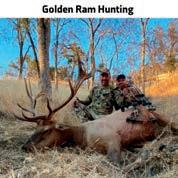


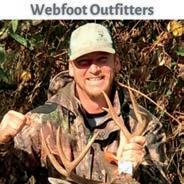


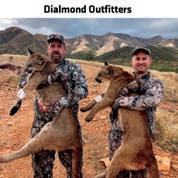
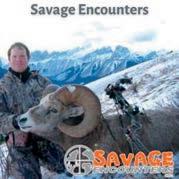
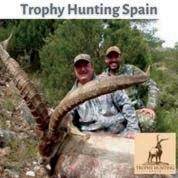
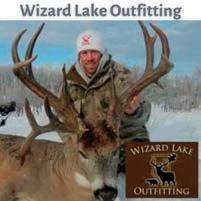

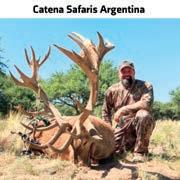

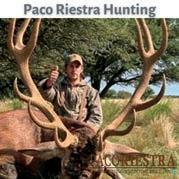
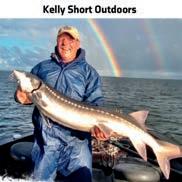
Wewanttothankallofour2023 outfitters!Yourgenerosity, flexibility,andbeliefinP&Yisa testamenttocommitmentand genuinesupportforbowhunting preservation!
Formoreinformationaboutallofour outfitters,pleasevisit, https://pope-young.org/donating-outfitters
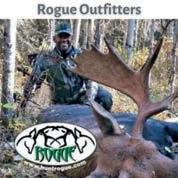
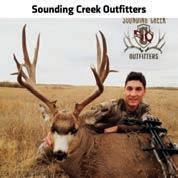
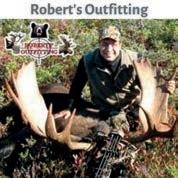
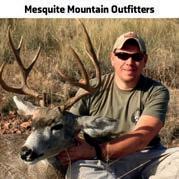
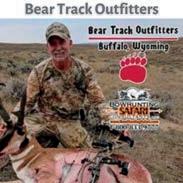
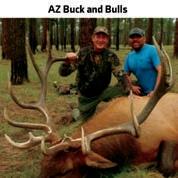

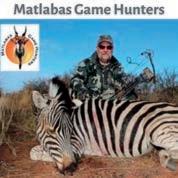
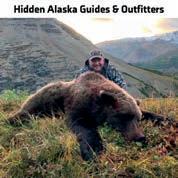

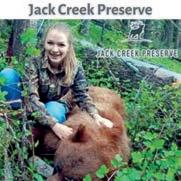
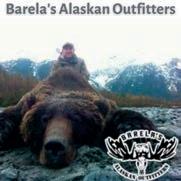
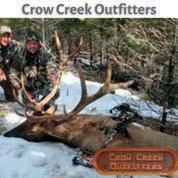

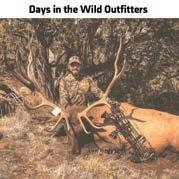

 PerrinsRainyPassLodge
CrowCreekOutfitters
BearTrackOutfitters
Barela’sAlaskanOutfitters
JackCreekPreserve
PacoRiestraHunting
WebfootOutfitters
WizardLakeOutfitting
MotshwereSafari
Robert’sOutfitting PointerWingshooting
TrophyHuntingSpain
YukonBigGameOutfitters
SavageEncounters
RogueOutfitters MatlabasGameHunters
PerrinsRainyPassLodge
CrowCreekOutfitters
BearTrackOutfitters
Barela’sAlaskanOutfitters
JackCreekPreserve
PacoRiestraHunting
WebfootOutfitters
WizardLakeOutfitting
MotshwereSafari
Robert’sOutfitting PointerWingshooting
TrophyHuntingSpain
YukonBigGameOutfitters
SavageEncounters
RogueOutfitters MatlabasGameHunters


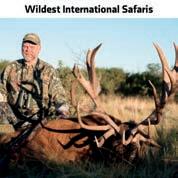


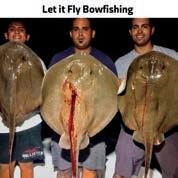
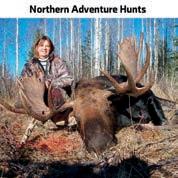

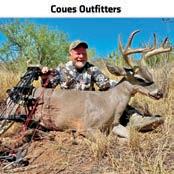
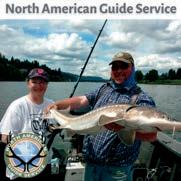
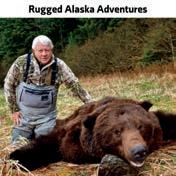



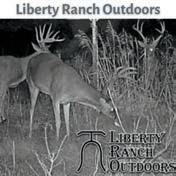
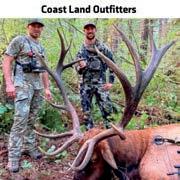

















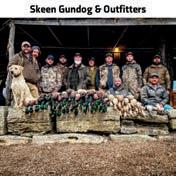


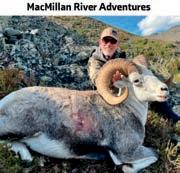

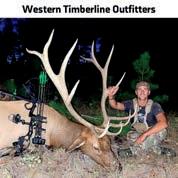
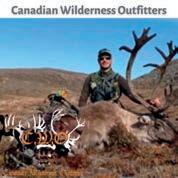
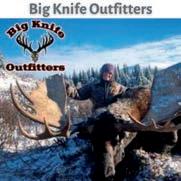



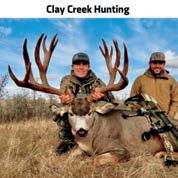


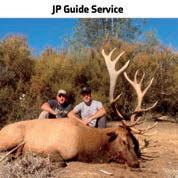
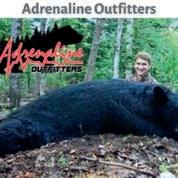
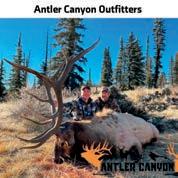
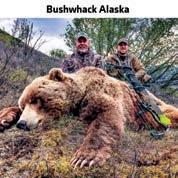

OUTFITTERS PARTNERS 2023 Ward’sOutfitters NorthAmericanGuideService CanadianWildernessOutfitters AdrenalineOutfitters BigKnifeOutfitters LibertyRanchOutdoors https://pope-young.org/donating-outfitters
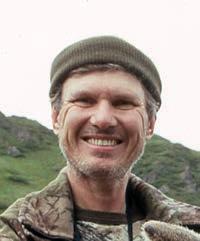
Super Slam Hunting
By Kurt Ebers
Chuck Adams
Thoughts on Hunting Over Bait
II recently posted on social media about my 2023 bowhunt for black bears in my home state of Wyoming. Hundreds of archers on Facebook and Instagram congratulated me on the decent-sized bear I shot, but a handful grumbled that I had taken the bruin over bait.
I’ve often said that my preferred bowhunting method is spot-and-stalk. But bowhunting possibilities in the spring are limited, and every legal activity can be fun if you do it right.
Doing it right on a DIY spring black bear hunt with some of my good friends means packing in custom steel bait barrels we designed ourselves, toting hundreds of pounds of meat scraps collected from the local butcher shop, and waiting for days on end for the right bruin to show up. Meanwhile, we camp together and enjoy swapping stories about our activities.
As is the case in most places, the big old bears in my neck of the woods are cagey. One whiff of human scent as they circle the bait, and they never appear. Most are mostly nocturnal, and potent human odor near a barrel usually drives them to feed at night all the time.
Trail cameras are legal in Wyoming during bear season, and I photographed two whopper bruins last year that always fed between 11 p.m. and 3 a.m. Anyone who thinks such animals are easy has never baited in a hard-hunted area. Those two big males stood as high as a 55-gallon drum and would have scored well in P&Y, yet they never gave me a chance.


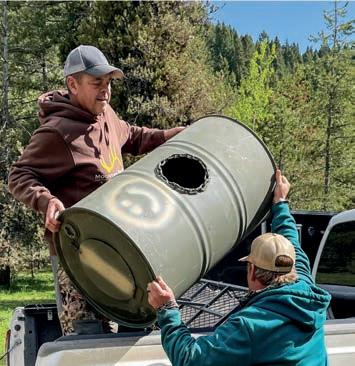
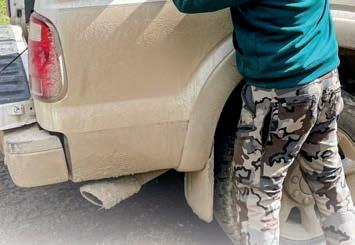


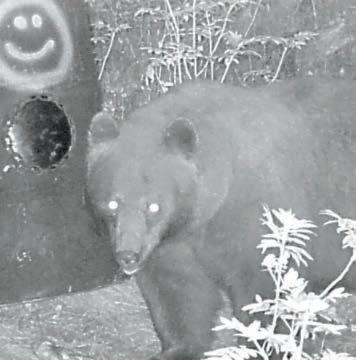






2024 Spring
Most whopper black bears feed on bait at night. Getting a shot can be difficult or impossible.
62
Chuck and his friends work hard at spring bear baiting with custom-designed bait barrels and many backpacks of meat scraps to remote places.

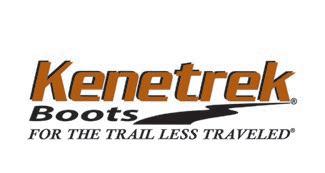
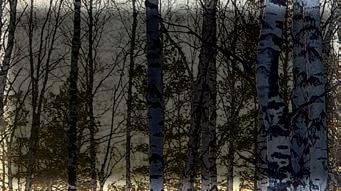


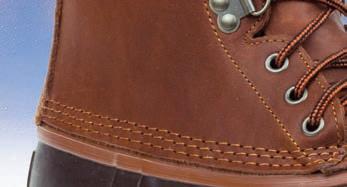
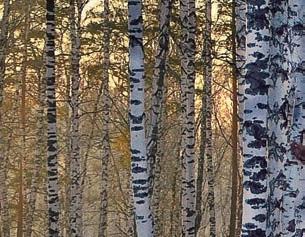
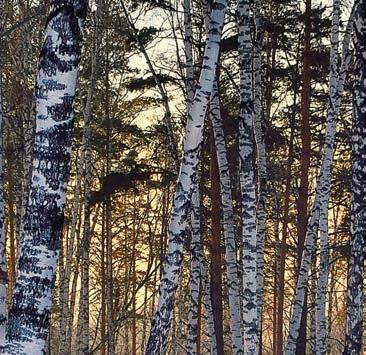

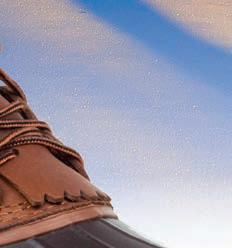



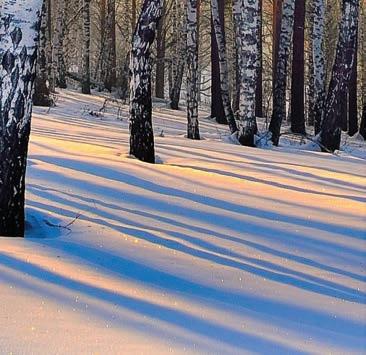






GRIZZLY PAC BOOTS





From the morning sits in the late season Whitetail stand to chasing after hounds hot on the trail of a Colorado Cougar, your boots are arguably the most important piece of gear you will use. Stay out longer, hike further, and perform better with Kenetrek Pac Boots.
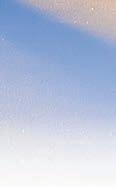
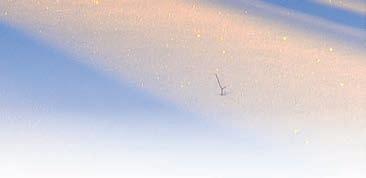

Built with the mountains in mind, our supportive leather uppers and high traction K-Talon™ outsole will keep you upright, while wool felt liners and extra insulation in the bottoms will keep you toasty warm temperatures down to 0°F.



©KENETREK, LLC 2023
VISIT US ON SOCIAL WWW.KENETREK.COM 800-232-6064
ULTRA WARM + ALL DAY COMFORT FOR LATE SEASON HUNTS
in




Super Slam Hunting
Game laws about baiting vary as much as bowhunter views on the subject. In California, where I grew up, hunting bears with hounds was legal at the time, but baiting bears was not. The law there has since been changed to prohibit hounds. In Montana, where I moved as a young man, both baiting and hound hunting bears were illegal. In Wyoming, where I live now, baiting black bears is legal in some areas, but hound hunting is not. Laws about baiting other big game species like deer are equally inconsistent. In Texas and Oklahoma, for example, it is legal to bait deer with food like corn, but this is strictly prohibited in many states…including some like Wyoming that allow baiting for bears but not for deer. Go figure.
And what about hunting over water for critters like pronghorns? Isn’t water a bait the same as meat scraps, pastry, or corn?
I find it amusing that some bowhunters get mad at the thought of shooting deer at corn feeders, but get excited about shooting a bear with a doughnut in its mouth or a whitetail buck with its nose buried in a mock scrape saturated with commercial scent. Sneer at baiting big game if you must; at least be consistent about it.
If you refuse to bait-hunt altogether, that’s your business. But don’t bash hunters who do. Last time I checked, this is still America, where we are free to enjoy legal hunting methods. And most tactics, like waiting over bait for a trophy black bear, are a lot more challenging than some bowhunters believe.

2024 Spring 64
BROWSE AND BUY FROM YOUR OWN HOME YOURONESTOPSHOP FORTIRE&WHEELS WWW.BOSLEYTIRES.COM OVER-BUILT & UNAPOLOGETIC. Yes, the new Carbon RX-5 is built to bully nature and there’s not another bow out there that comes close. For that, we’re not sorry. We over-engineer our REDWRX bows so you can fill tags when everything else goes to hell. This is the crossroads between the path you know and the path being engineered by progress. This is the new Carbon RX-5. REDWRX_Kuiu ad_P&Y.indd 1 2/22/21 4:01 PM
continued
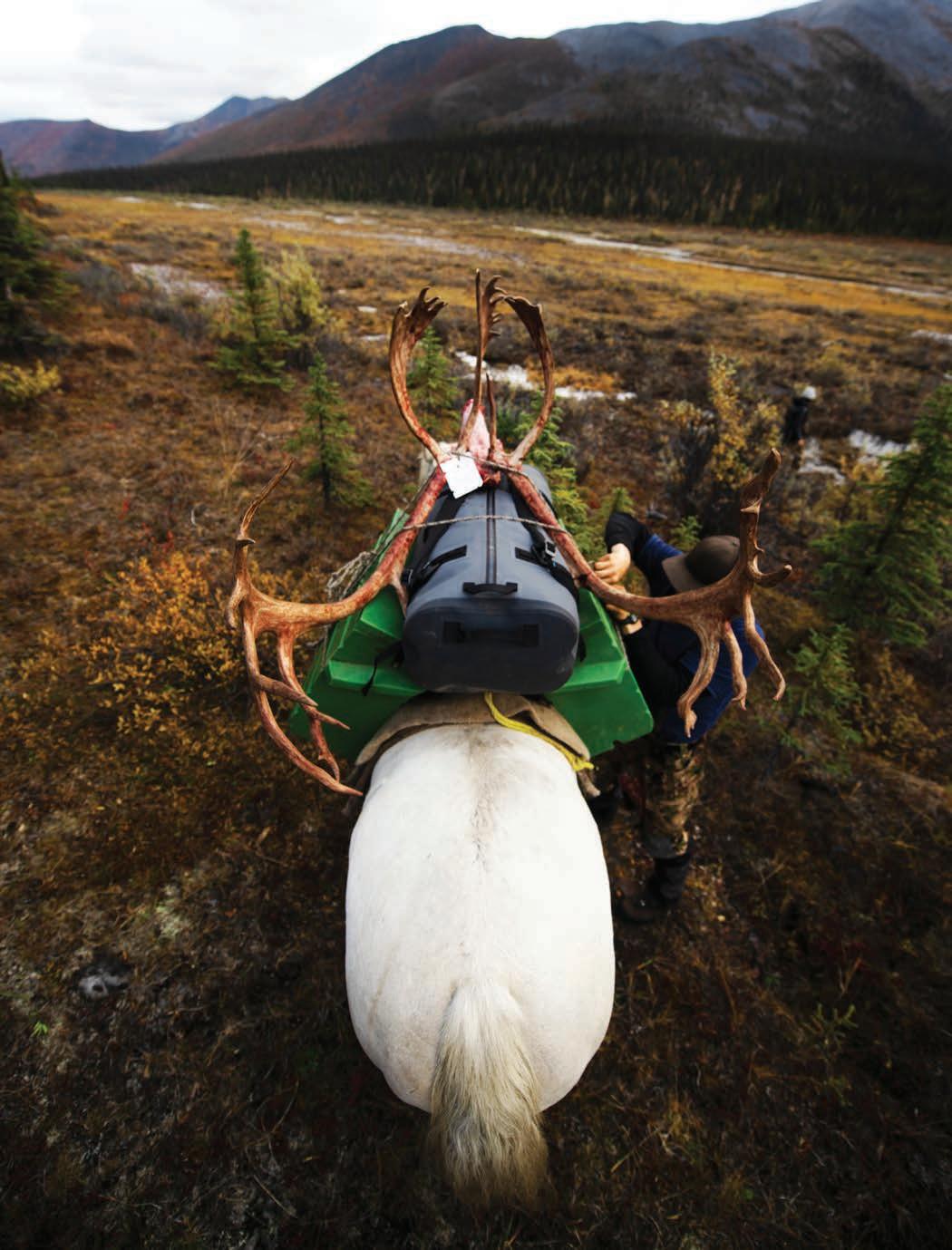
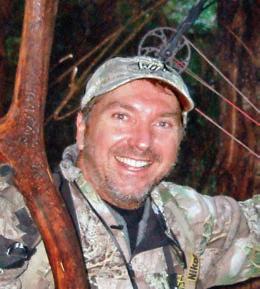
Adventure Bowhunter
By Tom Miranda

Sonoran Giant
Although I would consider the pursuit of all of North America’s 29 big game animals “Adventure Bowhunting,” traveling to old Mexico in pursuit of a Muy Grande Desert mule deer buck quite the adventure and a worthy undertaking. The flat desert and adjacent mountains of Sonora offer grand opportunities for both the desert whitetail and mule deer. Cattle ranches dot the vast desert surrounding Hermosillo and offer opportunities much different from the hayfields of eastern Colorado or the quaking aspen of Wyoming high country.
The antlers of a nice 10-point whitetail buck are almost child’s play compared to a mature 4-point desert mule deer with eye guards. No whitetail hunter can deny it, the look of an ultra-wide, tall, and heavy desert muley buck is a dream for every hunter who dons a camo suit and pulls a bow.
Considered by some to be an easier hunt than his whitetail cousin, the mule deer is typically found in open country and thus can sometimes be easier to locate. However, locating a nice buck and getting an arrow into him are two different things. The mesquite, palo verde, and cactus-laden desert of
Sonora offers plenty of security cover, spread over a maze of dry washes and ravines that secure these massive desert trophies.
Back Story
My Sonora mule deer hunt followed in the footsteps of Super Slammer, P&Y lifer, and Fred Bear Society member George Harms. George is a successful contractor and avid bowhunter who leased a ranch north of Hermosillo and was fortunate enough to arrow a P&Y World Record typical mule deer on the property. Through whispering at a P&Y biennial convention, I heard that George was giving up his lease, and I quickly went into action to hunt the ranch. Genetics is the key to killing a giant buck, bull, boar, or ram, and this area obviously had it. Nayo Balderamma of Amigo’s Guides was taking over the hunting on the large ranch, and I secured a tag and 10-day window to hunt the mixed mountain and flat desert cattle ranch.

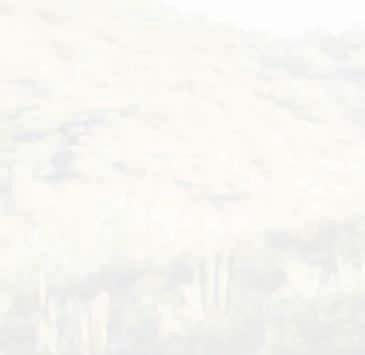

noted sign. Several tanks were guarded with tower stands and a few with pop-ups. The cloth hides are moveable if a buck is caught on camera at a tank without a blind or stand. Nayo showed me scouting cam photos of the deer, mostly does and smaller bucks. However, one respectable buck was hitting a tower stand, and although a respectable mule deer, not a muy grande. We checked all the cameras, scouted tracks, and fence crossings, and looked for a place to set up an extra pop-up as a pop-up would be easier for me to video from.
Solocampro
Because the ranch is a working cattle ranch, water is piped to tanks spread across the large barbed-wire fenced pastures. Nayo had a limited number of scouting cams and thus monitored the tanks with the most




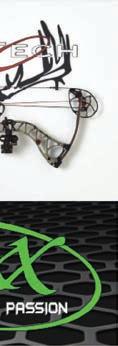
Yes, I was going to attempt to video the hunt without using a cameraman. Here’s a little back story: in 2010, while producing a TV series called Mathews Dominant Bucks… I coined the phrase “SoloCamPro.” The series featured a staff of midwestern bowhunters who attempted to videotape their whitetail bow hunts solo being both cameramen and bowhunter. With Mathews building SoloCam bows, the play-on-words we used in the series (which was hosted by Illinois whitetail hunter Stan Potts) was “SoloCamPro,” a pseudo acronym for Solo Cameraman Producer.
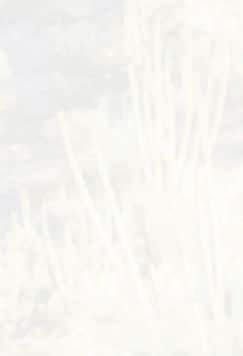

As a TV producer, I constantly critiqued footage sent for consideration to be used on the program. It’s no easy feat to get good camera footage of a bowhunt, let alone run the camera and be the hunter. Often, these solo hunters would say to me, “Tom, you always have a cameraman… you have no idea how tough this is!” Well, this “throwing down the gauntlet” spurred me to take up the mantle to start shooting my own “Territories Wild” SoloCamPro style series. This trip to old Mexico wouldn’t be my first desert mule deer hunt. I have done five TV bow hunts to this point, only arrowing two bucks— one in southern New Mexico, the

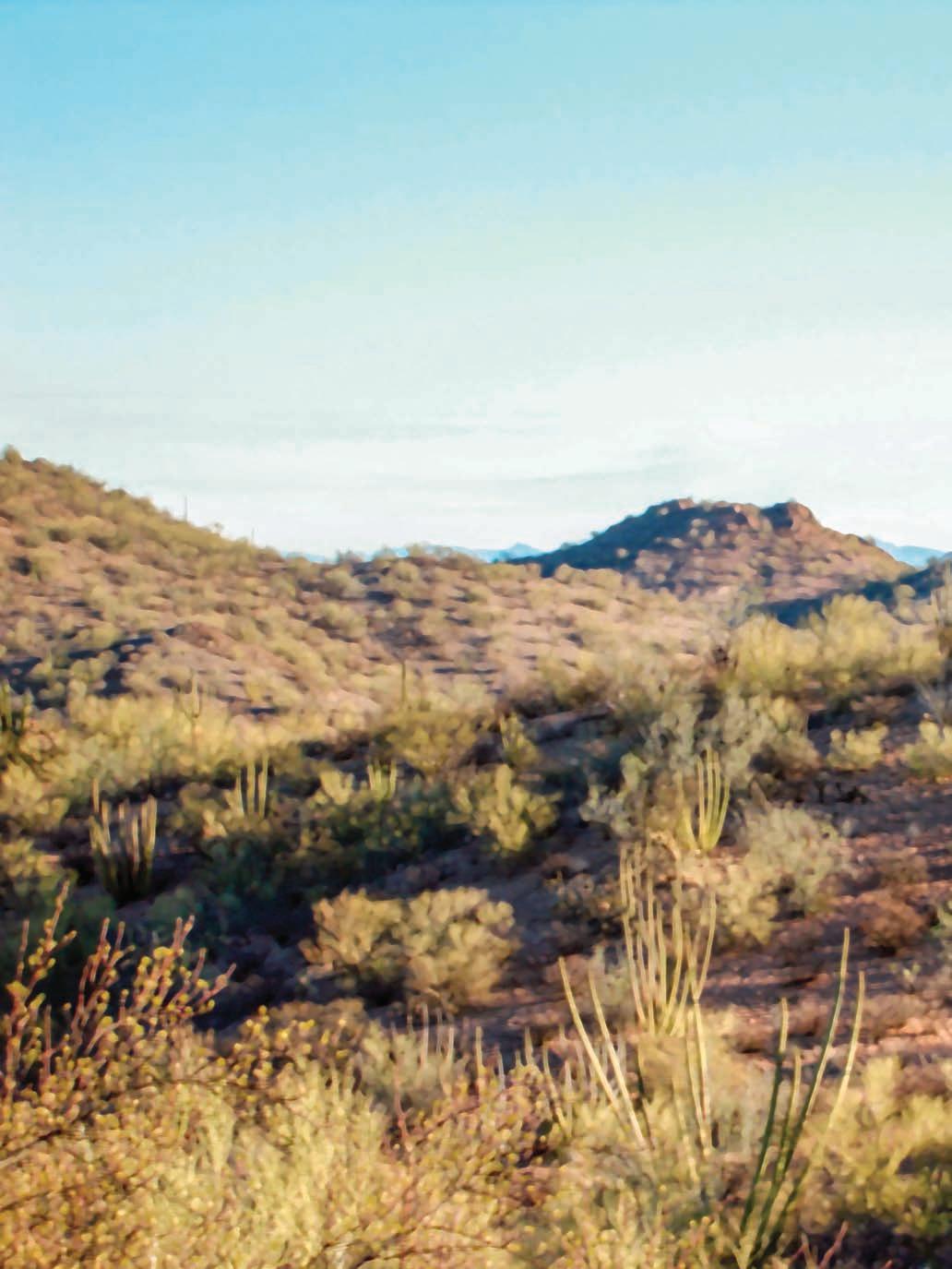
2024 Spring
66

other in west-central Alberta. Both hunts were documented utilizing a cameraman.
Back to the Hunt
After Nayo and I checked the cameras and scouted, we had lunch. I spent the afternoon glassing from an overlook with a small cave on top. The rocky crop gave a nice view of one side of the ranch, and the cave allowed me to stay cool and out of the sun. I saw plenty of mule deer and some Coues whitetails, but no shooters. The outing allowed me to video scenes, tape audio, and think about a plan. At dinner that night, I went with a gut instinct and picked a water tank with a pop-up.

The next day, I was dropped off before daylight and sat in the blind all day. There were no shooters, but it was a good practice run. I sat that blind for three days and never saw a shooter; on day four, I moved to the stand where a decent buck was captured on a scouting cam.
When we got to the set, I climbed in and quickly determined that there was no room for the camera: it was the smallest elevated box blind I’d ever tried to hunt from. I flagged down Nayo before he drove off, as there was no cell coverage. He took me back to the pop-up I had been hunting. The plan was to hunt till 10 AM, and if nothing, we would move back and set a pop-up near the tiny elevated box blind. Nayo returned at 10 with an old beat-up pop-up, and we went back to the box blind after looking the area over and checking the wind. I decided to put the pop-up under the elevated box. The wind was perfect, and since the deer were used to it. I thought it would be less distracting than if set away from the existing box blind. Nothing came in that evening, but javelina and some does. The next morning, I had a decent young buck hit the tank. Most who know me know my motto: “Never pass a buck on the first day that you would shoot
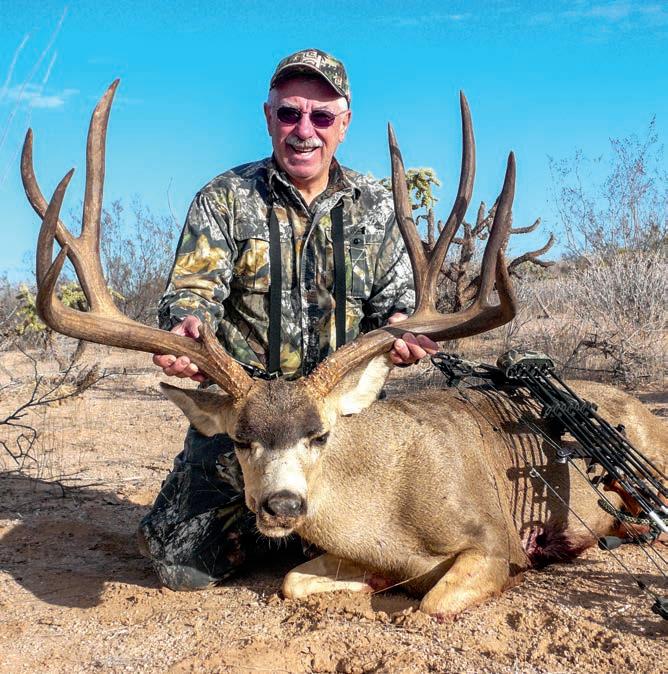
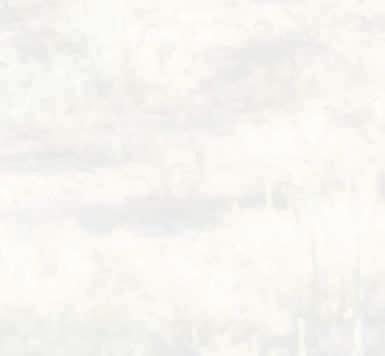

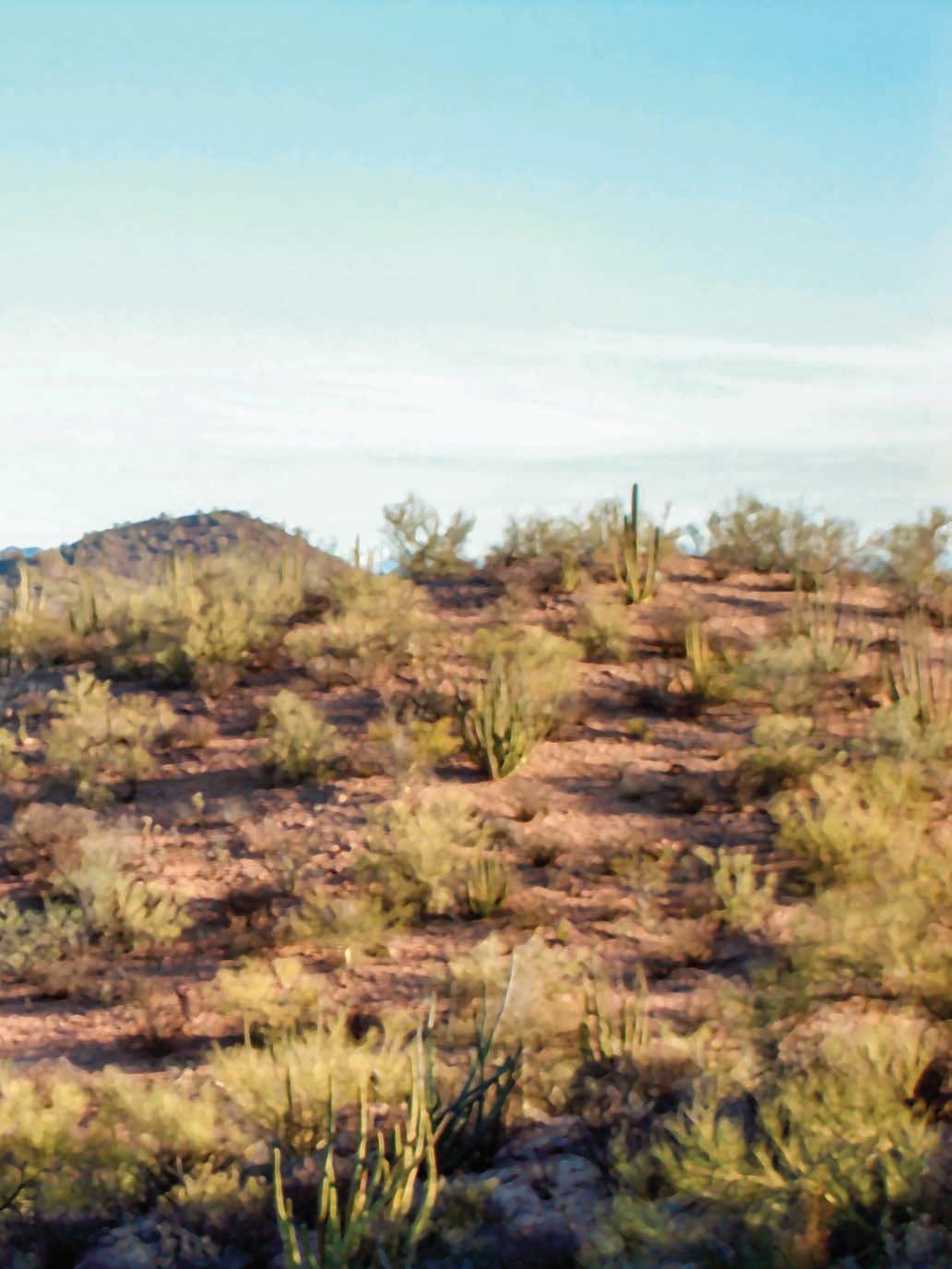
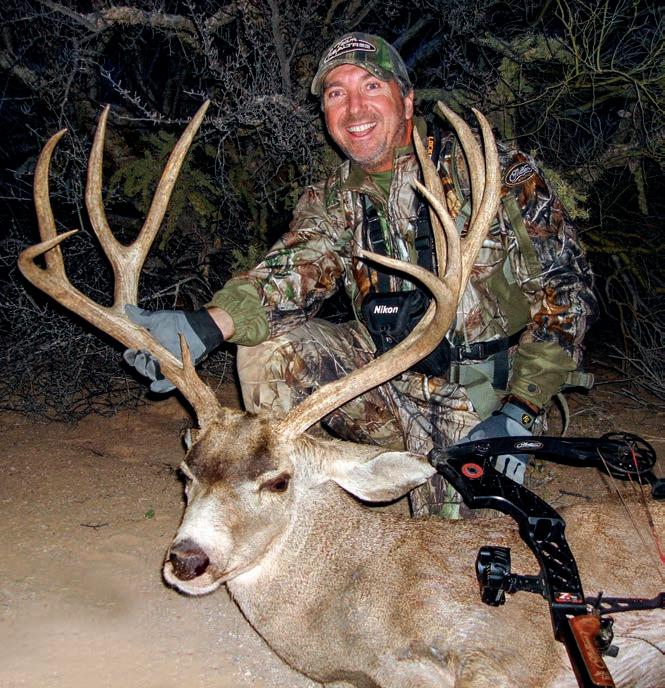
Spring 2024 67
Fred Bear Society member George Harms poses with his former P&Y World Record desert mule deer.
Tom Miranda’s whopper desert mule deer taken in Sonora, Mexico.
Adventure Bowhunter

on the last day.” But with five more days to hunt, I was not ready to lower my standards.
Change of Plan
Day six was breezy on the morning sit and into the afternoon before starting to settle. As the magic hour approached, several deer hit the tank, and then a couple of bigger bucks. I rolled footage on them, and of course, after they walked off, I had a sick feeling come over me. You know the feeling… that second thought that “Maybe I should have shot the bigger one?” But no more than 10 minutes later, the big buck stepped out straight in front of me, walking cautiously toward the stock tank. Rolling video, I got my bow in hand. Multitasking in the blind with a huge mule deer at 30 yards
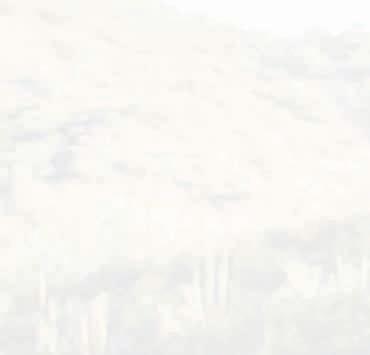
and closing is quite crazy. The buck looked at the blind several times as he approached. I got the camera locked down and cranked my bow... I quickly settled the pin and shot. The Rage two-blade Slip-Cam head passed through the lungs, the buck lunged and then sped away through the greasewood and out of sight. I was trembling with excitement: I had the video. I knew this buck was not seen on any of the camera photos that Nayo had shown me. Checking my watch to note the shot time, I quickly began shooting the TV reversals I would need to finesse the twocamera look that ESPN required. Waiting 30 minutes and with the light fading, I piled out of the blind and started following up the buck. He didn’t go 100 yards and had no ground shrinkage... he was exactly the buck

I was looking for.
That evening, we celebrated the hunt, and everyone enjoyed watching the buck approach and the shot. It was a buck dreams are made of, with a green gross score of 199 6/8, about as close to a 200-inch gross buck that I’ll ever get. The challenge of running a video camera to gather quality, crisp, and stable wildlife footage is immense. However, abandoning the camera to draw the bow and get the impact shot on video is truly another level.
Footnote
One interesting sidebar to this hunt was that two weeks before my scheduled hunt was to take place, Nayo emailed me and told me that he had a huge buck on the scouting
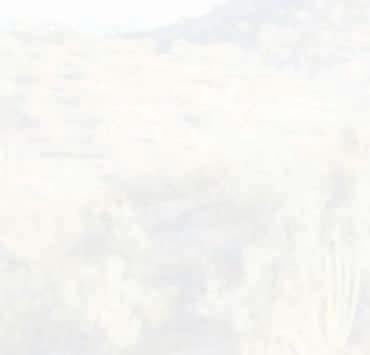
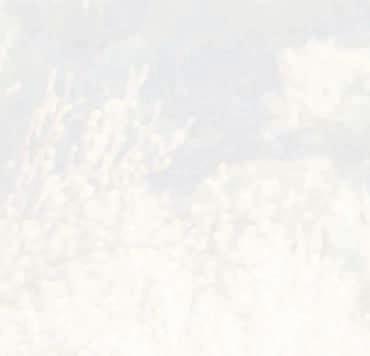






2024 Spring 68 continued



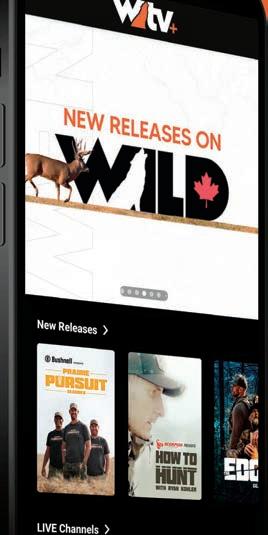








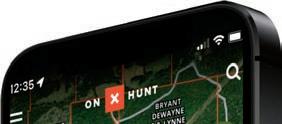
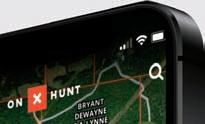

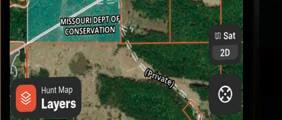



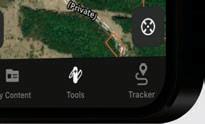
EMBRACE THE WILD, NAVIGATE WITH PRECISION. wildtvplus .ca PURCHASE WILD TV+ AND RECEIVE FREE ACCESS TO ONX HUNT ELITE MEMBERSHIP onX Hunt App is now available in Canada! Subscribe to Wild TV+ today for only $39.99 & you will receive a FREE 3 month subscription to onX Hunt Elite Membership, valued at $99.99. Current subscribers - check your email to download! Still using the free version of Wild TV+? Scan the QR code to subscribe today & this BOGO offer will be delivered straight to your inbox. Seize the day & start prepping for your next adventure.
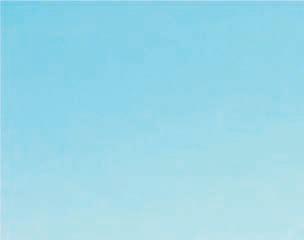
Adventure Bowhunter
By Kurt Ebers




camera that would beat George Harms’s new P&Y world record. He needed me to fly down immediately to try for it. Nayo feared the buck would move off the ranch in search of does as the rut was on in the desert. Believe it or not… I told Nayo that George was a good friend and that he had only had his P&Y record a little over a year.. and I did not want to try to break his record— that I only wanted

to shoot an above-average desert mule on video for my TV series. Nayo thought I was insane to refuse but understood my position and had a rifle client fly in who shot the beast that same week. George never knew this, and eventually, his record was broken by another bowhunter. While the quest for world records is a top priority for some, my goals have never been anything more than



the promotion of the sport and quality video footage for my programs.
Editor’s Note: You can watch Tom Miranda’s solo video hunt of his Sonora Mule deer on his Facebook page or website. https://www.facebook.com/ AdventureBowhunter
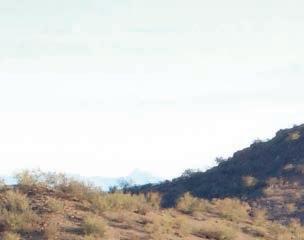
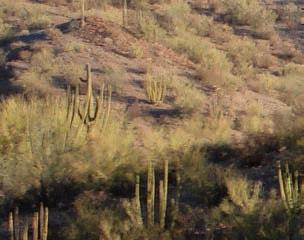
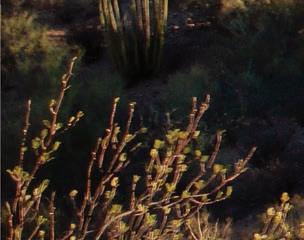
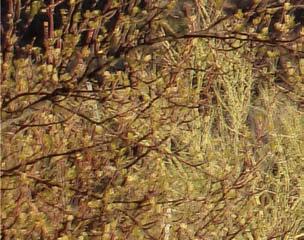

https://www.tommiranda.com/

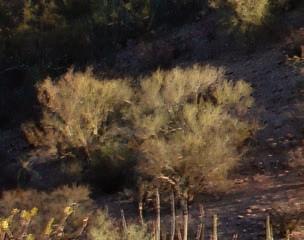
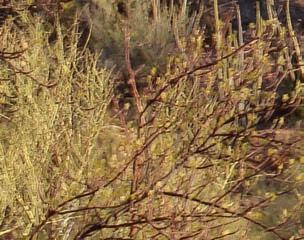

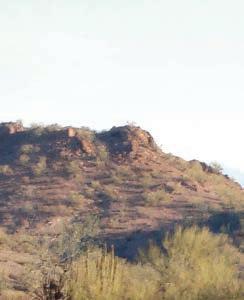
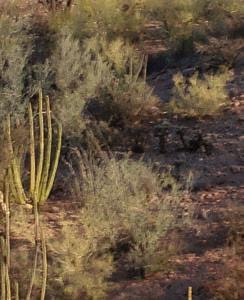
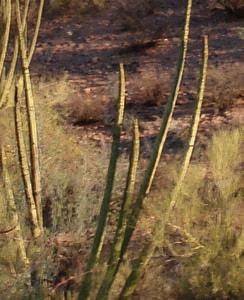

•••••••••••••••••••••••••••••
2024 Spring 70 continued
Record book mule deer habitat.

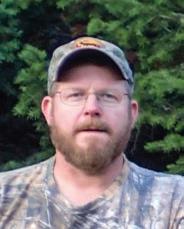 By Stephen LePage
By Stephen LePage
Hello, Pope and Young members, Something that we have struggled with as an organization is keeping first-time members. Over the last three months, we have initiated an outreach program with the goal of increasing the retention of first-time members of our club. A group of volunteers that I have dubbed the “Outreach Team” has called every new first-time General member to establish a communication line and let them know
what the Pope and Young Club is about.
I have received feedback from the volunteers and made several of these calls myself; from what I have experienced, it has been a great program. It always amazes me how once someone realizes that you are a bowhunter, how the conversation evolves. That common passion removes all differences and distances between people and brings us to our most comfortable level. A completely cold call results in laughter
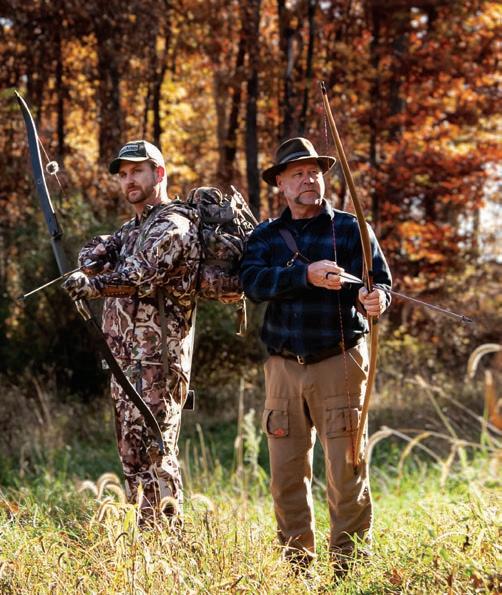

while we talk about the most recent hunt, and you can feel the anticipation of the upcoming fall as we share stories.
Regardless of whether this effort will increase the retention of new members or not, I am pleased that I have been able to converse with bowhunters who are new to the Pope and Young Club. If anyone is interested in becoming a member of our Outreach team, please give me a shout for more information.
Sincerely,
Stephen LePage P&Y Membership Chair
406-535-5636
stephenandamylepage@yahoo.com




2024 Spring
72
The world’s largest selection of traditional and primitive archery supplies. Everything you need, with expert advice, to get you PROMO CODE: PYCLUB10 GET $10 OFF YOUR NEXT ORDER OF $100 OR MORE A Pope & Young Member Exclusive Offer. Call for details. 3RiversArchery.com • 260-587-9501 The world’s largest selection of traditional and primitive archery supplies. Everything you need, with expert advice, to get you shooting a traditional bow. PROMO CODE: PYCLUB10 A Pope & Young Member Exclusive Offer. Cannot combine offers. Call for details. 3RiversArchery.com • 260-587-9501
Membership Column
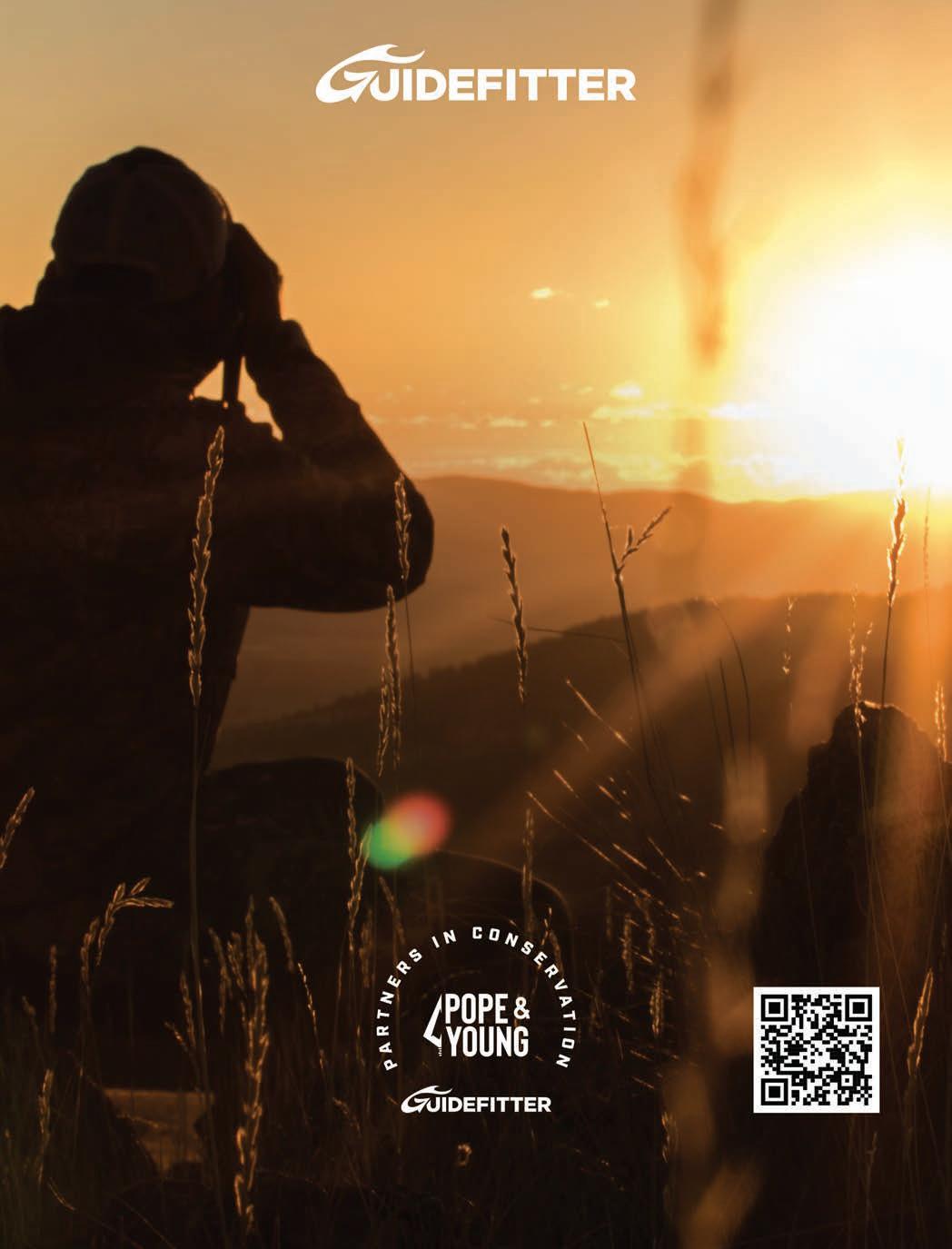

SCAN ME

In Memory
Vaughn Cross
Membership
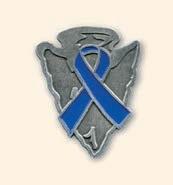
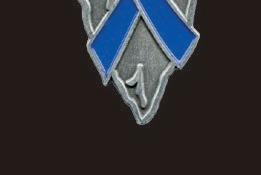

Senior Member
Quinn Davies AK
Maxx Tumey AR
Justin Schwent .......... .MO
Haelee Jeon TX
Finn Kempenski TX
Levi Lacox TX
Pinedale, WyomingGeneral Member Since 12/1/1980
Dennis Ballard
General Member Since 12/1/1980
Senior Member Since 10/22/2002
Regular Member
Sturgeon, MissouriGeneral Member Since 08/28/1962
Regular Member Since 08/20/1973






Jack Batey TN
Brayden Breaux TX
Mason Breaux TX
Weston Breaux TX
Noah Chacon-Saenz TX
Noe Chcon-Saenz TX
Reily Doming TX
Mason Doming TX
Talan Donaldson TX
Kurbin Donaldson TX
Brayden Fraley TX
Ruben Dario Garcia TX
Ryan Garcia TX
Andrew Jameson Garcia TX
Ruth Juliana Garcia TX
Jubal Gierisch TX
Jair Gierisch TX
Jacey Hapes TX
Ben Larson TX
Kali Marsh TX
Evalin Pena TX
Isaiah Pena TX
Joshua Pena TX
Cooper Smith TX
Aubrey Smith TX
Nahir A Sotomayor TX
Leila Stanley TX
Rocco Tarone TX
Breilei Turner.............TX
Emma Turner TX
Chloe Whitehead .......... TX
Hoyt Whitehead TX
Piper Whitehead TX
Eli Wooldridge ............ TX
Mitchell Cherovsky WI
Calvin R Davis WI
Jarrett Finley AK
James Harbison AK
Cal Hepburn AK
Frank Neumann ........... AK
Jamey Rothmeier AK
Adam Treece AK
Corey Lowery AL
Phillip Lowery AL
Timothy Bennett AR
Kiegan Billingsley AR
Jessica Tumey AR
Todd Bresemann AZ
Shane Luke AZ
Cory Pritchard AZ
James Rufh .............. AZ

Jonathan Sims AZ
Alex Spahn AZ
Toby Weaver AZ
Sheldon Kelly ............. BC
Ryann Horton CA
Abraham Soto CA
James Wheelan CA
Troy P Winslow CA
Justin Davis CO
Mark Elliott CO
Joel Green CO
Darin D Grimm CO
David Leach CO
Brandon Ryder CO
Randy Stolba ............. CO
2024 Spring
74
New General Members
BRATS & SAUSAGES OSTRICH WILD BOAR BISON ELK PREPARED MEALS Buy All Our Delicious Foods On Line Or By Phone. Got Questions? Just Ask Us! Toll Free: 1-888-854-4449 info@sayersbrook.com www.sayersbrook.com We Deliver Wild Game Meat to Your Door 15% OFF Everything in store for Pope & Young Subscribers Enter Coupon Code PYSAVE15 at checkout This is a Limited Time Sale No Antibiotics No Hormones No Steroids Gluten Free No Artifical Stimulants
New Youth Members
New General Members continued
Luke Voss .CO
Suzy C Woodward .... .CO
Matthew Kinsey FL
Levi Mercer FL
TJ Norris FL
Rod Rowan FL
Adam Veidt FL
Bradley Butler .GA
Dean Darcy .GA
Ryan Eichner .GA
Ken Kliment .GA
Graham McDonald.....GA
William Smith........ .GA
Luke Anderson IA
Kevin Hubbard IA
Jerry Sellers IA
Jon Argyle ID
Brandon Buchanan .IL
Tim Jarvis .IL
Nathan Lewis .IL
William Miller .IL
Luke Perzee .IL
Joel Biltz IN
Wyatt L Carter ........ IN
Nick Gries IN
Don Kennedy IN
Matthew Kettlebar IN
Bradley J Meunier IN
Sidney Newton IN
Richard G Smith IN
Kiefer Stiffler IN
Rich Walsh IN
Brent Webster IN
Clint Woolever IN
Jason Workman ....... IN
Kris Boucher .KS
Sam McCord .KS
Brady Ochs .KS
Brandon Simrell .KS
Jackson Benningfield..KY
Cory Bryant .KY
Christopher Greyson Evans .KY
Brad Fields .KY
Andy Howard .KY
Daniel Kilburn .KY
Andrew Matlock .KY
Cameron Mefford .KY
Cody Payton .KY
Michael Smothers .... .KY
Ryan Tarrie .KY
Focient Turner .KY
Ethan Vincent .KY
Loye Ayres LA
Bryan Guzzardo LA
Patrick Jeansonne LA
Gary Kennedy LA
Steve Lott LA
Cody McDaniel LA
Kory Moss LA
Craig Denicola ....... MA
Paul Freeman MD
Calvin Kramer MD
Jesse Reynolds MD
Erin Stiede MD
Gary L Ward Jr MD
Michael Weeks MD
Jason Faulkingham ME
Robin Baber .MI
Andrew Bearre .MI
Jared Bunn .MI
Noah Farrant ........ .MI
Clayton Gilde .MI
David Gilley .MI
Christopher Gurisko Jr..MI
Charlie Hargrave .MI
Casey Kaatz .MI
Brandon Joel Kantola .MI
Eric Lane .MI
Sean Larson .MI
Larry D Looman .MI
David Lukowski.......MI
Chris Malinzak .MI
Nick Martinez .MI
Emerson Meyer .MI
Chuck Portwood .MI
Ryan Pummell ....... .MI
Joanna Richmond .MI
Brandon Rockey .MI
Damian T Smith .MI
Justin Strong.........MI
Jillian Winarski .MI
Joshua Jensen MN
Bradley Loken MN
Cassandra Lustfield MN
Jesse Lustfield MN
Ole Rygg MN
Justin Wellcome ..... MN
John Raymond Berry MO
Adam Duris MO
Daniel Gillroy MO
Colton Hargraves MO
Brice Hunt MO
Brandon Isabell MO
Alex Schrum MO
Quinn Talbott MO
David Temmen.......MO
Matthew Young MO
Jeff Abels ........... MS
Johnny Bass MS
Jeremy Kelly MS
Brandon Barlow .NC
Cameron Baucom .NC
Eric Bell .NC
Carey Hamil .NC
Jeremy Morgan .NC
Steven Parrish .NC
Kris Shoemaker .NC
Trace Armstrong .ND
Robert Durant .ND


Spring 2024 If It’s Crystal Clear... ...It’s Kowa #kowaoptics Kowa American Corporation 20001 South Vermont Avenue, Torrance, CA90502 U.S.A. T: +1 (800) 966-5692 | E-mail: customerservice@kowa.com www.kowa-usa.com A range of sporting optics delivering one of the most immersive and detailed views of the natural world. Ultimate clarity with exquisite engineering. Built to last a lifetime. SERIES FOR THE PINNACLE OF OPTICAL PERFORMANCE 75

Membership
continued
New General Members continued
Olivia Hettinger .ND
Hunter Wood .ND
David Getzschman .... .NE
Robert Meduna .NE
Amanda Mate .NH
Justin Canzano NJ
Shawn English........NJ
Cody Schiffman NJ
Morgan Dugger NM
Dylan Goodluck NM
Rex Jensen NM
Megan Ashley .NV
Ian Guthridge .NV
Dustin Kline ......... .NV
Brian Brzek .NY
Richard Capozza .NY
Morgan Cole .NY
Eric W Culver .NY
Joseph Esposito .NY
Anthony Florence .NY
Steven Gavaris .NY
Warren Skelly .NY
Scott Tanski .NY
Jonathan Tribiano .NY
Cole VanSlyke ....... .NY
Jim Winter .NY
Joshua Wolfe .NY
Michael Adamski .OH
Barry Caudill .OH
Justin Coakley .OH
Seth Greear .OH

Jordan M Gross .OH
Jonathan Hanley .OH
Jesse Hickman .OH
Daniel Hohman .OH
Ryan LaLonde .OH
Nathan Mcnabb .OH
Marcus Mullet .OH
Luke Shellhaas .OH
James Simpkins .OH
Brian Wellert .OH
Phillip Cody ......... .OK
Daniel Lee .OK
Justin Smith .OK
Matthew Alexander .OR
Matt Brown .OR
Lance Bork .PA
Charles Cook .PA
Stephen J Flanagan Jr..PA
Richard Herrnberger .PA
Paul Herrnberger......PA
Chris Kellner .PA
Cameron Michell ..... .PA
Marc Musone .PA
Wade Neiderer .PA
Tyler Rapp .PA
Jeffrey B Shank .PA
Travis Shover .PA
Luke Shreffler .PA
Thurston Sick .PA
Kevan Smith .PA
Joe Trevizo .PA
Paul Wagaman .PA
Joshua Wenger .PA
Wes Arflin .SC
Mark Otis Bara .SC
Joel Boykin .SC
Anthony Scott Powell..SC
Mike Dorris .SD
Jackson Hilton ....... .SD
Tim Hoeck .SD
Noah Hohn .SD
Clay Cornett .TN
Matthew Courtwright..TN
Larry Daniels .TN
Brad George .TN
Jerry Kattawar .TN
Keith Ketron .TN
Tamrah Kincaid .TN
Kenny Lepard .TN
Heather Miller ....... .TN
Don Allison .TX
Bob Beard .TX
Anna Biermann .TX
Mitchell Bonte .TX
George Chmelar .TX
Matt Clowe .TX
Amber Collins .TX
Matt Collins .TX
Michael Cunningham .TX
Joseph Dungca .TX
Bailey Fender ........ .TX
Matt Haughey .TX
DJ Johnson Tx
Sean Kasser .TX
David D Lynch .TX
Taylor Moore .TX
Cody Nelson ......... .TX
Christopher Neuman .TX
Mark Owen .TX
Royce Patterson .TX
Zachary Pearson .TX
Melissa Peterson .TX
Clark Peterson .TX
Will Reich .TX
Andrew Rico .TX
Neil Shelton .TX
Brad Timmerman .TX
Randy Tomlin ........ .TX
Chad Turner .TX
Christin Turner .TX
Curtis Westbrook .TX
Rusty Wood .TX
Bradley Workman .TX
Yancee Hardy .UT
Austin Hiatt .UT
Mike Gomes .VA
James Gravely .VA
Steven Hotz .VA
Brandon Reyes ....... .VA
John Taylor .VA
Tim Whited .VA
Tatiana Gettelman WA
Chris Hallberg WA
Moises Acosta .WI
Greg Collins ......... .WI
Jim Daniel .WI
Shane J Davis .WI
Tyler Frisinger .WI
Jason Goebel .WI
Zach Haas .WI
Hunter Hurlburt .WI
Lucas Karls .WI
Gavin Kaufman .WI
Brett P Morris .WI
Oscar Perez .WI
Justin Petroske.......WI
Matthew Schulz ..... .WI
Ernie Schumacher .WI
Bob Skramstad .WI
Steven Valentin .WI
Dave Waldschmidt .WI
Kyle Zenk .WI
Brian Cunningham WV
Olen Jones Jr WV
Breyden Morgan WV
Darin Geringer WY
Adam James Reiter WY
Rory Chapple ........ .BC
Garth Vandenberghe MB
Evan Kooy .ON
Steve Newbigging.....ON
Jason Gourde .QC

2024 Spring
76

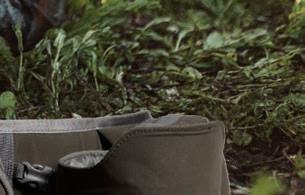
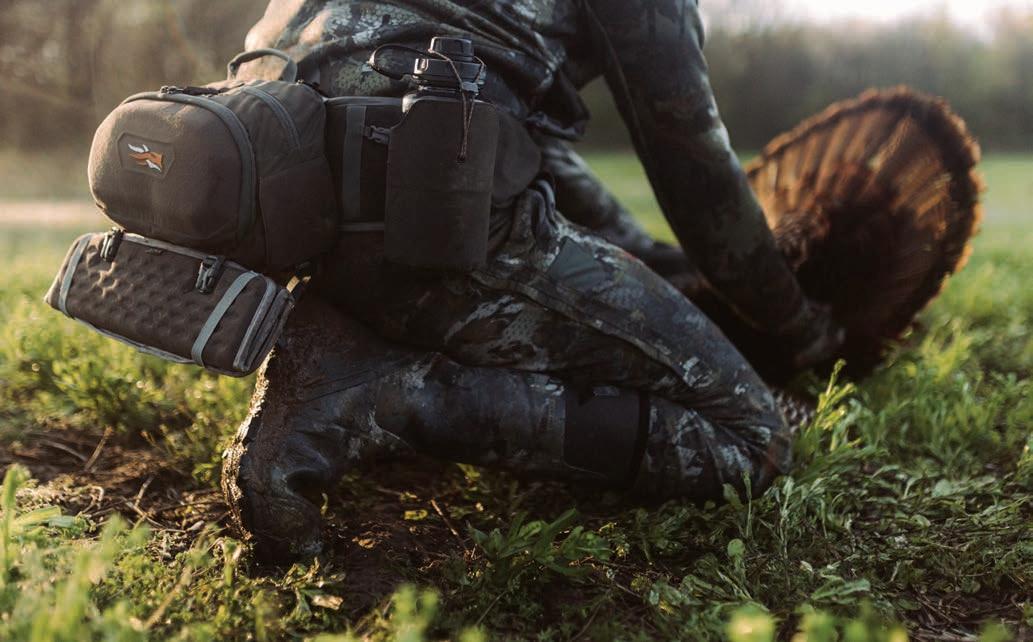

TURKEY TOOLBELT
ACCELERATING THE PURSUIT
Throw your run-and-gun game into high gear. This minimalistic call and gear-management system merges the simplicity of a hip pack with the specialized storage of a full-featured vest. When you strike a bird, simply drop the removable seat pad and spin the pack to the front of your body to access an array of call pockets. There’s plenty of room for other essentials, plus compression straps for added layers to equip you for unruly spring weather.
SITKAGEAR.COM
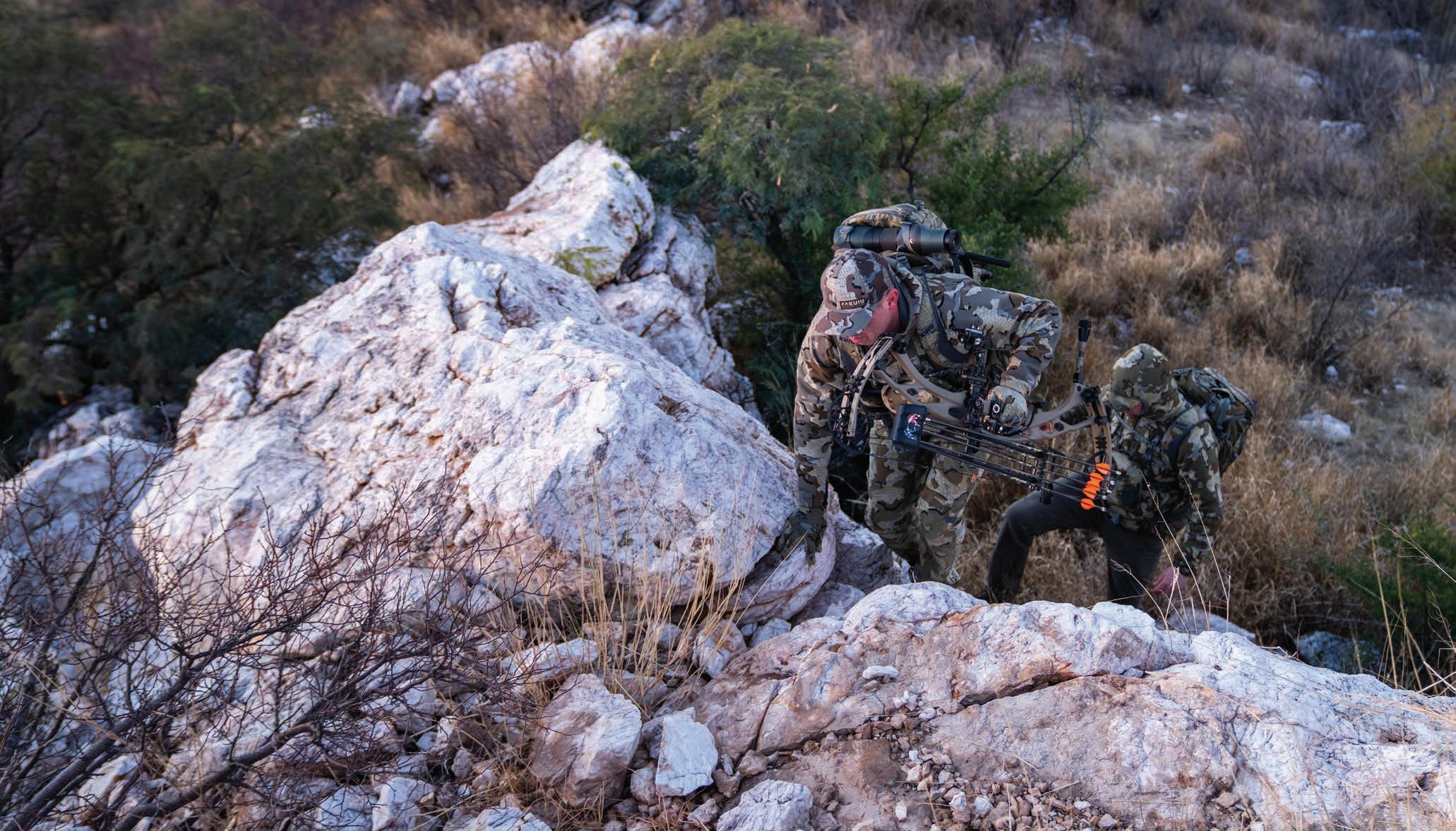
Only at KUIU.COM LIFETIME WARRANTY ON ALL OUR GEAR BASE LAYERS | INSULATION | OUTERWEAR | PACKS | SLEEP SYSTEMS | BOOTS | ACCESSORIES


Remembering Dennis (Denny) Roy Ballard

The Pope and Young Club, as well as the bowhunting and conservation communities, lost a valued friend on January 3, 2024. I met Denny through the Pope and Young Club. He was active and engaged in many P&Y activities and programs. Shortly after Denny had been appointed to chair the P&Y Conservation Committee, he resigned due to being diagnosed with Parkinson’s Disease.
Denny was born in Iowa. He grew up there, and after graduating from the University of Iowa in 1965, he worked for the Department
of Veterans Affairs, where he supported clinical research critical to the health and welfare of Veterans.
Early on, Denny was passionate about the art and science of archery, bowhunting, fishing, and wildlife conservation. He published his first article about archery in a 1970 issue of Archery Magazine. During the following 60 years, Denny published well over 100 articles regarding his passion for archery. Most notably, Dennis authored the very first widely published review of the compound bow. This article helped propel a



revolution in the archery industry, bringing a new generation of archers and bowhunters into the heritage and joy of archery. After “retirement” from the Department of Veterans Affairs, Denny served as the Executive Director of the Conservation Federation of Missouri, whose mission is ‘to ensure the conservation of Missouri’s wildlife and natural resources and the preservation of (Missouri’s) rich outdoor heritage...,’ In this role, Dennis represented thousands of ‘citizen conservationists’ throughout Missouri, working with them
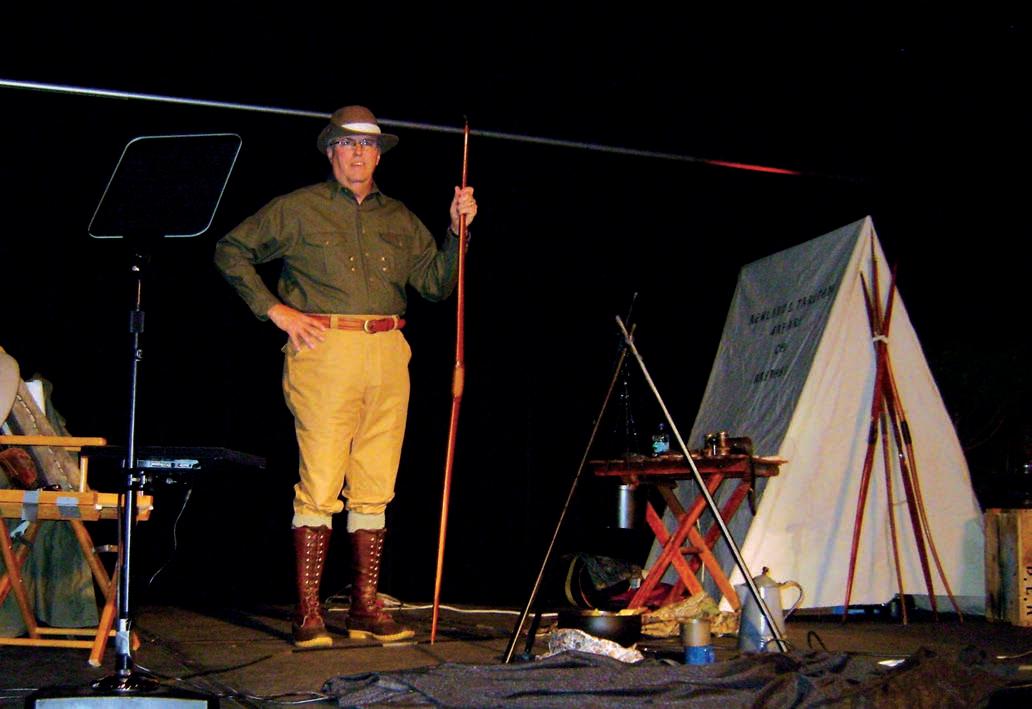


“It seems like only yesterday that I braced my Kodiak bow for the first time. Strapping on a quiver of cedar shafts and headed into the river bottoms in search of prey. My, what a journey it has been.”
Denny Ballard

2024 Spring 80
2011 “Safari”- a one-man stage performance impersonating Dr. Saxton Pope on safari during the Pope and Young Club’s 50thanniversary convention.
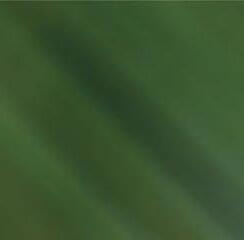









Spring 2024 81


Remembering Dennis (Denny) Roy Ballard

to enhance Missouri’s natural resources through state and national-level initiatives plus, he was their voice before the Missouri General Assembly and the Missouri Department of Conservation and Natural Resources.
The following is a partial list of the accolades, achievements, and recognition during his incredible life:
• Received the Missouri Bow Hunters Pauline Reed Award
• Co-writer for the Bowhunter Education Manual; “Today’s Bowhunter”
• Member of the Outdoor Writers Association
• 1973, Bowhunter Magazine; authored an article, “The Pod Fraud”, regarding the threat of the ‘Poisonous Pod Arrow.”

• 1993 Conservationist of the Year (Conservation Federation of Missouri)
• 1994 G. Andy Runge Award (Missouri Chapter, The Wildlife Society)

• 1996 Master Conservationist (Missouri Conservation Committee)
• 2005 Served as Chair of the North American Bowhunting Coalition
• 2007 Conservation Award, Pope and Young Club
• 2011 “Safari” - a one-man stage performance impersonating Dr. Saxton Pope on safari during the Pope and Young Club’s 50th-anniversary convention.
• 2013 Portrayed Art Young in a one-man stage performance during the Pope and Young Club’s bi-annual convention.

Among Dennis’s many contributions, none will be as lasting and impactful as Missouri’s ‘Share the Harvest Program’ which is credited for initiating. Share the Harvest is a hunter-led program designed to share surplus venison with Missourians in need. Governor Mel Carnahan, in 1993, signed this program into law. Annually, through this program, nearly 250,000 pounds of venison are distributed to the needy.
Dennis was a lifelong ambassador for wildlife conservation, archery, and the sport of bowhunting. His contributions will be impactful for many generations to come – he will indeed be missed!
Thanks to Dick Wood and Tyler Schwartze for providing information.



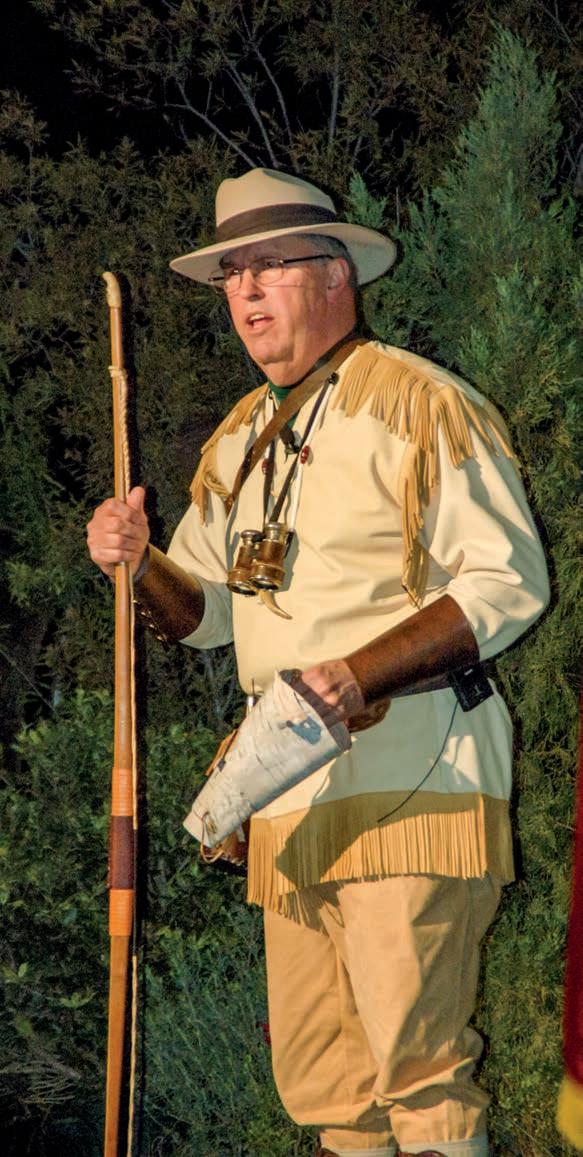
2024 Spring continued 82
2013, Dallas, The one-man stage performance impersonating Art Young on his famous Alaskan moose hunt. No one that was fortunate to see Denny’s show will ever forget the performance.



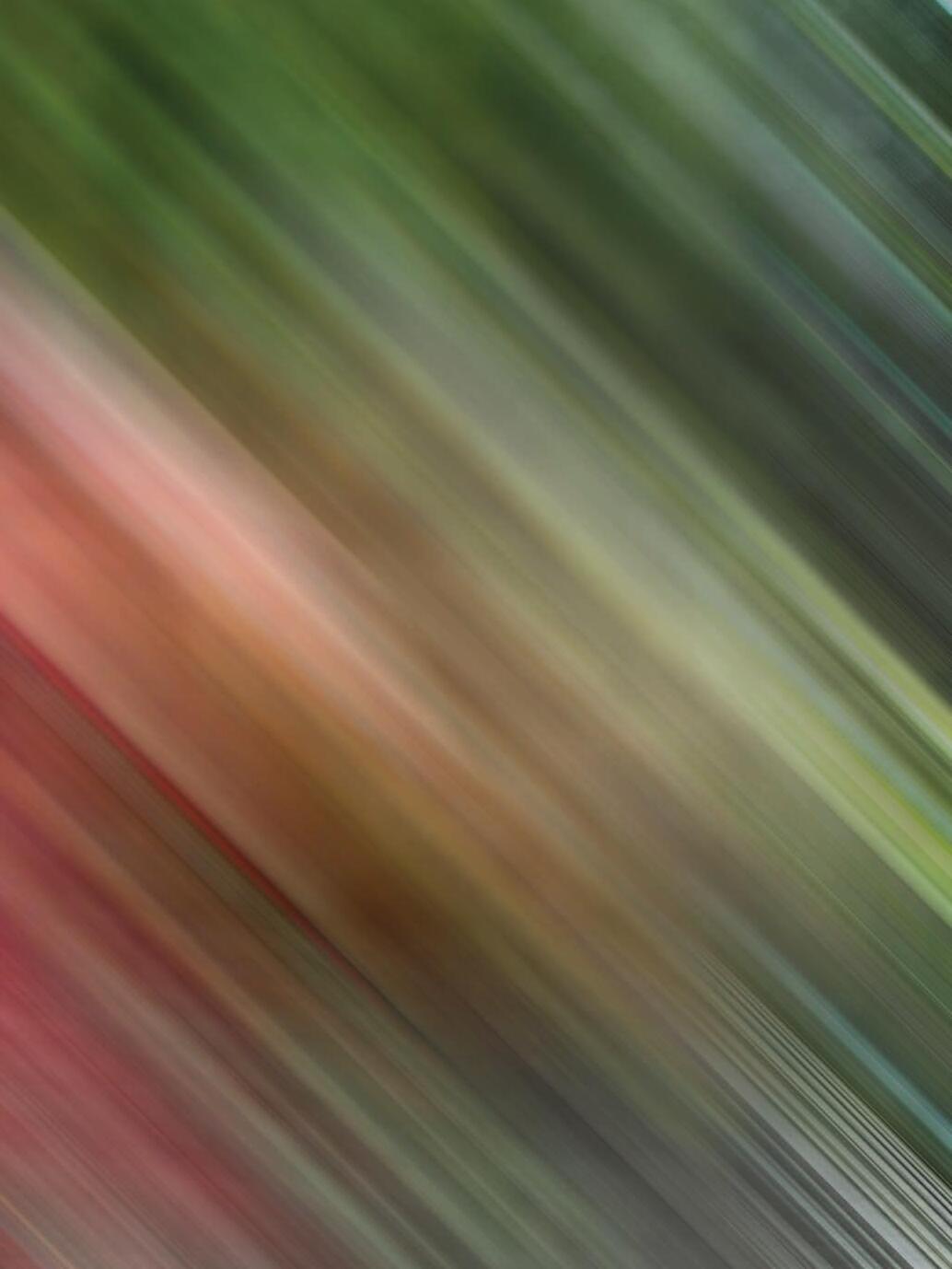
Save $300 Enter promo code: P&Y and save $300 on your next purchase! Visit us at bakcou.com
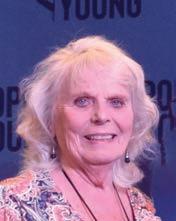
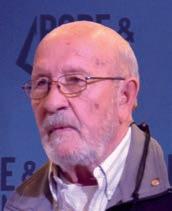

Youth Membership
By Carolyn & Stan Godfrey
Giving Back to a Sport We Love



As we look back on over 60 years of bowhunting, we realize how important the connections were with many people who offered us bits of knowledge. Early in our bowhunting careers, we were introduced to the Pope & Young Club, which launched our lifetime of bowhunting adventures, through Pope & Young Club, where we were able to rub shoulders with many of the “bowhunting heroes,” each offering something to our education. Through attending many Pope & Young Club Biennial Conventions when we became Official Measurers for Pope & Young, we have had the chance to interact with countless other bowhunters, both being mentored and mentoring others. Through scoring thousands of animals, we’ve met many interesting bowhunters and informed them of the benefits of Pope & Young Club membership. The Pope & Young Club has made the value of sharing our skills and knowledge with beginning hunters apparent to us.
It often seems that the most memorable and successful things we accomplish begin quite by accident. Such was our introduction to mentoring youth. It all began 26 years ago when our nephew Dan Evenson, then 12 years old,
2024 Spring
84
began spending his weekends at our farm in Buffalo County, Wisconsin. We would pick Dan up from school on Friday afternoon and make the 3 ½ hour drive up to our property near Arcadia. We spent many enjoyable summer evenings watching deer after long days of putting in food plots, putting up tree stands, and doing all sorts of fun things that come with owning and maintaining a piece of property. Dan was always eager to help out wherever needed, and it was exciting for us to watch him grow into a very accomplished bowhunter, a far better shot than we ever were, a Pope & Young Club Official Measurer, and a successful businessman. When Dan was 17, he came up to the farm over 26 times on weekends. We can’t take all the credit for Dan’s success; along the way, he had many other great mentors - his dad, Dale Evenson, Jim Horneck, Mike Traub, and Mark Beeler. Now, Dan is mentoring other youth on their pathway to adulthood and the joys of bowhunting.
For many years, Mike Traub, Carolyn, and I led a group of avid bowhunters to Ontario to hunt spring black bears. These were wonderful years that resulted in a lot of great stories and life-long friendships. One

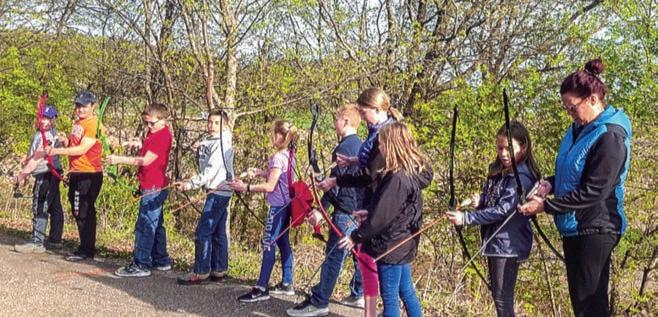
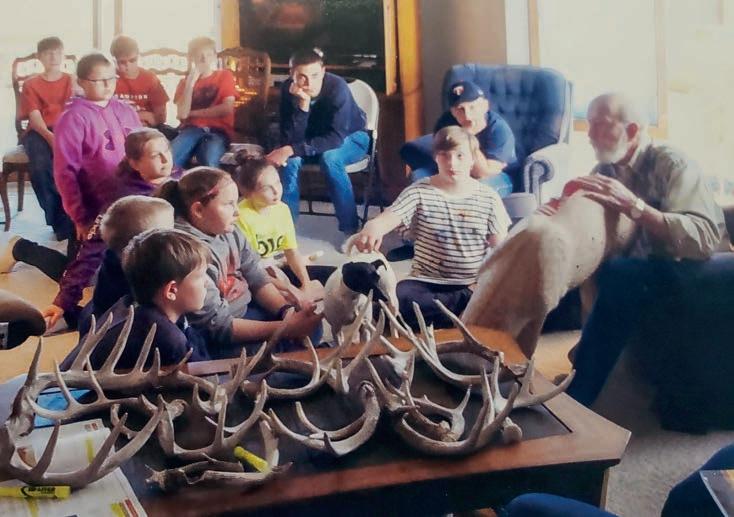

Spring 2024 85
Youth Membership
of the bear hunters on these trips was a young man named Kurt Mussey. Kurt would spend two weeks bear hunting with us for many years, followed by a week of fishing with his dad, Bob Mussey. We like to think our early days helping Kurt helped instill a desire in him to help others, as he is now a successful baseball coach and mentor to youth.
As we watched our society move away from a lifestyle that embraced outdoor sports and the many young people who weren’t exposed to the outdoor lifestyle, we began to look at various programs working to connect youth to the outdoors. Of course, Ray Howell’s Kicking Bear program is a great example of a successful youth mentoring program. With our desire to give more back to the sport that was so important to us, we began to volunteer in various mentoring opportunities. Eighteen years ago, we became involved in the Learn To Hunt program, sponsored by the Wisconsin Department of Natural Resources. Learn To Hunt allows youth ages 10 – 18 to hunt in a mentored hunting situation. The Department of Natural Resources provides the participating youth with no-cost hunting licenses; our group provides .243 caliber youth rifles, shells, orange vests, and hats for the participants to use. We also have a participating butcher, who at no charge, makes it possible for the successful hunters to take home their deer, cut, wrapped, and ready for the freezer. For any youth who harvests a buck on these hunting, there is also a taxidermist who will, at no charge to the youth, mount the antlers on an attractive plaque.
In preparation for the hunt, the participating youth must attend a four-hour orientation session held three weeks before the actual hunt. The orientation

consists of a session on hunter safety and hunting regulations given by a Wildlife Law Enforcement Officer, a session on the history of deer and deer hunting in Wisconsin, lunch, and a chance for the youth to shoot the rifles.
When working with youth, remember to celebrate even the small successes. Some of these young people may not have real solid home lives or may not have a lot of positive things in their lives.
Many of them haven’t had much exposure to the outdoors. Take time to show them how to identify a white oak tree or a robin from a blue jay, listen to the bird calls, and examine each shed antler’s differences. Let them know you notice and listen to them without making it a contrived reaction. When they spot a shed antler in the leaves, acknowledge their sharp eye! Our targets are about 3’ x 4’ and have a beautiful, artistic rendering
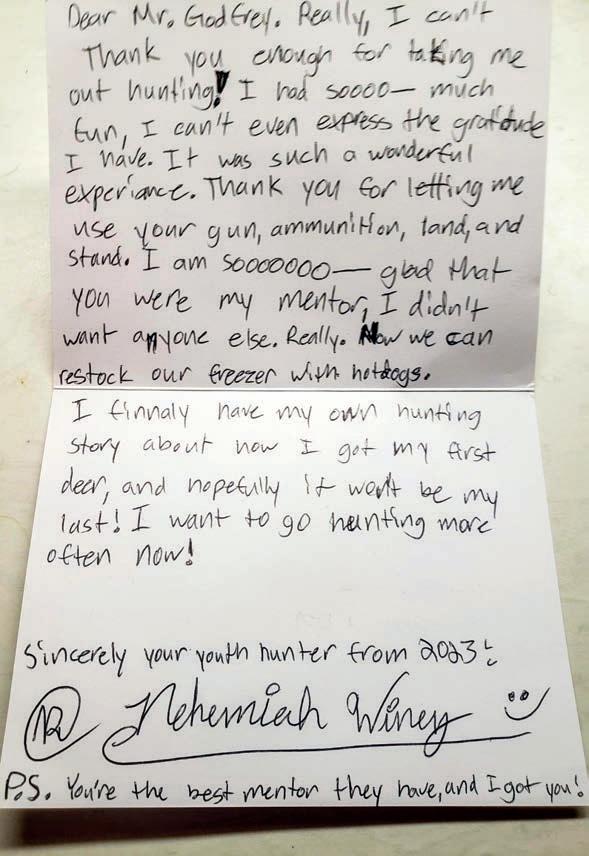
2024 Spring continued
86
of a deer on them. During the rifle shooting time, many participants were proud of their marksmanship and excited to take their targets home! Encourage their excitement and participation.
Since some of the participating youths travel as far as 200 miles to attend the orientation and later to hunt, we open our home to the group. At times, we’ve had as many as six participants in our home! This has been a wonderful time to get to know some of the youth and
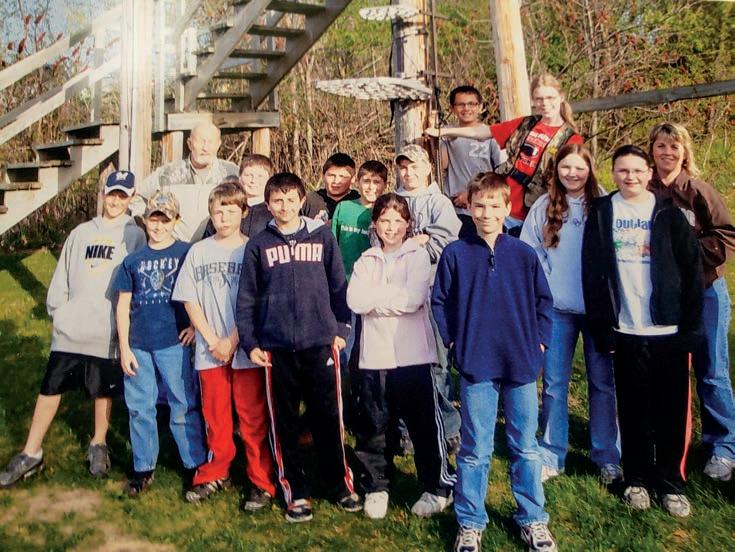
For many of us, hunting is a natural part of our lives. We enjoy spending time in the woods pursuing game, hanging out with family and friends and more importantly passing those unique skills on to the next generation. Unfortunately, there are thousands of youth and other interested people who would love to learn hunting skills, but literally have no opportunity. They have no support group, no family members or friends that can help them have that first hunting experience. That’s where First Hunt Foundation (FHF) comes in. We hope to provide qualified, background checked mentors so all who have a desire to learn about hunting can have that opportunity. We believe a mentor based program can reach 1,000’s each year across the nation. We hope and pray you choose to be a part of this important effort. The difference you will make in a new hunter’s life will create
memories for a lifetime and shore up the support for hunting for future generations. Happy Hunting!
Rick Brazell
• President admin@firsthuntfoundation.org (208) 917-9700
First Hunt Foundation 2965 Hwy., 162 Kamiah, ID 83536
•Formed as 501 (c)(3) April 2015
•Currently have 1,200 volunteer mentors operating in 48 states
•Have youth programs, programs for women/girls, veterans/1st responders & underserved communities (diversity)
•Completed almost 12,000 days of mentoring a hunting skill or actually hunting in 2022.
•FHF has no paid employees (including me) Total volunteer organization. People giving back.
•Do background checks on all mentors.
•Have liability insurance for our mentors at no cost to them.
For more info, Go to https://firsthuntfoundation.org/, click on https://firsthuntfoundation.org/ become-a-mentor/
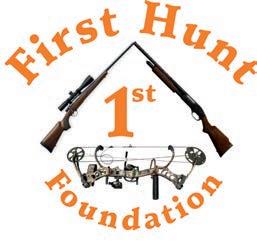

Spring 2024 87
their sponsors better, and we don’t know who enjoys it more: the kids or us!
Three weeks after orientation, the participating youth and their mentors returned to hunt on various private farms in the area that have generously offered access. After the Saturday hunt, we all meet up at the butcher shop where the deer are processed, stories are told, and the hungry hunters consume venison and hot dogs. Over the years, about 80% of the participating youth have harvested

deer; for example, 13 hunters harvested 11 deer last year! Over the years of participating in the Learn To Hunt program,
about 140 youth have enjoyed it, taking home about 100 tasty deer!
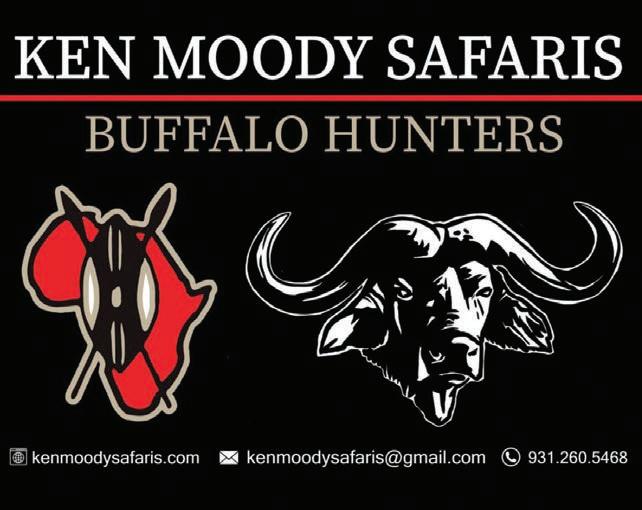

Besides the actual time in the field hunting, we also regularly teach hunter safety to about 50 beginning hunters and archery safety and hunting to about 35 prospective archers. The students usually come about an hour before class to practice archery – either with their bows or with bows we provide for those who don’t have one. After shooting practice, we split the group, with half going indoors to do the book study and the other half going into the woods to follow a mock blood trail (Karo syrup and red food color). We make the trail a little more exciting with deer hair, and maybe a couple of shed antlers sprinkled along the blood trail. We also teach them how to put up a blind or tree stand and properly use safety vests, lifelines, and general tree stand safety. We’ve found that most
2024 Spring continued
88
Youth Membership

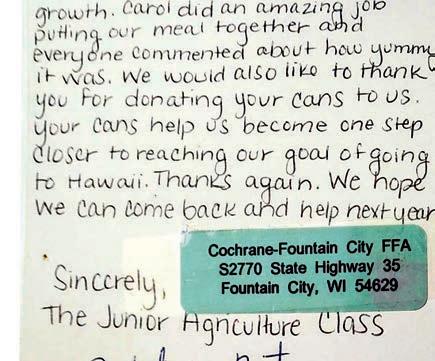
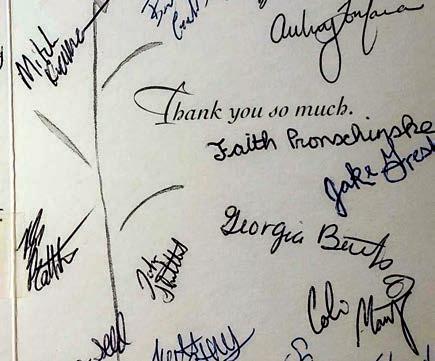







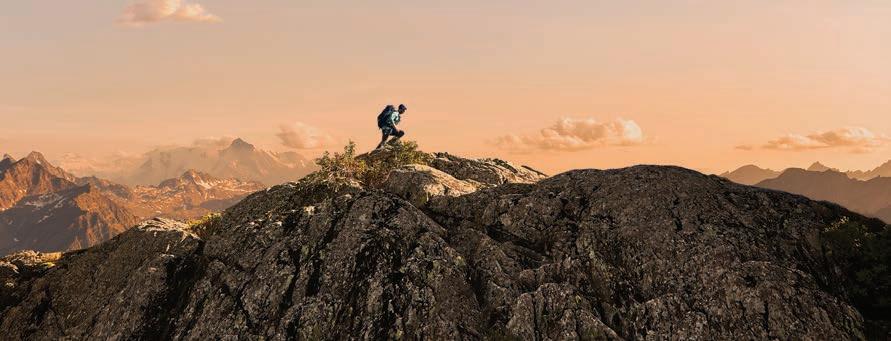























Spring 2024 89 MANAGE RISK FROM YOUR WRIST Stay connected and informed with inReach satellite communicators. Pair any Instinct GPS watch with an inReach device (sold separately; active satellite subscription required) to view and send messages, get weather alerts on your wrist and trigger an SOS to the GEOS 24/7 emergency response team. ©2020 Garmin Ltd. or its subsidiaries. Some jurisdictions regulate or prohibit the use of satellite communication devices. It is your responsibility to know and follow all applicable laws in the jurisdictions where the the satellite communication device is intended to be used. INREACH® AND INSTINCT®
Youth Membership
people learn far better outside, participating in these activities than sitting indoors watching the principles being demonstrated.
There are many active farms throughout our area of western Wisconsin, and Farm Safety Days is an effort to educate youth in many areas of safety around the farm. It is usually well attended, with about 50 to 60 kids participating in the tree stand safety training.
Volunteering is an integral part of our lives, and we feel it’s important to pass on what we have learned to future generations. We also participate in the Youth Day at our local sportsman’s club. The club donates bikes, bows, guns, fishing
tackle, and tree stand safety equipment to fortunate participants.
We’ve also had the pleasure of offering our home and property to first-time hunters who have harvested many deer and turkeys while hunting with us. We hope this is the spark that lights the fire of a lifetime of outdoor adventures in these youth. Sharing our property and its wildlife has expanded our opportunities to enjoy our property.
Many aspiring hunters have never had the opportunity to participate in the field. Without the many volunteers who help bring these youth into the outdoors, they may never know the sights, sounds, challenges, and adventures we
bowhunters experience. Hunting has been an enjoyable and essential part of our lives, leading us to many incredible places, wonderful adventures, and some extraordinary people. We enjoy helping introduce hundreds of young people to the outdoors and have met many wonderful people through our volunteer efforts. We hope that in sharing with others, we will instill in them a passion for becoming ethical hunters that would lead to a lifetime of enjoyment in the outdoors and that they could have similar experiences to what we enjoy and are such an important part of our lives.
Thank you, Dan and Ginger Brockman, for your help with the article.
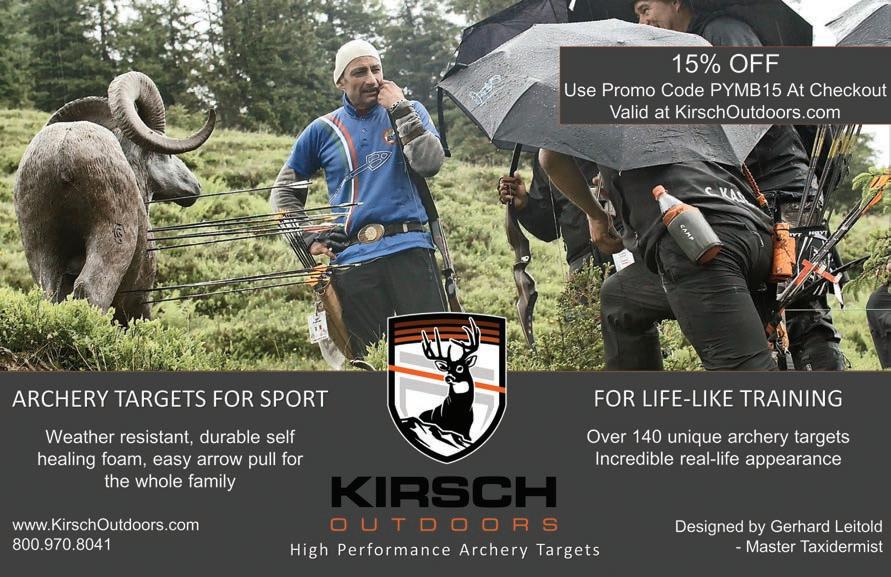

2024 Spring continued 90




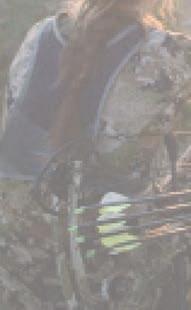
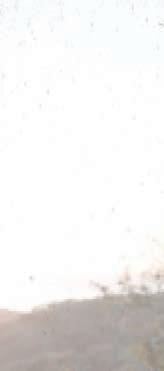
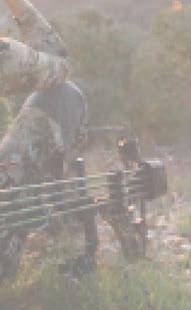

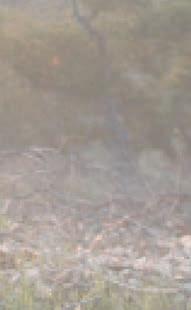
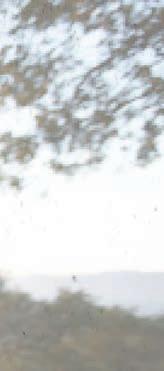


JOIN THE ALLIANCE SPORTSMENSALLIANCE.ORG HELP PROTECT YOUR HUNTING, FISHING AND TRAPPING RIGHTS CELEBRATING MORE THAN 42 YEARS OF PROTECTING YOUR PASSION FOR THE OUTDOORS BECOME A MEMBER TODAY BECOME A SUSTAINING MEMBER FOR ONLY $35 $35 - Sustaining $50 - Protecting $100 - Advancing $250 - Sponsor Name Address City State Zip Ph. ( ) Email Please charge my $ membership to my credit card. My check for $ is enclosed for a membership to the Sportsmen’s Alliance. (Please make checks payable to the Sportsmen’s Alliance. Mail to 801 Kingsmill Parkway, Columbus, Ohio 43229 Visa Mastercard Am. Ex. Discover Card No. CVC Exp. Signature PASSION FOR HUNTING, FISHING & TRAPPING PROTECTING YOUR SINCE 1978

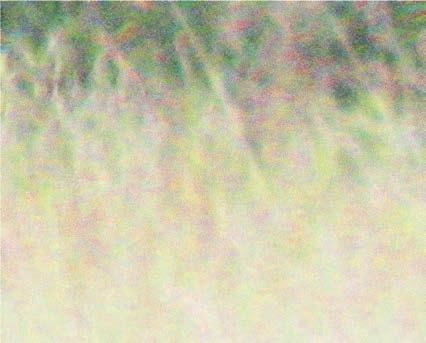
The Adventurous BowWoman
By Anna Whitehead
On the Edge of the Circle?
After getting home from the Dallas, Texas Convention and settling down somewhat, I visited with my outfitter, Stan Parkerson, of Denali Hunts, about hunt possibilities for 2014. Stan offered a two-on-1 for moose that did not include a bear if both my husband Marvin and I wanted to hunt. As much as Marvin wanted to take a moose himself, he told Stan it was my hunt to do with as I wished, so I opted to apply for both the bear and moose tags.
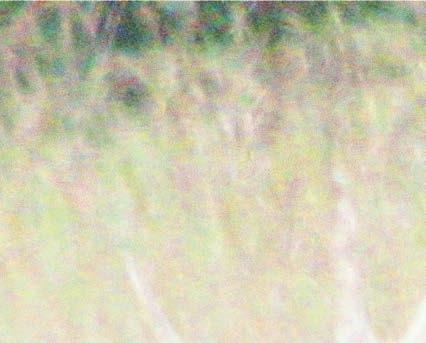

I got all my pertinent information to Stan for the application in late Nov., along with buying a 2014 license. By Stan filling out all the application forms, he would be sure that everything would be correct. The deadline for entering the drawing was Dec. 16, 2013, and then I could impatiently begin waiting

for the drawing results to be posted by Feb. 21, 2014.
During the Kansas Bowhunter Association’s 2014 convention, it seemed that everyone wanted to know when and if I was heading to Alaska. Fellow K.B.A. and P&Y member Matt Palmquist looked up the drawing results on his smartphone and told me I had been drawn for a Grizzly Bear AND a Moose in far northwest Alaska. This would be my second hunt with Stan and his crew, having taken a beautiful 18 10/16” black bear in 2000, which I stalked and shot at eight steps on the ground.

Marvin insisted that I have a new bow for this hunt, so we began looking at new bows, heavier arrows, and new, heavier broadheads. After going back and forth several
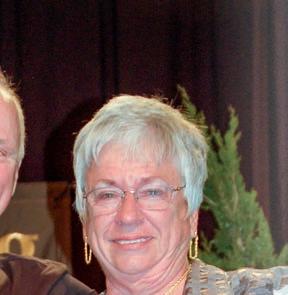


times, I finally ordered a new Matthews Heli-m, with a 26” draw and maxing out at 60 lbs. I then began getting used to the new bow and different release, gradually building up all the poundage I could handle. So as not to overdo it, I worked into the heavier weight by shooting 15 or 20 arrows every other evening. Every couple of weeks, Marvin would give the adjustment bolts a half-turn. The outfitter wanted me to pull at least fifty-five pounds and be accurate out to 35 yards.
At 9 am on September 6, 2014, I met up with Stan and one of his other clients at the Fairbanks Float Pond #2, where his Cessna 206 was tied up. The plan is to drop the other hunter off on the Hogatza River for a one-onone moose hunt with Bruce. Stan has campsites in several locations along this river that he has been hunting for some fifteen years. Stan said he flew over the camps yesterday and saw three good bulls.

After dropping the moose hunter off, we traveled to the Kobuk River, where my guide awaited. Michael Chadwick had a little 8-foot fold-up boat ready to haul my gear to the campsite. I wade upstream to camp, dodging salmon headed upstream to spawn.
Stan had been at the hunting site ten days earlier and reported lots of fish And lots of bear sign in the area. The hunting blind consists of a 6-foot by 11-foot blind, some 15 feet up in the trees on a metal platform overlooking the slough. The plan was to stay in the blind except to recover an animal. Shots should be 25 yards or less.


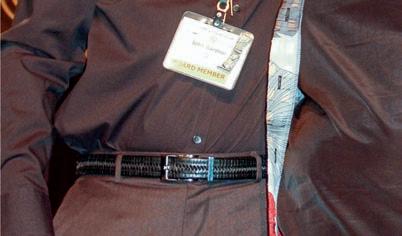

I got my equipment organized as much as possible in such a small space, visited with Michael, and got ready to hunt the next morning. The meals were basic: Mountain House, warmed on one of those little jet-boil stoves.
The temperatures were ideal for hunting

2024 Spring
92
John Gardner announced Anna as winner of the Club’s Conservation Raffle.
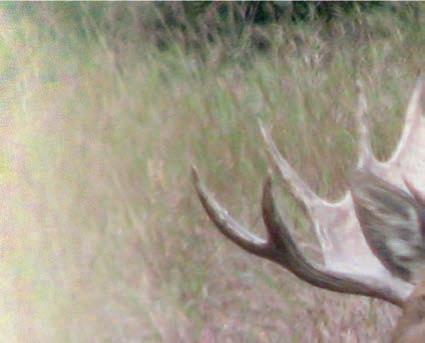
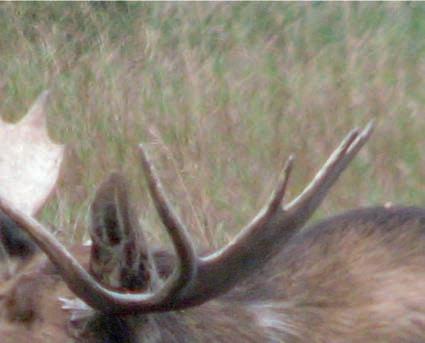
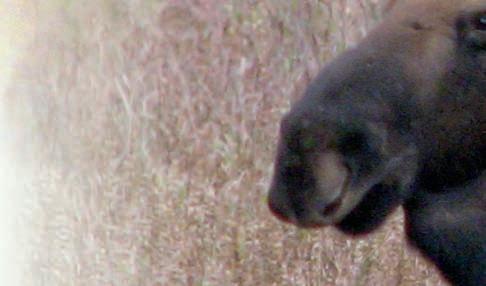
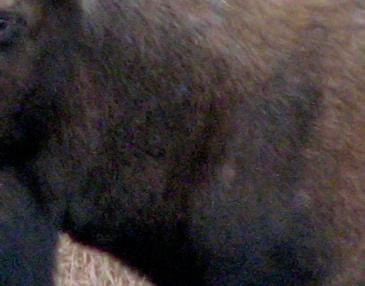


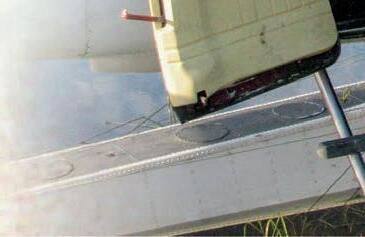

Give him a few more years.
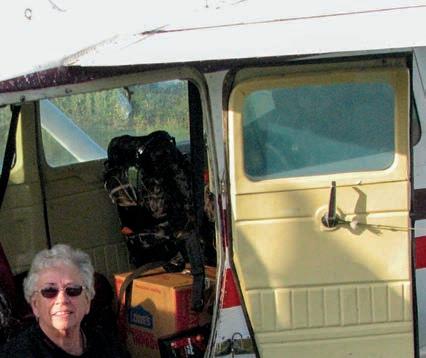


Ready to fly in.

Spring 2024 93
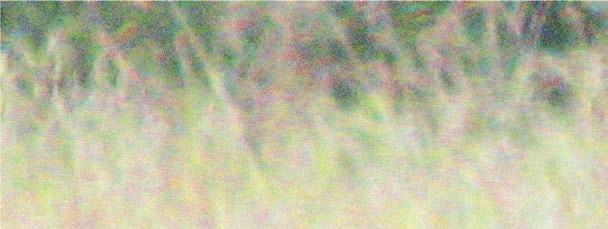
The Adventurous BowWoman
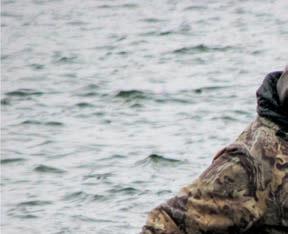
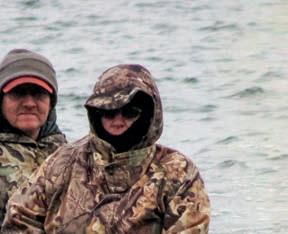
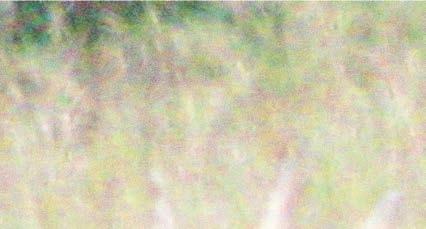

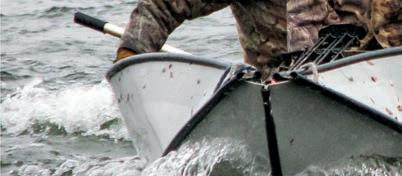
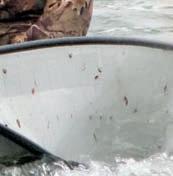



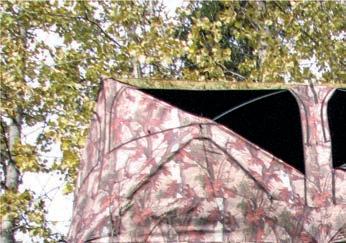

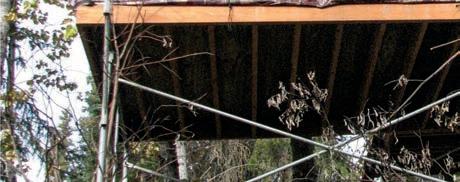

bear; freezing during the night and low 50’s daytime. Unfortunately, it warmed up after my arrival, a little too warm for good bear hunting conditions.
If you have never been on a stream with spawning fish, it’s amazing how much splashing and other noise these fish can make. It never stops, going on around the clock. With fish fighting, spawning, dying, and more coming in all the time, it was an unending calliope of sounds. We didn’t know it then, but this was the largest spawn in years. There were fish everywhere.
Sept. 7: Up before daylight for a breakfast of freeze-dried eggs. I can’t say that the breakfast was the best I ever had, so we stuck with oatmeal the rest of the week. However, the other meals were good.
At mid-morning, a large sow with two cubs of the year made their first appearance in the pool we were set up on. The sow would grab a fish, bite it, then let it go and move on to another. One of the cubs would grab the injured fish. I assume she was teaching the cubs how to fish. The smaller cub was good at scooping up and eating the wounded fish, while the larger one just wanted to play.
I wondered, at the time, if seeing the family unit was good or not. If the sow felt comfortable enough to have the cubs there, just how many boars were in the area? OR was this sow just one mean son of a gun?
My bow was always ready, as we took turns setting at the shooting window, watching up and down the stream. When not my turn to watch, I read through books I had packed just for that reason.




Sept. 8 was the Super moon/ Harvest moon. Maybe this will be a good omen for the hunter. But, no, this day was a repeat of day one, except that a good-sized black bear appeared at the head end of the pool, but it would not come on in any closer. The sow Grizzly and family had to be lying somewhere close by.

2024 Spring continued 94
Elevated blind along stream.
Cold ride across lake.
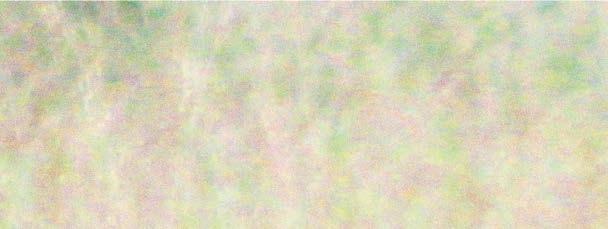
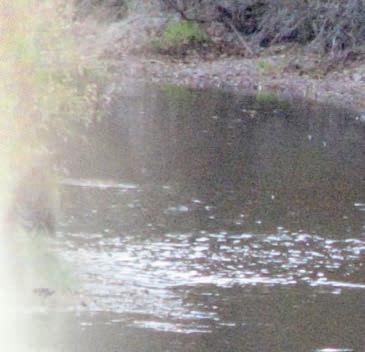

Sept. 9 was a repeat of day 2, except having a small bull moose make an appearance up the creek about 70 yards. After dark Michael called Stan to let him know how slow things were going. The two of them decided to give it one more day. If we weren’t successful, we would move to a different drainage to start moose hunting.
About 2:00 am, I woke to the sound of something churning down the middle of the creek. It turned out to be a grizzly bear, but it was long gone before I had a shot opportunity.
Sept. 10: shortly after daylight, the sow and two cubs made their daily appearance, playing and eating most of the morning. In the mid-afternoon, another moose crossed the stream, but my permit wasn’t valid in this unit.
By early afternoon, we began packing up the camp and getting ready to move out. While I packed things, Michael went downstream to retrieve the little boat. There were lots of fresh bear tracks along the shore of the main river and on top of the boat.
Perhaps we should have set up a blind and stayed longer, but Stan was already on his
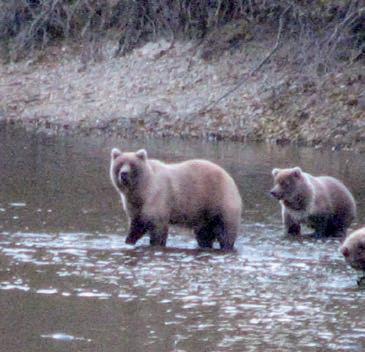
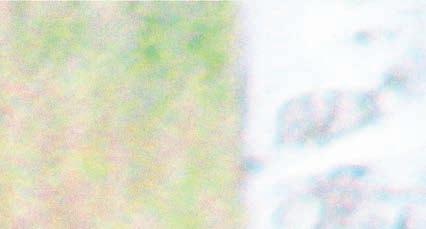
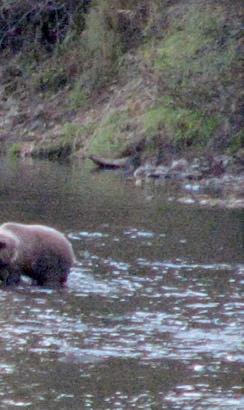
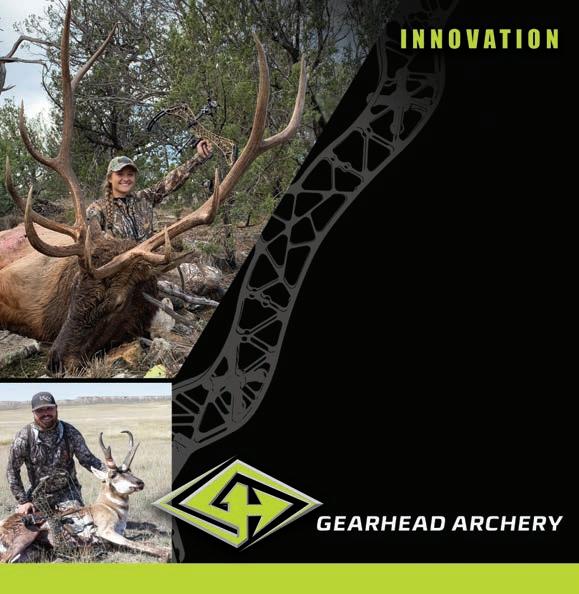



Spring 2024 95
GEARHEADARCHERY.COM Advantage Gearhead. 10%OFF
Grizzly family that took over pool.

The Adventurous BowWoman
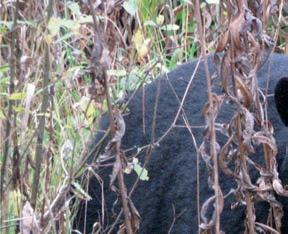
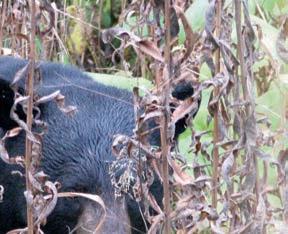


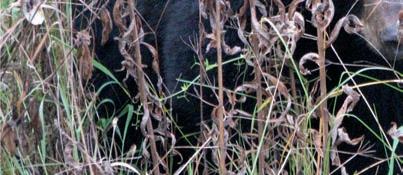
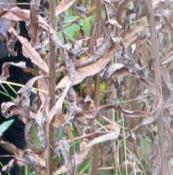






























way to pick us up.
We loaded all our gear onto the Cessna and hopped over a couple of ridges to where Marvin had been dropped off that morning to set up moose camp on the Hogatza River.
Sept. 11: After coffee and a good breakfast, we hiked out from camp through small spruce and cottonwoods across rolling moss that, with each step, my foot would sink in six inches. For this old woman used to walking on flat, hard ground, it was difficult to remember to pick my feet up several inches before trying to move them forward. Often, I would stub my toe and go down to one knee. It was a tough four-mile hike for this old woman. A good bull moose had been seen there a couple of days back, but he didn’t want to show himself this day.
















Sept. 12: A thirty-minute boat ride the next morning and a tough, very steep climb up a switchback trail found us on top of “The Bluff.” And by steep, I mean you could lean slightly and touch the ground with your inner side-hand in most places. From there, we could glass thousands of acres and call occasionally. If a potential bull was seen, we could then plan an ambush. Many of Stan’s clients have taken bulls in this area over the years.









So, our routine developed into one day floating the river, hiking in a short distance, and calling in various moose-looking spots. The next day would be climbing the bluff and glassing. Seeing fresh sign, occasionally hearing a bull grunt or rake the brush, but none of them would commit to coming in.
From the bluff, we made stalks a couple different times, but as we closed in, the bull would seem to lose interest and move away. I’m not sure if he had been whipped by something bigger or just was not interested. The weather was very warm for mid-September.
After six days of the river, we moved to a nearby lake. From our campsite, we could glass most of the shoreline and, depending
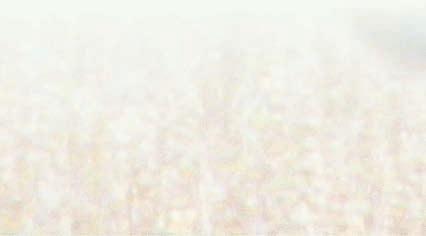
2024 Spring continued 96
ATA 30” | Brace 6.25” IBO 352 FPS | Weight 3.6
X30
ATA
32.5” | Brace 6.5” IBO 350 FPS | Weight 3.7 X33
X37 XPEDITIONARCHERY.COM | (844) 263-3665 XSERIES
ATA
37.5” | Brace 7.5” IBO 334 FPS | Weight 3.9
Black bear at 10 yards.


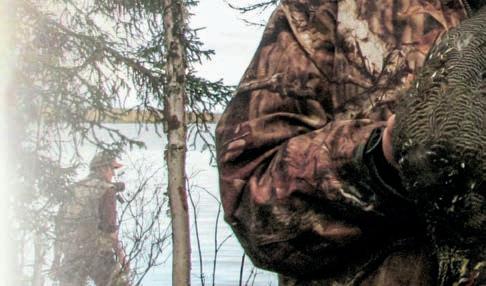
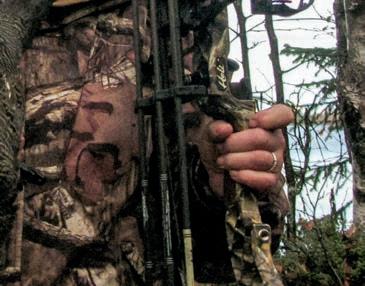

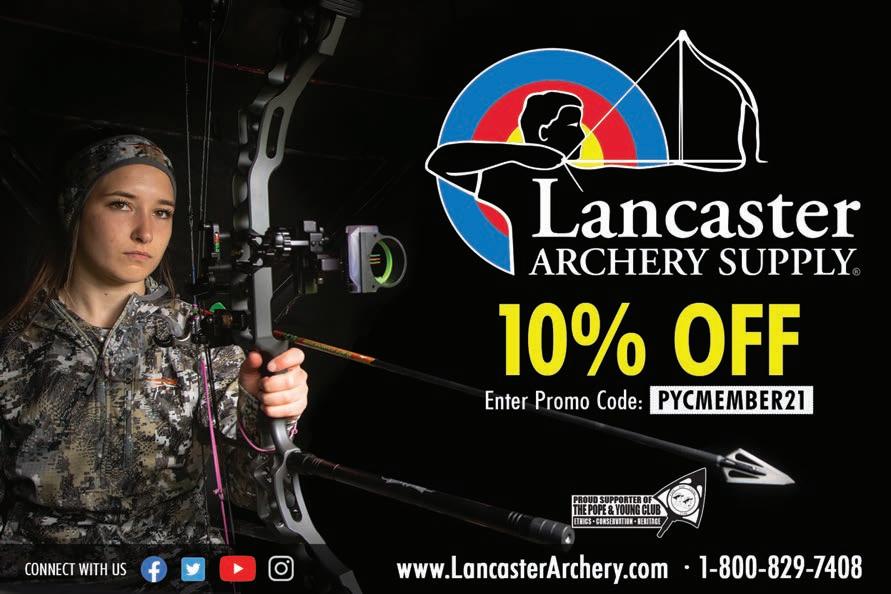



Spring 2024 97
Anna’s only kill on this trip.

The Adventurous BowWoman
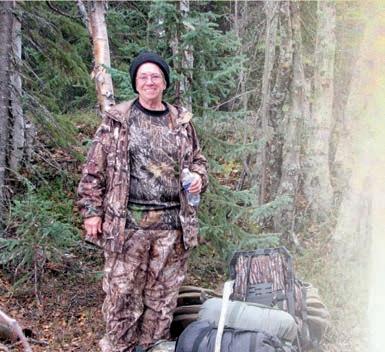









on wind direction, would motor out every morning and afternoon trying to call in a bull.
On the second lake day, after a mid-day rain, Jeff said, “Let’s go to the end of the rainbow and hunt the north end of the lake.”
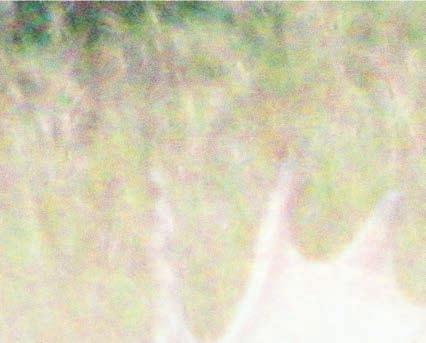
Jeff and I got in the little 10-foot fold-up boat, and motored across the lake. We set up, and began calling and raking. Marvin and Tyler were sitting at camp, unknown to us, watching a monster bull respond to our calls. From their vantage point, it looked like the bull walked right into our laps. However, the land had a couple of low swags and a tree line; the bull slipped by us without being seen.
On Sept. 22, the last morning of the hunt, Tyler and I went to the west side to hunt a
low ridge that ran parallel to the shore. We set up, began calling, and almost immediately got a response. The bull was slowly coming our way for the next thirty minutes as if he meant business. Then we heard this strange gargling, growling sound. After that, the bull’s grunts moved further away and faded completely. We could only assume that a cow convinced him to stay with her, and she led him off in another direction.
At the end of an exciting two weeks, Stan flew the both of us out. As I have always said, the adventure of the hunt and getting to see new country makes a hunt. Oh, sure, I would have loved to have tagged an animal or two, but it just wasn’t in the cards this time.
















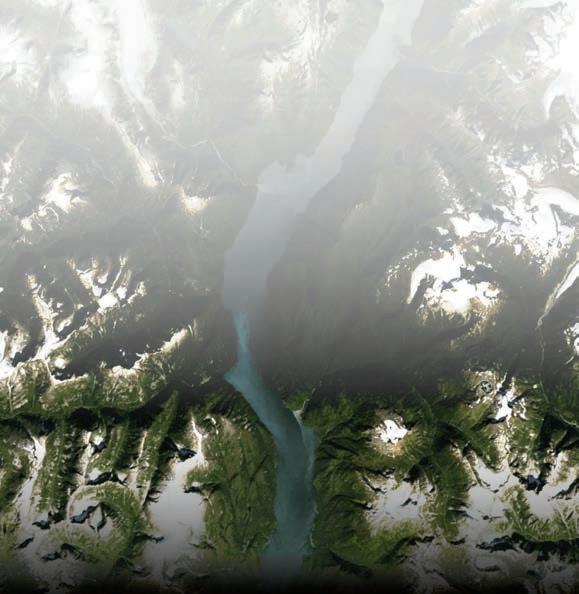
I want to thank the Pope & Young Club for giving me this hunting experience of a lifetime that I probably would never have taken otherwise had I not won the Club’s Conservation raffle at the 2013 Dallas Convention.











Also, I want to give a huge Thank You to Stan Parkerson and his crew of guides. They all went out of their way in an attempt to get me a shot at a moose and bear. It was an adventure that I will never forget. If I ever get another chance, it will be with Denali Hunts.
Last but not least, Thanks to all my K.B.A. family for the words of encouragement through this entire adventure; my hunt of a lifetime.
“I (Marvin) took these notes from the diary that Anna kept on this adventure. I encouraged her two or three times to finish writing it out so everyone could read it, but she was reluctant to submit it because she didn’t think she could write. Hopefully, she will forgive me for doing so now.
This adventure was in her thoughts and conversations until her untimely passing on August 14, 2018, after a massive heart attack. I have a small packet of her ashes in my hunting jacket pocket and intend to take her along on many more trips afield and scatter a few ashes along the way!”


2024 Spring continued
98
2020LIMITEDARROWWRAPS WWW.STATEWRAPS.COM
Ready for the long trip home.

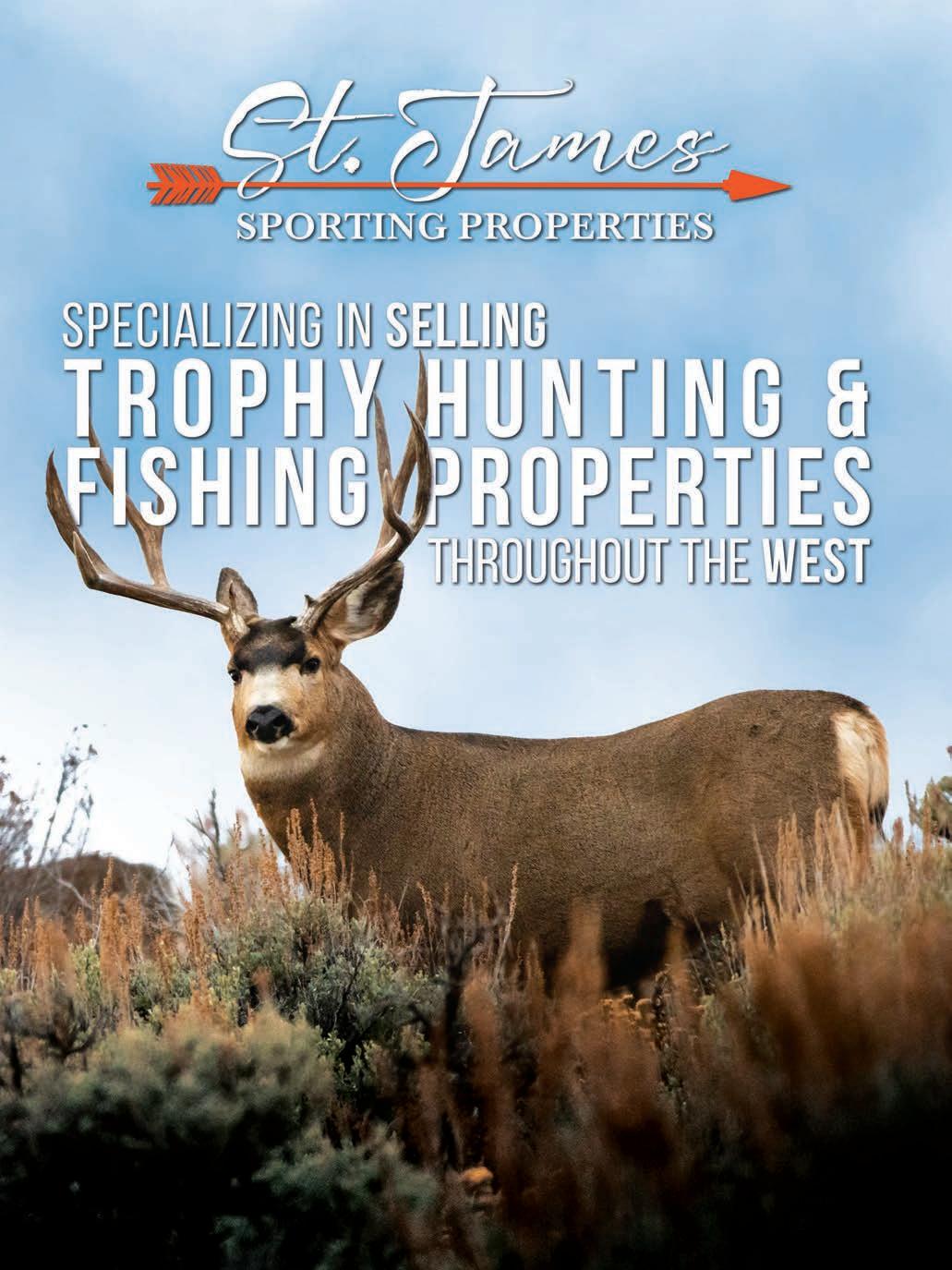


Colorado, Idaho, Kansas, Montana, Nebraska, New Mexico, Utah, & Wyoming LICENSED IN: WWW.SJSPORTINGPROPERTIES.COM 855-711-SJSP | INFO@SJSPORTINGPROPERTIES.COM | PO Box 700 Windsor, CO 80550 scan to learn more Photo taken on client’s property BY OWNER/BROKER, BLAYNE ST. JAMES
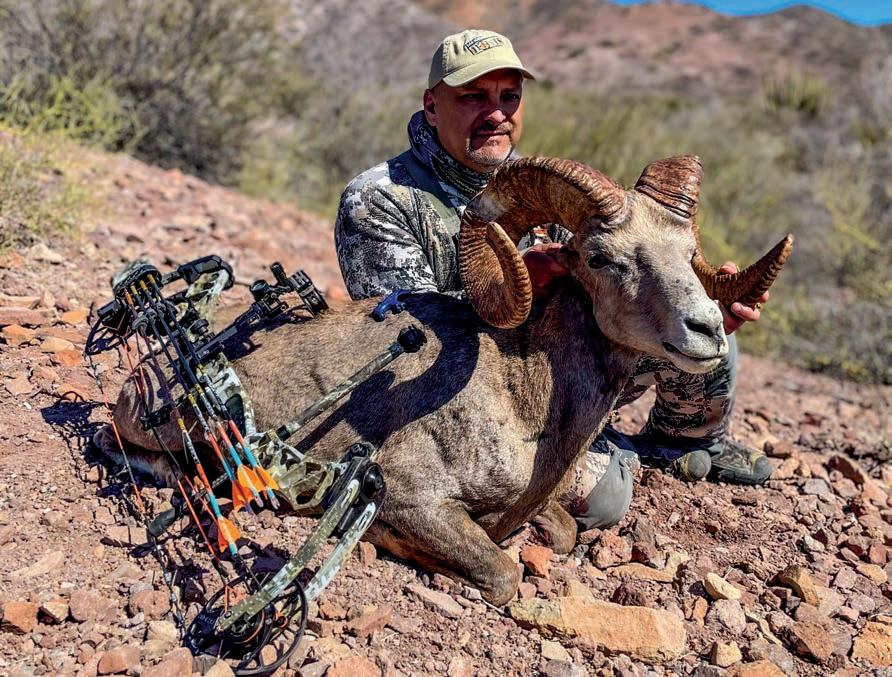
& Young Club, Inc.
Box 548
PERIODICAL POSTAGE PAID
Pope
PO
Chatfield, MN 55923



















































































































































































































































































































































































































































































































































































































 PerrinsRainyPassLodge
CrowCreekOutfitters
BearTrackOutfitters
Barela’sAlaskanOutfitters
JackCreekPreserve
PacoRiestraHunting
WebfootOutfitters
WizardLakeOutfitting
MotshwereSafari
Robert’sOutfitting PointerWingshooting
TrophyHuntingSpain
YukonBigGameOutfitters
SavageEncounters
RogueOutfitters MatlabasGameHunters
PerrinsRainyPassLodge
CrowCreekOutfitters
BearTrackOutfitters
Barela’sAlaskanOutfitters
JackCreekPreserve
PacoRiestraHunting
WebfootOutfitters
WizardLakeOutfitting
MotshwereSafari
Robert’sOutfitting PointerWingshooting
TrophyHuntingSpain
YukonBigGameOutfitters
SavageEncounters
RogueOutfitters MatlabasGameHunters













































































































































 By Stephen LePage
By Stephen LePage


































































































































































































































